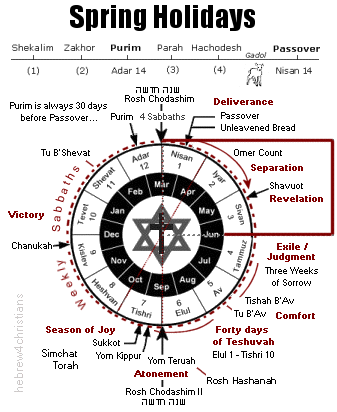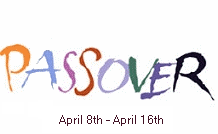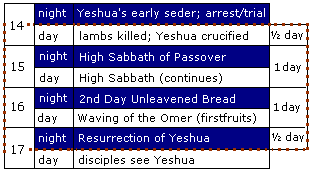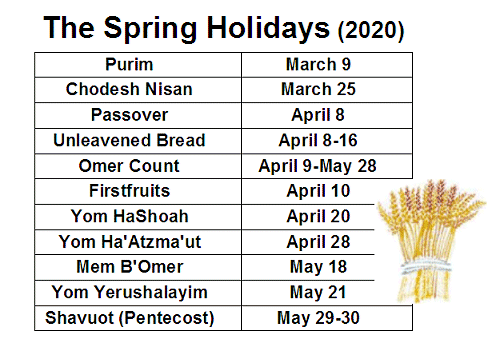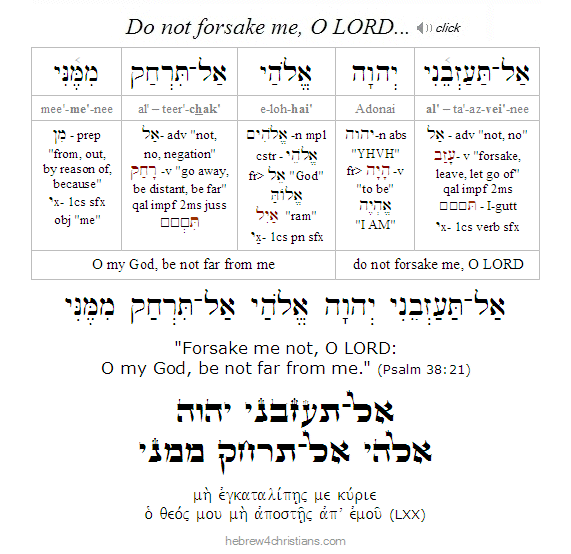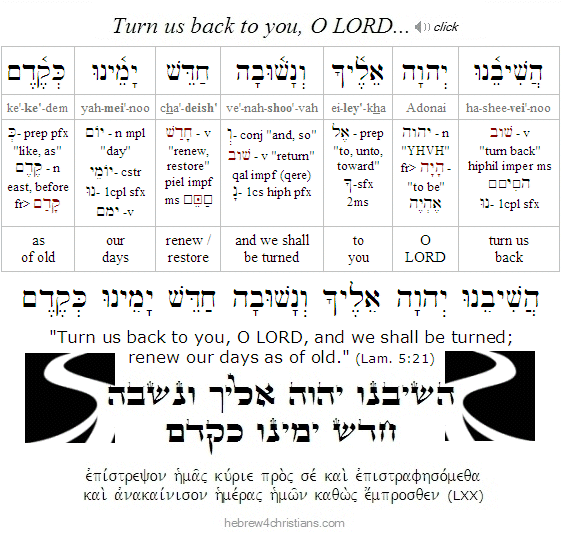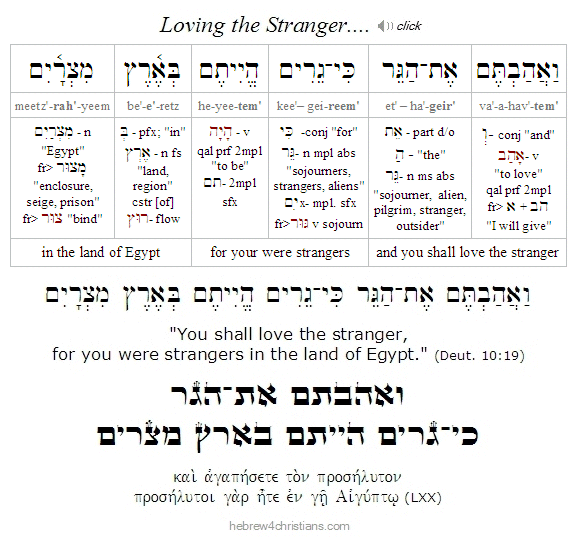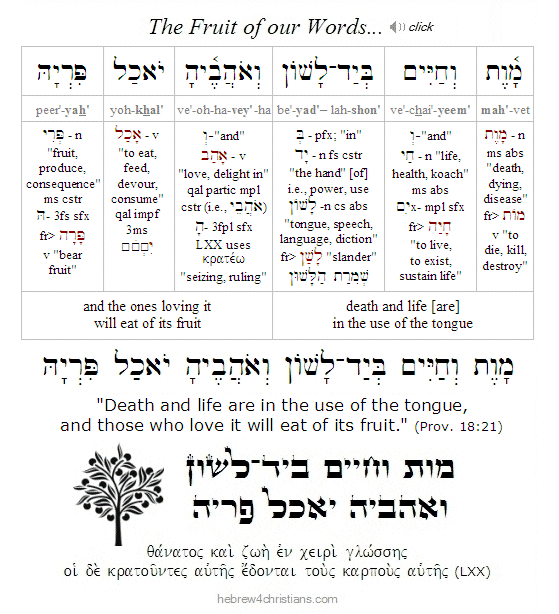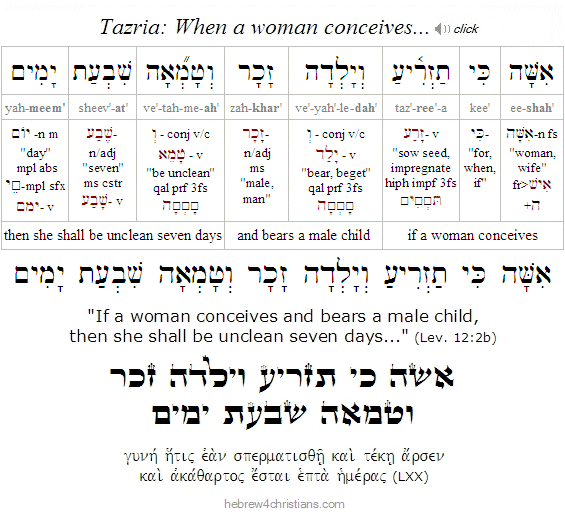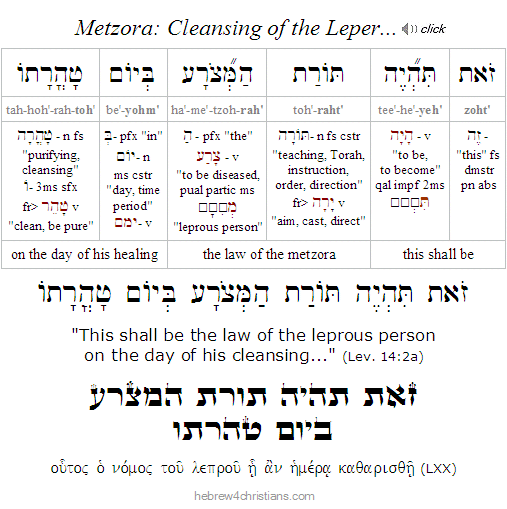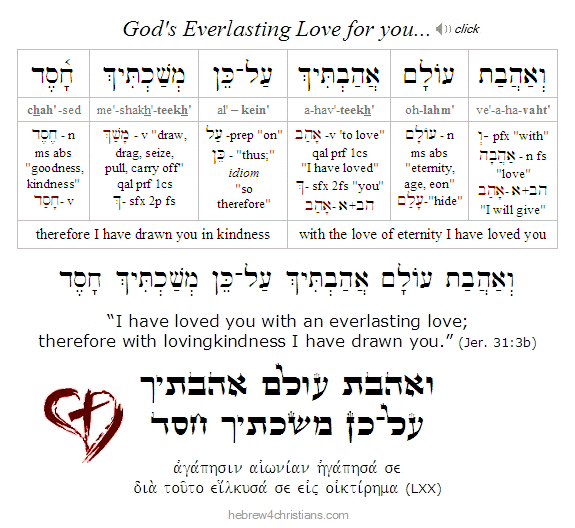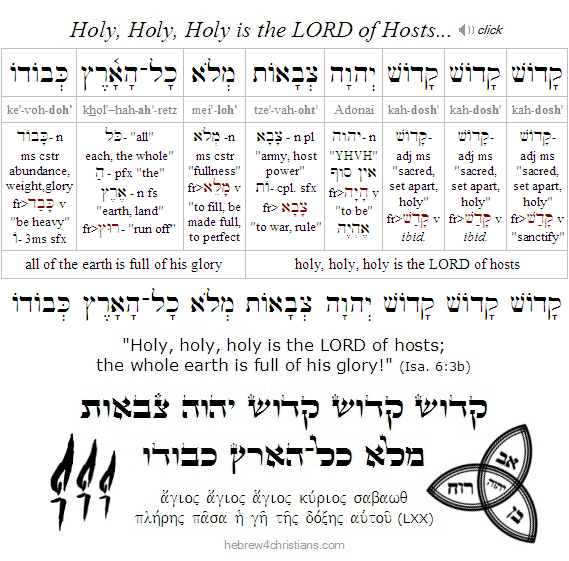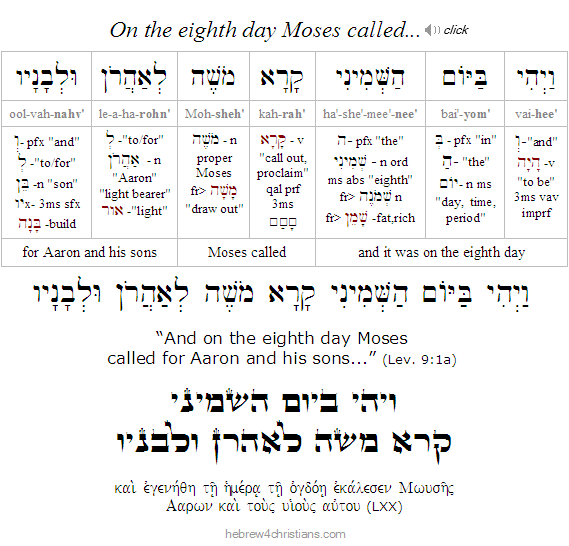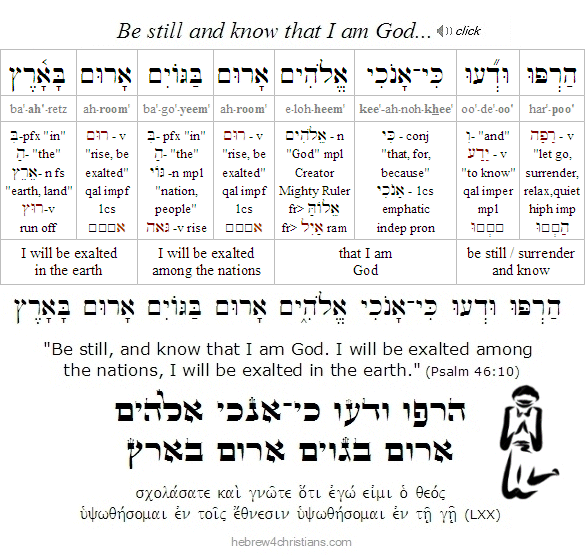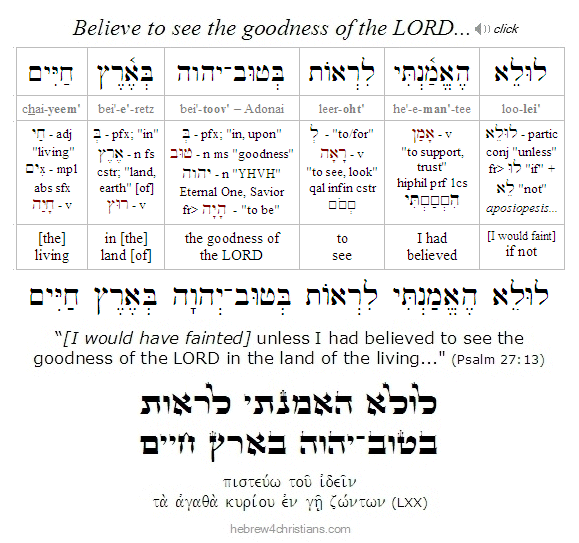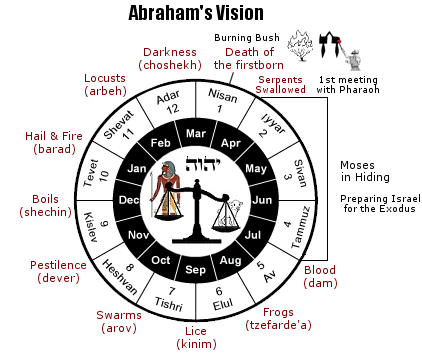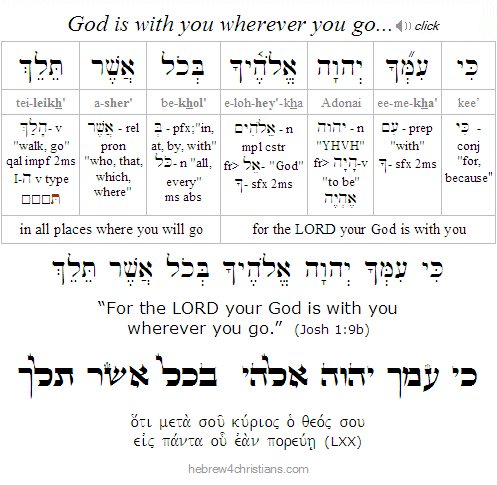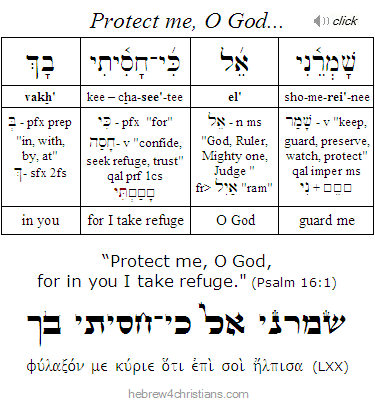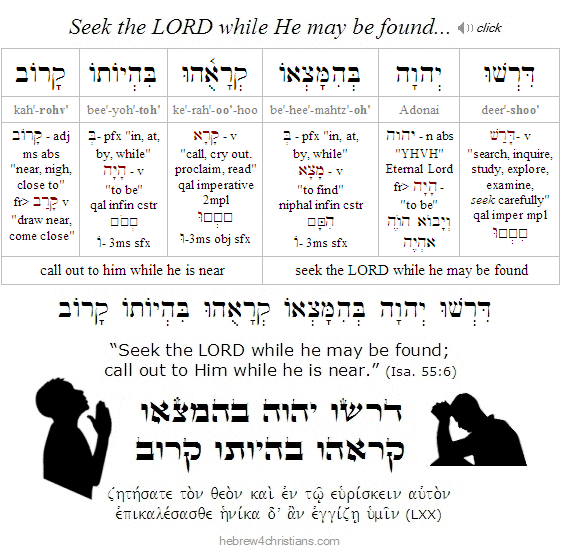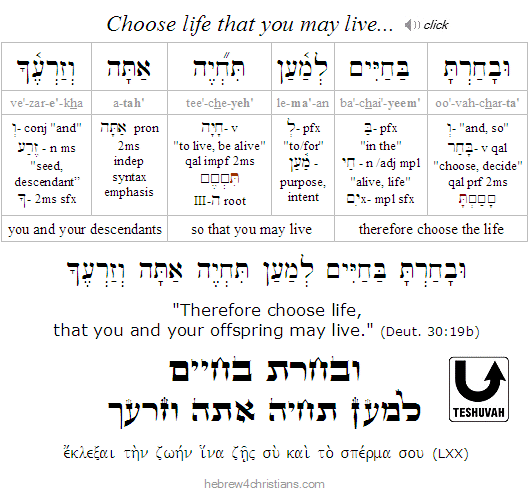|
Jewish Holiday Calendar
For April 2020 site updates, please scroll past this entry....
Spring is the start of the Biblical Year and is marked by two of the Shelosh Regalim (three annual pilgrimage festivals): Pesach (Passover) and Shavuot (Pentecost). The holiday of Shavuot is held seven weeks (or fifty days) following the morning after Pesach.
Dates for Passover 2020:
Passover Seder Guide
The Spring Holidays:
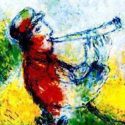
The spring holidays (חגי האביב) provide a portrait of the death, burial, and resurrection of the Messiah: Yeshua was crucified on erev Pesach (during the time of the sacrifice of the Passover lambs), buried during Chag Hamotzi (the festival of Unleavened Bread), and was resurrected from the dead on Yom Habikkurim (the Day of Firstfruits). Fifty days after Passover, on the climactic holiday of Shavuot (i.e., the feast of Pentecost), the Ruach HaKodesh (Holy Spirit) fell on the believers in fulfillment of the promise given by our Lord. Note that the giving of the Holy Spirit occurred precisely according to the calendar countdown given in the Torah (Lev. 23:15-16), and that it occurred after the resurrection of Yeshua -- just as our Messiah foretold (John 16:7; Acts 1:6-8, 2:1-4). This proves that the feasts of the LORD (מוֹעדי יהוה) were not abolished after the crucifixion. The meaning of the gospel is prefigured in the holidays given in Torah. See Luke 24:27, 24:44; John 5:46; Acts 26:22, etc.
Kindly note that in accordance with both Torah and Jewish traditon, the following holiday dates begin at sundown (ויהי־ערב ויהי־בקר; Gen. 1:5).
- Month of Nisan (Wed. March 25th [eve] - Thurs. April 23rd [day])
- Month of Iyyar (Thurs. April 23rd [eve] - Sat. May 23rd [day])
- Month of Sivan (Sat. May 23rd [eve] - Sun. June 21st [day])
Note: For more information, see the Calendar Pages....

Happy Passover, friends! (click photo for more)

April 2020 Updates
Note: If any page content appears to be missing, please refresh the page...
Peace and Affliction...

04.30.20 (Iyyar 6, 5780) When we undergo affliction, we often cannot discern its deeper purpose because the pain pulls us back to the present moment... The hidden blessing of affliction (ברכה סוֹדית) is only perceived later, in hindsight, where we discover a deeper longing for heaven has been instilled within our souls. Affliction helps us become more willing to let go of our attachments to this world; it teaches us to look upward, for the high country of heavenly consolation. The pleasures and expectations of this world distract our hearts from what we most need, and our troubles and afflictions therefore open us to the truth of God.
When we genuinely accept that God defines the truth for our lives, we realize that affliction is sovereignly given to us so that we can learn to abide in Him without constraint. Life is a "school" for the soul. God is the Teacher, we are "disciples" (i.e., תַּלְמִידִים, "learners"), and affliction is our divinely appointed tutor. Many of us are slow to learn, but God is patient with those whom He disciplines. The goal is to never lose sight of what's most important, which is God Himself. If you find yourself in a place of resistance, then you must decide whether or not you will trust the Teacher. The key lies in surrendering to God's will by submitting to His rule over all things. Yielding to God's will is the path of serenity and inner peace.
 |
 |
Seeking What is Above...

04.30.20 (Iyyar 6, 5780) "If then you have been raised with Messiah, seek the things that are above, where the Messiah is seated at the right hand of God (לִימִין הָאֱלהִים); focus your thoughts on the things above - not on things here on earth - for you have died, and your life has been hidden with Messiah in God" (Col. 3:1-3). Note that the verb translated "you have died" (ἀπεθάνετε) indicates that your death is a spiritual reality you must accept by faith. You don't "try to die" to the flesh, since that is the fool's errand of man's "religion." No, you trust that God has killed the power of sin and death on your behalf and imparted to you a new kind of life power (John 1:12; Eph 2:5). Because you partake of an entirely greater dimension of reality, namely, the spiritual reality hidden from the vanity of this age, your life is likewise hidden from this world (Col. 3:4). Therefore we are instructed to consciously focus our thoughts (φρονέω) on the hidden reality of God rather than on the superficial and temporal world that is passing away: "For we are looking not to the things that are seen but to the things that are unseen. For the things that are seen are transient (i.e., "just for a season," καιρός), but the things that are unseen are eternal" (2 Cor. 4:18).
Just as you must trust and accept that Yeshua was crucified for you, identifying with you, taking your place in judgment, exchanging his life for your own, so you must trust and accept that you have been crucified with him, and that your old life was taken away and replaced with a new, indestructible nature. In other words, a union is created where his "for me" is answered by my "with him." Χριστῷ συνεσταύρωμαι– "I already have been crucified in Messiah" (Gal. 2:20). Indeed the two go together: to trust in the finished work of Messiah for you is to trust in his finished work within you... When he died on the cross for you, which sins didn't he bear on your behalf? which remedy did he leave unfulfilled?
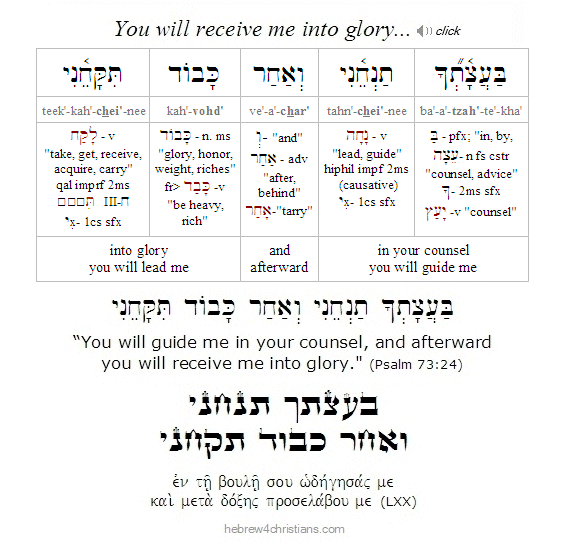 |
 |
Ephemera and Substance (גם זה יעבור)
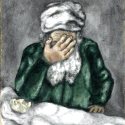
04.30.20 (Iyyar 6, 5780) When Abraham sought a place to bury his wife Sarah, he said to the Hittites chieftains: "I am a stranger and sojourner among you..." (Gen. 23:4). The righteous invariably feel like strangers to this world, since they are only passing through, and their focus is on the invisible "city that has foundations, whose designer and builder is God" (Heb. 11:10). Likewise they are as sojourners, not at home in this world, because their faith sees through the vanity and deceit of the present world, and therefore they regard themselves as on a journey to the place of truth and holiness where God abides. The wicked, on the other hand, regard life in this world as all that exists, and therefore they "absolutize" the moment and forfeit the blessing of the eternal (Matt. 16:26). Abraham regarded himself as a "stranger and sojourner" (גֵּר־וְתוֹשָׁב) because the people of his world considered themselves as "owners" and "permanent residents" who sought their inheritance in the here and now. Abraham was a "resident" of someplace higher, however, and understood this world to be a corridor to the next. The sages comment on this paradox: God says to man, 'If you see yourself as a permanent resident in this world, then I will be a stranger to you; if, however, you see yourself as a stranger to this world, then I will be a Dwelling Place for you."
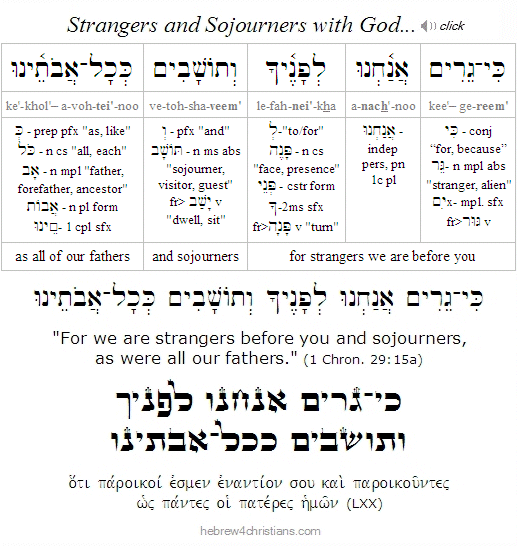 |
Like father Abraham we must learn to see beyond the temporal to behold the eternal; we must look past the shadows to see the substance. Faith calls us to see the unseen, to believe in the promised good that will come, and to keep hope alive... We have to turn our attention away from the rumors and visions of the present hour to see the supernal light which transcends the atmosphere of this world (2 Cor. 5:7). Faith separates us from the visible and temporal realm (i.e., chayei sha'ah: חיי שעה) before the invisible and eternal realm (i.e., chayei olam: חַיֵּי עוֹלָם); it hears (shema) the "yes" of the LORD in the midst of worldly dissipation and despair. Faith is the heartache, the groaning, and the yearning for undying love. "Whom have I in heaven but you? And there is nothing on earth that I desire besides you. My flesh and my heart may be consumed, but God is the strength of my heart and my portion forever" (Psalm 73:25-26). This world appears to the eye of faith a strange place, and here we are no more than sojourners as we look for our heavenly habitation whose builder and maker is God (Heb. 11:10; John 14:1-3). Our hearts yearn for the unseen good, healing beyond death to life, the realm of promise and blessing and unending grace.
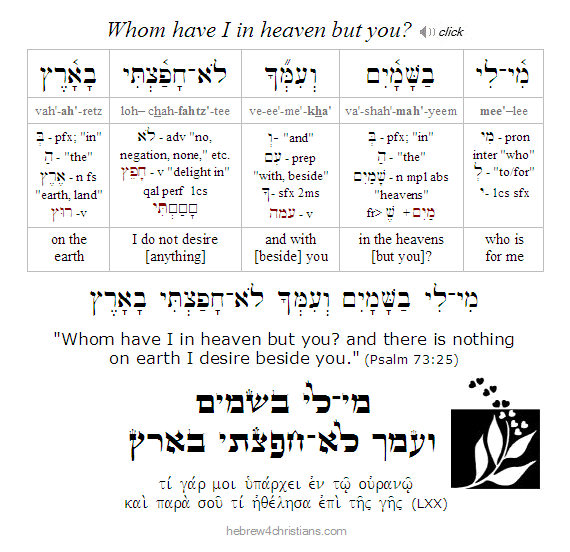 |
 |
Forsake me not, O LORD...
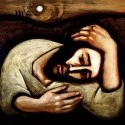
04.29.20 (Iyyar 5, 5780) Though it is true that God will never leave nor forsake us, he nevertheless allows trouble in our lives so that we will learn to call upon him and know his heart... For how else will we understand the truth of our great need for him, and how else his great provision? "Blessed are the poor in spirit," describes the poignant awareness of our inner poverty, our bankruptcy of heart, the destitution of our condition (Matt. 5:3). We cry inwardly, "Forsake me not, O LORD: O my God, be not far from me" (Psalm 38:21) because we realize our need for deliverance from ourselves; we understand that we cannot take a step in his way apart from his upholding. "Hold thou me up, and I shall be safe: and I will have respect unto thy statutes continually" (Psalm 119:117). "Do not forsake me, O LORD, is the mantra in our darkness, the antiphon of God's promised Presence; it is the cry of the heart that knows that only God can get us through the next moment and its temptation to despair. "Do not forsake me, O LORD, lest I be swallowed up by my pain, my fear, my sadness, my anguish of heart; do not forsake me, for I am nothing but the anguish of the moment, the sorrow of loneliness, the fear of my own heart as I tremble before you in my desperation...
O LORD, You came to heal the sick; you spoke life to those who are without strength or remedy; you came to seek the lost, to find those who are without a place or sense of belonging in this world. O Lord, you know that without you I can do nothing; you know that I weak, poor, and needy; my path is perilous and I have no hope apart from you. Be not far from me; do not leave me to my own devices nor the counsel of my own soul. Save me, O God, for the glory of your Name; be magnified in your heart of love and faithfulness. Amen.
 |
Prophetic Significance of Israel...
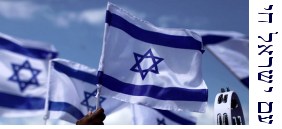
[ The following is related to Yom HaAtzma'ut (יום העצמאות) - Israel's Independence Day - which begins at sundown this evening. Happy 72nd Birthday, Israel! ]
04.29.20 (Iyyar 5, 5780) Can a case be made that we among the "terminal generation" before the return of Yeshua? The Torah predicted that the "End of Days" would occur sometime after the return of the Jewish people from their worldwide dispersion back to the land of Israel (Deut. 30:1-3), and indeed the theme of exile and return is repeated in the prophets (Jer. 23:3; 32:37-38; Ezek. 37:21, etc.). Therefore it is surely extraordinary that Israel was reborn as a nation in their ancient homeland on May 14, 1948 (Iyyar 5, 5708), after nearly 2,000 years of exile... Moreover, the existence of the modern State of Israel is entirely consonant with New Testament prophecies regarding the advent of the Messiah, since Yeshua taught that the Jewish people would be in the land of Israel at the time of his second coming, and that the city of Jerusalem would be surrounded by enemies of the Jewish state (see Matt. 24-25; Mark 13, Luke 21). Furthermore, if we understand a "generation" to mean 70-80 years in duration (as stated in Psalm 90:10), then when Yeshua said, "this generation (ἡ γενεὰ αὕτη) shall not pass until all these things take place" (Matt. 24:34), he was referring to the generation that would originate with the restoration of the modern State of Israel, which further implies that Daniel's 70th Week (i.e., the Great Tribulation) could begin very soon. And while it is true that "no one knows the day or hour" of the "great day of the LORD" (יוֹם־יְהוָה הַגָּדוֹל), Yeshua faulted the scribes and the Pharisees for failing to discern "the signs of the times" (Matt. 16:3) and for missing the "time of their visitation" (Luke 19:44).
מִי־שָׁמַע כָּזאת
מִי רָאָה כָּאֵלֶּה
הֲיוּחַל אֶרֶץ בְּיוֹם אֶחָד
אִם־יִוָּלֵד גּוֹי פַּעַם אֶחָת
mee · sha·ma · ka·zot
mee · ra·ah · ka·ei'·leh
hai·yoo'··chal · e'·retz · be·yom · e·chad
eem · yee·va·led · goy · pa'·am · e·chat

"Who has heard such a thing?
Who has seen such things?
Shall a land be born in one day?
Shall a nation be brought forth in one moment?"
(Isa. 66:8)

Am Yisrael Chai! The people of Israel live! Like many other prophetic statements found in the Jewish Scriptures, this verse from the prophet Isaiah is "dual aspect," since it was both partially fulfilled when the Jewish people reestablished the State of Israel, but it will be entirely fulfilled at the outset of the Millennial Kingdom after the return of Messiah (see Isa. 66:7-16; Rom. 11:26). Meanwhile we behold the restoration of the "Fig Tree," and understand that the great harvest draws near, friends... May God help each one of us be awake, ready, with hearts full of steadfast faith (1 John 3:2-3; Titus 2:11-14; Matt. 24:32).
Regardless of how you may regard the prophetic events that herald the "end of the world," however, know this: Today might be your last in this world - your very own "Rosh Hashanah" when you will appear before the Judge and Creator of your life... Therefore should we live each day as if it were our last and pray that God will help us to serve Him in the truth.
Note: Let me preemptively add that while we may discern that the time is indeed short, I do not believe in "date setting" or predicting the return of the LORD, since that is חוכמה אטומה, "sealed wisdom" known only to the Father (see Matt. 24:36, Acts 1:7; 1 Thess. 5:2, etc.).
 |
Practical Holiness...
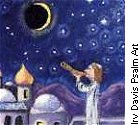
04.28.20 (Iyyar 4, 5780) Our Torah portion this week (i.e., parashat Kedoshim) reveals that the "appointed times" (i.e., mo'edim: מוֹעֲדִים) were given by God to help us turn away from the omnipresent urge within the human heart to embrace vanity: "Every one of you shall revere his mother and his father and guard (שָׁמַר) my Sabbaths (שַׁבְּתתַי)... Do not turn to worthlessness (i.e., אֱלִיל) or make for yourselves any molten gods" (Lev. 19:3-4). In other words, the Biblical holidays - including the weekly Shabbat, the monthly Rosh Chodesh, and so on - were intended to help us to sanctify ("set apart," "make holy") the times and seasons in order to remind us of God's Presence (Psalm 104:19). Therefore they are called mikra'ei kodesh (מִקְרָאֵי קדֶשׁ), "times in which holiness is proclaimed" (Lev. 23:2). The Torah's declaration that these days are holy implies that they are set apart for special activities, such as celebrating God as our Creator (Shabbat), our Redeemer (Passover), our Resurrection (Bikkurim/Firstfruits), our Law Giver (Shavuot/Pentecost), our King (Teruah/Rosh Hashanah), our High Priest (Yom Kippur/Day of Atonement), our Shelter (Sukkot/Tabernacles), and so on. In this connection it should be noted that it is a mistake to assume that the divine calendar was somehow abrogated with the cross of Yeshua, since all of the Jewish holidays center on Him, and indeed the advent of the Ruach Ha-Kodesh (Holy Spirit) occurred precisely after the prescribed 49 day countdown to Shavuot (see Acts 1:8; 2:1-4).
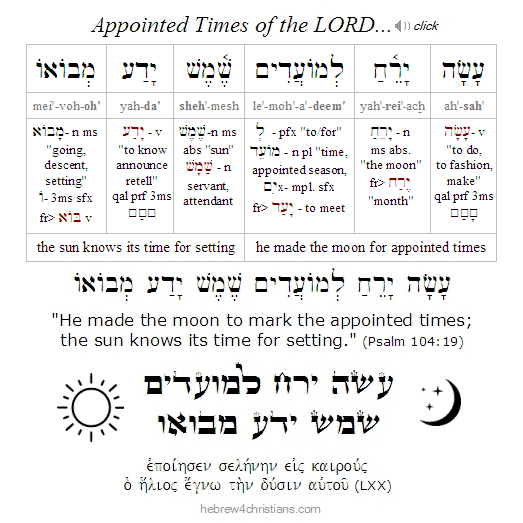 |
 |
Sensing the Sacred...

[ The following is related to our Torah reading this week, parashat Acharei Mot-Kedoshim... ]
04.28.20 (Iyyar 4, 5780) I've mentioned before that the Torah records God's first act of creation with the imperative utterance: "Let there be light" (i.e., yehi or: יְהִי אוֹר), and then goes on to say that "God separated (וַיַּבְדֵּל) the light from the darkness (Gen. 1:3-4). It is this "separation," or distinction, that is foundational to the concept of kedushah (קְדֻשָּׁה), or "holiness." Holiness is also expressed in the distinction between ordinary and sacred time: "God blessed the seventh day and made it holy" (יְקַדֵּשׁ) because on it God rested from all his work that he had done in creation" (Gen. 2:3). Therefore we are repeatedly told to "distinguish between the holy and the common, and between the unclean and the clean" (Lev. 10:10). Note that the word translated "distinguish" (וּלֲהַבְדִּיל) comes from the same verb used to describe how God separated the light from the darkness. In order to do this, we need understanding (i.e., binah: בִּינָה), or the ability to distinguish between (בֵּין) realms of reality. As it is written, "You shall be holy to me, for I the LORD am holy and I have separated you (וָאַבְדִּל) from other people that you should be mine" (Lev. 20:26).
וִהְיִיתֶם לִי קְדשִׁים כִּי קָדוֹשׁ אֲנִי יְהוָה
וָאַבְדִּל אֶתְכֶם מִן־הָעַמִּים לִהְיוֹת לִי
vee·yee·tem · lee · ke·do·sheem · kee · ka·dosh · a·nee · Adonai
va·av·deel · et·khem · meen-ha·a·meem · lee·he·yoht · lee

"You shall be holy to me, for I the LORD am holy
and I have separated you from other people to be mine."
(Lev. 20:26)

"I will lift up my eyes to the hills" (Psalm 121:1). As the Holy One (i.e., ha-kadosh: הַקָּדוֹשׁ), the LORD (יהוה) is utterly unique, distinct, sacred, and set apart as the only One of its kind. He alone is worthy of true worship and adoration, since He alone is utterly peerless, without rival, and stands in relation to the world as Creator, Redeemer, and Lord. To affirm the LORD is holy is to be conscious that He is utterly sacred - and that he calls you to be sacred, too....
The Goal of Holiness....
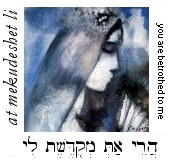
[ The following is related to our Torah reading this week, parashat Kedoshim.... ]
04.28.20 (Iyyar 4, 5780) "Be holy as I am holy" (Lev. 19:2). This doesn't mean wrapping yourself up in some protective cloak of religious rituals as much as it means accepting your own atonement: reconciling who you are with your past, finding healing and love, and walking in genuine hope... Holiness isn't as much "separation" from the profane as it is "consecration" to the sacred, and in that sense it is a kind of teshuvah, a turning of the heart back to reality.... Negatively put, "being holy" is turning away from fear, despair, and anger; positively put, it is embracing the worth and value of life, respecting the Divine Presence, and walking in the radiance of God's love. Hashivenu Adonai....
God's "Super Sign" of Israel...

[ The following is related to Yom HaAtzma'ut (יום העצמאות) - Israel's Independence Day... ]
04.27.20 (Iyyar 3, 5780) After the Jewish people had suffered for nearly 2,000 years of exile as clearly foretold by Moses (see Lev. 26:38, 44; Deut. 28:64-64) and the other Hebrew prophets (Isa. 43:5-6; Jer. 30:11; Joel 3:2; Ezek. 36:8-10; Hos. 9:1-10, etc.), Israel was miraculously reborn as a nation in their ancient homeland on May 14, 1948 (Iyyar 5, 5708). Today Jews across the world celebrate Iyyar 5 as Israeli Independence Day, which this year will be observed on Tuesday, April 28th.
Israel's Independence Day is called Yom Ha'atzma'ut (יום העצמאות), the "day of independence." In Hebrew, the word independence (atzma'ut) comes from atzmi - "my bones" (i.e., etzem: עֶצֶם), so the name itself alludes to God's glorious promise to revive the "dry bones" (עֲצָמוֹת) of Israel by bringing the Jewish people back from their long exile during the End of Days (Ezek. 37:1-6). הֲתִחְיֶינָה הָעֲצָמוֹת הָאֵלֶּה - "Son of man, can these bones live?"

But why should Christians care about ethnic Israel? After all, many Christian denominations advocate some version of "Replacement Theology" and regard the promises God made to the Jewish people as belonging exclusively to their church... The existence of the modern State of Israel therefore evokes little thanks to God from these groups, and some of their ranks even regard Israel's revived presence on the world stage as an embarrassment to their typically "liberal" theology. Hence we see the (remarkably bad) phenomena of so-called "Christian" church denominations that express anti-Israel sentiment, even asking their followers to divest investments in Israel on behalf of the "Palestinians," etc.
The title "Christ" refers to the anointed King of Israel, the Mashiach (מָשִׁיחַ)... To say "Jesus Christ" is therefore to affirm that Yeshua is none other than the Messiah, the rightful King of Israel (מֶלֶךְ יִשְׂרָאֵל). Followers of Jesus, the One born "King of the Jews" (Matt. 2:2), should therefore care deeply about Israel because the existence of Jewish people - and of the nation of Israel in particular - demonstrates that the LORD (יהוה) is completely faithful to the covenant promises He made to our patriarchs (e.g., Gen. 15:9-21). Indeed, the Scriptures teach that the Name of God is forever designated as אלהי אברהם אלהי יצחק ואלהי יעקב - "the God of Abraham, the God of Isaac, and the God of Jacob" (Exod. 3:15), just as it is also the "LORD God of Israel" (יְהוָה אֱלהֵי יִשְׂרָאֵל). The perpetuity of the Jewish people - despite so much satanic hatred over the millennia - is an awesome testimony of God's loyal love (Jer. 31:35-37). עַם יִשְׂרָאֵל חַי / am Yisrael chai: "The people of Israel live!" Israel is a sign of the "sure mercies of David" (חַסְדֵי דָוִד הַנֶּאֱמָנִים) that are revealed in Yeshua, the Jewish Messiah (Isa. 55:1-6). Moreover, the New Covenant itself, as foretold by the prophet Jeremiah, explicitly promises the perpetuity of the Jewish people throughout the ages:
Behold, the days are coming, declares the LORD (יהוה), when I will make a new covenant (בְּרִית חֲדָשָׁה) with the house of Israel and the house of Judah, not like the covenant that I made with their fathers on the day when I took them by the hand to bring them out of the land of Egypt, my covenant that they broke, though I was their husband, declares the LORD. But this is the covenant that I will make with the house of Israel after those days, declares the LORD: I will put my Torah (תּוֹרָה) within them, and I will write it on their hearts. And I will be their God, and they shall be my people. And no longer shall each one teach his neighbor and each his brother, saying, 'Know the LORD,' for they shall all know me, from the least of them to the greatest, declares the LORD. For I will forgive their iniquity, and I will remember their sin no more."
Thus says the LORD, who gives the sun for light by day and the fixed order of the moon and the stars for light by night, who stirs up the sea so that its waves roar: יהוה צבאות שׁמו - the LORD of hosts is his Name: "If this fixed order departs from before me, declares the LORD, then shall the offspring of Israel (זֶרַע יִשְׂרָאֵל) cease from being a nation before me forever." Thus says the LORD: "If the heavens above can be measured, and the foundations of the earth below can be explored, then I will cast off all the offspring of Israel for all that they have done, declares the LORD.–Jer. 31:31-37
According to this theologically critical passage, if you saw the sun shine today or the stars in the night sky, you can be assured that God's promise to preserve the "offspring of Israel" -- (i.e., zera Yisrael: זֶרַע יִשְׂרָאֵל) -- is in effect. Indeed, in the world to come, heavenly Jerusalem will have the names of the twelve tribes of Israel engraved upon its gates (Rev. 21:12). Note well that this is the only occurrence in the entire Tanakh (i.e., "Old Testament") that the New Covenant (בְּרִית חֲדָשָׁה) is explicitly mentioned... It is a foundational passage of Scripture for those who claim to be followers of the Jewish Messiah.
The spiritual blessings Christians enjoy come from the root of God's covenants with Israel... Yeshua our Savior was born the King of the Jews, and he plainly said הַיְשׁוּעָה מֵאֵת הַיְּהוּדִים הִיא- "salvation is from the Jews" (Matt. 2:2; 27:11; John 4:22). The Apostle Paul clearly warned those who think the church has "replaced" Israel: "Remember it is not you who support the root, but the root that supports you" (Rom. 11:18). This doctrine is so foundational that it may be rightly said that how you think about Israel will affect every other area of your theology. Indeed, the nation of Israel is God's "super sign" that He is faithful to His covenant promises (Jer. 31:35-37). Celebrating Israel's existence acknowledges God's loyal love for us all! For more on this subject, see the article, "Is Christianity Anti-Jewish?"
In the holy Torah we read how God said to Moses, "Say this to the people of Israel, 'The LORD, the God of your fathers, the God of Abraham, the God of Isaac, and the God of Jacob (אלהי אברהם אלהי יצחק ואלהי יעקב), has sent me to you.' This is my name forever (זֶה־שְּׁמִי לְעלָם), and thus I am to be remembered throughout all generations'" (Exod. 3:15).
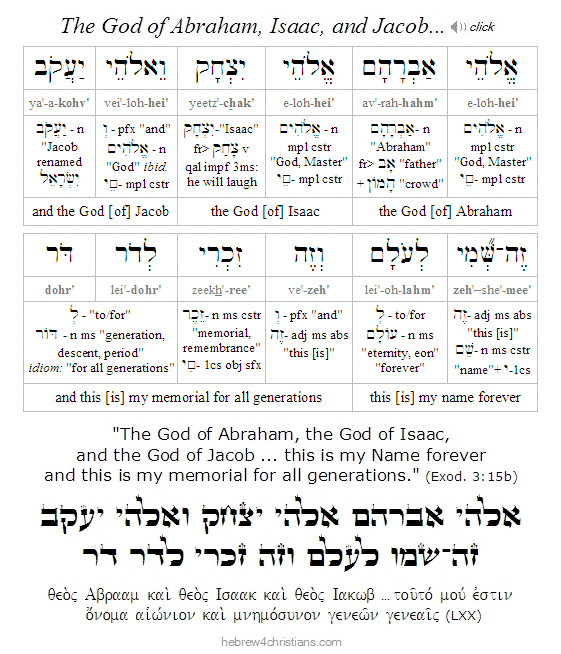 |
"Your Name, O LORD, endures forever, your renown, O LORD, throughout all ages" (Psalm 135:13). Therefore the prophet cries: "in the east give glory to the LORD; in the coastlands of the sea, give glory to the Name of the LORD, the God of Israel" (Isa. 24:15).
יְהוָה שִׁמְךָ לְעוֹלָם
יְהוָה זִכְרְךָ לְדר־וָדר
Adonai · sheem·kha · le'o·lahm
Adonai · zeekh·re·kha · le'dor-va·dor

"Your Name, O LORD, endures forever,
your renown, O LORD, throughout all ages"
(Psalm 135:13)


Loving the Stranger...
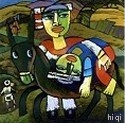
[ The following is related to our Torah reading this week, parashat Acharei Mot-Kedoshim... ]
04.27.20 (Iyyar 3, 5780) "You shall love the stranger as yourself" (Lev. 19:34). This mitzvah (commandment) applies not only to someone whom we regard as an "outsider," but more radically to the "stranger within ourselves," that is, to those aspects of ourselves we censor, deny, or reject. Like the prodigal son, we have to "come to ourselves" to return home (Luke 15:17) - believing that we are somehow redeemable, yet we will be unable to know how we are unconditionally loved until we venture complete disclosure. That is the great risk of trusting in God's love for your soul: You must accept that you are accepted despite your own unacceptability... Those parts of ourselves that we "hide" need to be brought to the light, atoned for, healed, and reconciled. If we don't love and accept ourselves, then how can we hope to love and accept others?
Deliverance from Ourselves...

04.27.20 (Iyyar 3, 5780) We all struggle with sin in our lives, and each of us needs deliverance from various attachments and fears that keep us from the deeper life... The problem is within ourselves, that is, the contradiction of heart we experience in our double-mindedness, our ambivalence, and our unbelief (Jer. 17:9). We may recite the Shema every day and say that we love God with all our being, but in the ordinary moments of daily life we are drawn to other concerns, alien affections, other "gods." Indeed, whatever matters most to us, whatever consumes our attention, time, resources, and our interest, is something we "worship," that is, something we esteem as worthy and valuable...
People necessarily value things, and therefore every person alive is a "worshiper" (i.e., a person who finds "worth" in something). This applies equally to a devout atheist or pious skeptic as much as it does a deeply religious person... The question that matters, however, is what is your ultimate concern? What do you really want? Only when we begin to understand what draws and attracts us can we begin to discern what we really need. Therefore we must first acknowledge our false worship, our radical selfishness, and our sundry attachments in order to be set free. We must confess the truth that we are slaves.
Pride blinds us to the truth of our sickness of heart, persuading us to deny our problems, to cover them up, and to try harder and harder to "control" ourselves. This is a spiritual dead-end, a vicious circle, the "law of sin and death." We are set free, however, when we die to ourselves, that is, when we surrender to the love of God and receive the miracle of promised deliverance. Since we are powerless to change ourselves, to reform our lower nature, and to be healed by our own best efforts, we must abandon our "religion" and rely entirely upon the God for the power to heal. This is an ongoing venture: We die daily; we take up the cross daily, we walk with a limp from our inner struggle, and we cling to God alone show us the way and to guide our steps. Beloved, we have been crucified with Messiah and the old nature has lost its power over us; we are alive by the miracle of God's power. "If we live by the Spirit, let us also walk in the Spirit" (Gal. 5:25).
לא בחיל ולא בכח
כי אם־ברוחי
אמר יהוה צבאות
lo · ve·cha'·yeel · ve·lo · ve·kho'·ach
kee · eem-be·roo·chee
a·mar · Adonai · tze·va·oht

"Not by might, nor by power,
but by my Spirit,
says the LORD of hosts."
(Zech. 4:6)

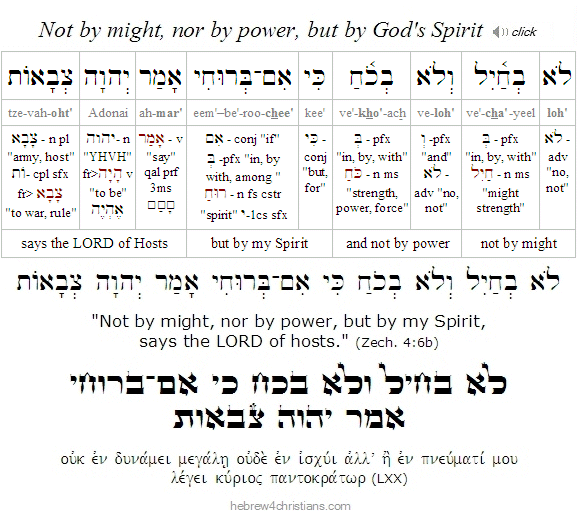
The Heart of Atonement...

04.27.20 (Iyyar 3, 5780) Most of our deepest anxieties come from the fear of death, whether we are conscious of this or not... Death represents fear of the unknown, fear of being abandoned, fear of being rejected, fear of being separated from others, and so on. I am so glad Yeshua gives us eternal life, which for me is not so much about immortality of the soul as it is being loved and accepted by God... That is what "at-one-ment" means, after all (John 17:22-23). Because God loves and accepts us, we trust Him to be present for us, even in the darkest of hours, on the other side of the veil, where he there "prepares a place for us" (John 14:2). As Yeshua said, "I tell you the solemn truth, the one who hears my message and believes the One who sent me has eternal life (חַיֵּי עוֹלָם) and will not be condemned, but has passed (i.e., μετά + βαίνω, lit., "crossed over" [עָבַר]) from death to life" (John 5:24). God's love "crosses over" from death to life and now forever sustains me.
Our Torah reading for this week (Acharei Mot) provides details about Yom Kippur, or the "Day of Atonement," a special service that gave ritual expression of God's love by making purification for our sins. As I've explained before, the word for love (i.e., ahavah: אהבה) equals the number thirteen (1+5+2+5=13), but when shared it is multiplied: 13 x 2 = 26, which is the same value for the Sacred Name (יהוה), i.e., (10+5+6+5=26). Likewise the Hebrew word for "life" is chayim (חַיִּים), is written in the plural to emphasize that life cannot be lived alone but must be shared. Notice that within the word itself are embedded two consecutive Yods (יי), representing unity in plurality (Yod-Yod is an abbreviation for YHVH, also indicating the "deep Akedah" of Father and Son). God gave up His life so that we can be in relationship with Him, that is, so that we can be "at-one" with His heart for us. Whatever else it may mean, then, the Hebrew word for "atonement" (i.e., kapparah, "covering," "protection," "purification," "forgiveness") is about accepting God's heart for you - being unified in his love - and if you miss that, you've missed the point of the Torah's teaching....
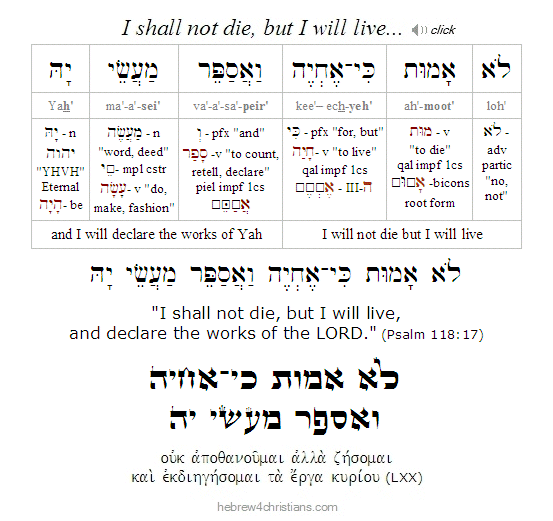 |
 |
Parashat Acharei Mot-Kedoshim

04.26.20 (Iyyar 2, 5780) Shavuah ve'chodesh tovim, chaverim. This week we have a "double portion" of Torah. Our first Torah portion is called Acharei Mot (אחרי מות). This portion transitions from the preceding readings regarding ritual purity (tahora) to recall the tragic incident of Nadab and Abihu, the two sons of Aaron who were killed when they offered "strange fire" (אשׁ זרה) upon the Altar of Incense during the dedication of the Tabernacle (see Lev. 10:1-2). Because these priests entered the Holy of Holies in an incorrect manner, the LORD further commanded Moses to instruct Aaron that he should enter the innermost chamber only in a carefully prescribed manner once a year, namely on the tenth day of the seventh month (i.e., chodesh Tishri) - during the sacred time called Yom Kippur (i.e., the "Day of Atonement"). The portion then describes the elaborate Yom Kippur ritual to purify the people as well as various dietary laws.
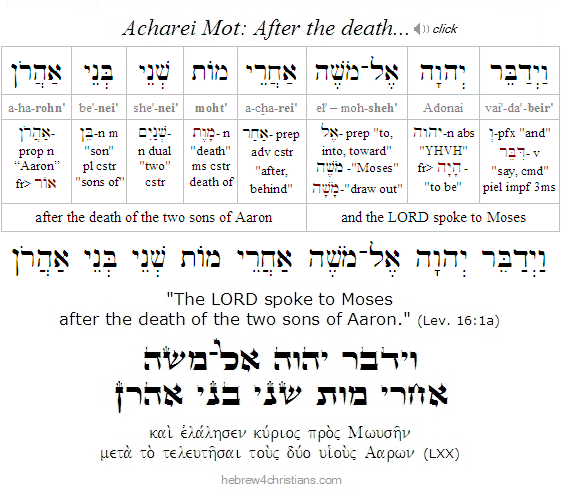 |
Our second Torah portion, called Kedoshim (קדשׁים), provides a series of social and ethical commandments concerning the practical expression of holiness in daily life: "Speak to all the congregation of the people of Israel and say to them, You shall be holy (קדשׁים תהיו), for I the LORD your God am holy" (Lev. 19:2). Indeed this portion lists more mitzvot (commandments) regarding practical ethics (musar) than any other of the Torah, thereby directly connecting the holiness of the community with obedience to God's moral truth.
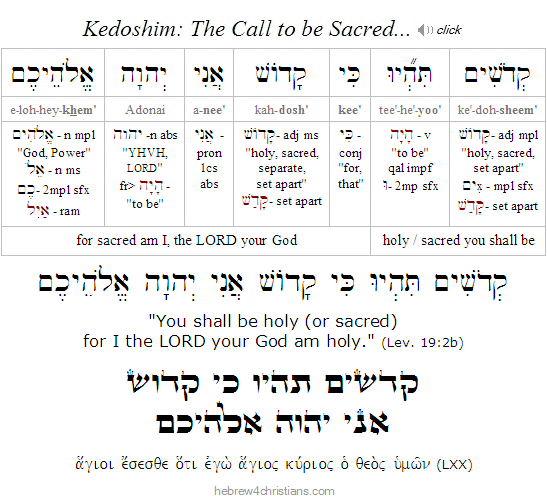 |
After stating the foundational requirement to be holy, the LORD begins to explain, "Each of you must respect (i.e., yirah: יִרְאָה) his mother and his father, and you must keep my Sabbaths. I am the LORD your God" (Lev. 19:3). The duty to revere (or honor) one's parents recalls the Fifth Commandment (Exod. 20:12), which is the starting point of learning to respect other people in our lives. Notice that the word for "my Sabbaths" (שַׁבְּתתַי) implies both the keeping of the weekly Sabbath as well as the "appointed times" of the LORD. As we will see, sanctifying time is a way we can express practical holiness in our lives...
Acharei Mot - Kedoshim Resources:
Living without Fear...

04.25.20 (Iyyar 1, 5780) The Spirit speaks to the heart of faith: "Fear not, for I have redeemed you; I have called you by name, and you are mine" (Isa. 43:1). God has personally redeemed you, friend; he calls you by name, and you belong to Him. The Lord loves you with an everlasting love (אהבת עולם) and draws you close (Jer. 31:3). He will never leave nor forsake you, even if you might face waters that seem to overwhelm or fires that seem to devour (Isa. 43:2). The will of your Heavenly Father will never lead you to a place where his love will not there sustain you.
Worry is a place of exile and pain. We are commanded, al tira, "fear not," because fear was behind the original sin in the garden, just as mistrust lies behind our own hiding and self-imposed exile from God... Since sin expresses a heart of fear (Rom. 14:23), the way of healing is to courageously turn back to God, despite our uncertainties. We can trust God's love for us because of the cross of Yeshua our Lord. If we haven't received God's love and acceptance, we are still enslaved to fear and abide in a state of exile. The love of God casts out our fear because it casts out all our sins (1 John 4:18).
It is written, "God has not given us the spirit of fear, but of power and of love, and of a "sound mind" (2 Tim. 1:7). The Greek word for "sound mind" means "safe" because of the restraining influence of the Spirit of God... If you sense fearful oppression within your heart, turn to the Lord and offer him focused praise. Lift up your soul to him and thank him for your trouble. This has the double benefit of confessing your trust in God's care, as well as vexing the enemy of your soul. Come boldly to the throne of grace to find your help (Heb. 4:16); cast all your anxiety on him, for he cares for you (1 Pet. 5:7).
The Name of the LORD (יהוה) means "Presence" and "Love" (Exod. 3:14; 34:6-7). Yeshua said, "I go to prepare a place for you," which means that his presence and love are waiting for you in whatever lies ahead (John 14:1-3; Rom. 8:35-39). To worry is to "practice the absence" of God instead of to practice His Presence... Trust the word of the Holy Spirit: "For I know the plans I have for you, declares the LORD, plans for healing peace and not for evil, to give you a future and a hope (Jer. 29:11).
Take comfort that your Heavenly Father sees when the sparrow falls; he arrays the flower in its hidden valley; and he calls each star by name. More importantly, the Lord sees you and understands your struggle with fear... Come to him with your needy heart and trust him to deliver you from the burdens of your soul (Matt. 11:28).
 |
 |
Healed by God's Love...

[ The following entry is related to this week's Torah, parashiyot Tazria-Metzora.... ]
04.24.20 (Nisan 30, 5780) The cleansing of a metzora (i.e., "leper") corresponded with other significant sacrificial rituals given in the Torah. The sprinkling of the hyssop by the priest recalled the blood of Passover; the offering made of the two birds - one which was sacrificed and the other set free - recalled the scapegoat of the Yom Kippur ritual. The washing of garments, the shaving of all hair, and the immersion in a mikveh (a pool of fresh water) recalled the birth of the Jewish people at the Sea of Reeds. Finally, the blood of the guilt offering sprinkled on the earlobe, thumb and foot, recalled the dedication of Aaron and his sons as the priests of Israel (Lev. 14:14). In other words, the individual purification process mirrored the purification of the community of Israel, and healing ultimately meant being re-identified as a redeemed child of God. In a spiritual sense, then, we see how the metzora was "reborn" by water and by the blood (John 3:5; 19:34; Heb. 9:19).
Of the Messiah it is written: "He is despised and rejected of men, a man of pains (אִישׁ מַכְאבוֹת) and acquainted with sickness (וִידוּעַ חלִי), and we hid as it were our faces from him. He was despised and we esteemed him not. Surely he has carried our sicknesses (חֳלָיֵנוּ) and borne our pains (מַכְאבֵינוּ), yet we esteemed him as plagued (נָגַע), smitten of God (מֻכֵּה אֱלהִים) and oppressed. But he was pierced (מְחלָל) for our transgressions (פְּשָׁעֵנוּ), he was crushed for our iniquities (עֲוֹנתֵינוּ): the discipline for our peace was upon him (מוּסַר שְׁלוֹמֵנוּ עָלָיו); and in his blows we are healed. All we like sheep have gone astray; we have turned every one to his own way, but the LORD has attacked in him (הִפְגִּיעַ בּוֹ) the iniquity of us all" (Isa. 53:3-6). Through the substitutionary sacrifice of the righteous Suffering Servant, Yeshua, we are both forgiven and made free from the power of sin and death. Because of Him we are no longer "lepers" or outcasts from the community of God but are made clean through His loving touch.
Notice that the word translated "blow" (i.e., חַבּוּרָה, "wound" or "stripe") comes from the same root as the word "friend" (חָבֵר), and therefore we can read this as "in His friendship we are healed." Yeshua gave up His life for us so that we could become his friends... As He later told us regarding his sacrifice: "Greater love has no one than this, that one lay down his life for his friends" (John 15:13). Indeed of Yeshua it may truly be said, Yesh ohev davek me'ach – "there is a Friend who sticks (davek) closer than a brother" (Prov. 18:24).
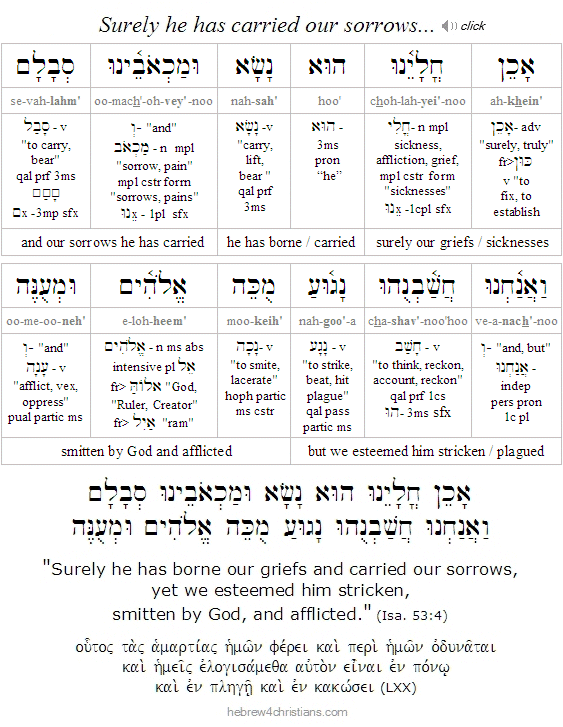 |
 |
Matters of Life and Death...

[ The following is related to our Torah reading this week, parashat Tazria-Metzora... ]
04.24.20 (Nisan 30, 5780) Just as the body can become sick with illness, so can the soul: "I said, 'O LORD, be gracious to me; heal my soul (רְפָאָה נַפְשִׁי), for I have sinned against you'" (Psalm 41:4). Likewise we understand that fear influences the way the brain processes images and messages. And since the mind and body are intricately interconnected, fear is often the root cause of many physiological problems such as heart disease, high blood pressure, clinical depression, and other ailments. Left unchecked, fear can be deadly. Note the connection between fear, lashon hara (evil thoughts/words), and sickness (tzara'at), which are themes of this week's Torah portion...
The targum Onkelos states that God breathed into Adam the ability to think and to speak. In other words, thought and speech are two primary characteristics of the image (tzelem) and likeness (demut) of God. Since our use of words is directly linked to the "breath of God" within us, lashon hara (לָשׁוֹן הָרָה) defaces God's image within us.... Using words to inflict pain therefore perverts the image of God, since God created man to use language to "build up" others in love. This is part of the reason the metzora (i.e., one afflicted with tzara'at) was regarded as "dead" and in need of rebirth.
Lashon hara (evil speech) is really a symptom of the "evil eye" (ayin hara). "Evil comes to one who searches (דָּרַשׁ) for it" (Prov. 11:27). We must train ourselves to use the "good eye" (ayin tovah) and extend kaf zechut (כַּף זְכוּת) - the "hand of merit" to others. Genuine faith is optimistic and involves hakarat tovah, that is, recognizing the good in others and in life's circumstances. Gam zu l'tovah: "This too is for the good" (Rom. 8:28). The Midrash states that God afflicted houses with tzara'at so that treasure hidden within the walls would be discovered. The good eye finds "hidden treasure" in every person and experience.
King David said (Psalm 35:13): "May what I prayed for happen to me!" (literally, tefillati al-cheki tashuv - "may it return upon my own breast"). Some of our prayers are conscious words spoken to God, whereas others are unconscious expressions of our inner heart attitudes. When we harbor indifference, ill will, or unforgiveness toward others, we are only hurting ourselves. It is very sobering to realize that our thoughts are essentially prayers being offered up to God... When we seek the good of others we find God's favor, healing and life. Yeshua spoke of "good and evil treasures of the heart" that produce actions that are expressed in our words (Luke 6:45). A midrash states that if someone speaks well of another, the angels above will then speak well of him before the Holy One.
In light of the enigma of "spiritual impurity" (i.e., tumah) and its ultimate expression revealed in the corruption of death, it is all the more telling that we should heed the cry of the Spirit: "Choose Life!" (Deut. 30:19). מָוֶת וְחַיִּים בְּיַד־לָשׁוֹן - "Death and life are in the power of the tongue" (Prov. 18:21). Sin is a type of "spiritual suicide" that seduces us to exchange eternal good for the petty and trivial. The nachash (serpent) in the garden of Eden was the first to speak lashon hara. He slandered God and lied to Eve about how to discern between good and evil. He is a murderer and the father of lies. Resist his wiles with the truth of God...
May it please the LORD to help each of us be entirely mindful of the power and sanctity of our words... May it please Him to help us use our words for the purpose of strengthening and upbuilding (οἰκοδομὴν) one another (Eph. 4:29). May God help us take every thought "captive" to the obedience of the Messiah, thereby enabling us to always behold and express the truth of God's unfailing love.
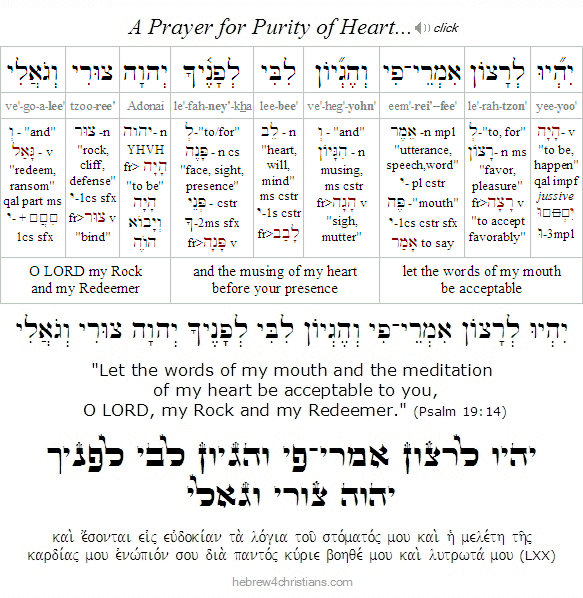 |
 |
Affliction and Teshuvah...
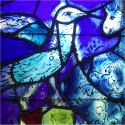
[ The following is related to our Torah reading this week, parashat Tazria-Metzora... ]
04.24.20 (Nisan 30, 5780) In one of his comments on tzara'at, Rashi says that affliction comes from haughtiness, and to be healed requires teshuvah (repentance). However, there is no genuine teshuvah until a person truly understands the greatness of God. After all, a person can be humbled from a broken heart, from serious illness, from poverty, and so on, but were these conditions different there may be a return to haughtiness, as we see in the case of Pharaoh. True humility is unconditioned and is based on the recognition and acceptance of the magnificence and glory of God. Yes, there is godly sorrow that leads to repentance, but ultimately repentance resolves upon the goodness and greatness of God, and without keeping that greater end in view, there is little practical difference between repentance and regret, despair, and shame. May the awe of the LORD be upon us...
אֱלהִים יְחָנֵּנוּ וִיבָרְכֵנוּ
יָאֵר פָּנָיו אִתָּנוּ סֶלָה
e·lo·heem · ye·cho·nei'·noo · vee·va·re·khei'·noo
ya·eir · pa·nav · ee·ta'·noo · se'·lah

"May God be gracious to us and bless us
and make his face to shine upon us, Selah."
(Psalm 67:1)

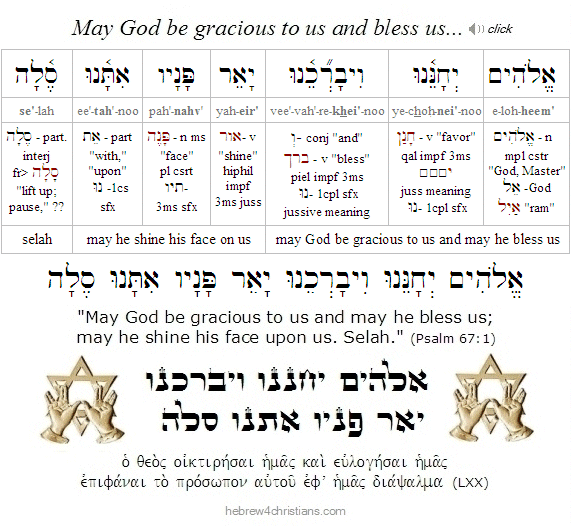
Priests and Lepers...
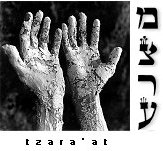
[ The following is related to our Torah reading for this week, parashat Tazria-Metzora... ]
04.24.20 (Nisan 30, 5780) It is written in our Torah: "When a person (i.e., adam: אָדָם) has on the skin of his body a swelling (שְׂאֵת) or a scab (סַפַּחַת) or a bright spot (בְּהֶרֶת)... he shall be brought to the priest" (Lev. 13:2). Here the sages note three common afflictions that befall the "children of Adam": swelling (arrogance), scabs (worldly vanity, from a word that means to join togther), and bright spots (representing the light of carnal reasoning to understand the ways of God). When we see only the affliction, we must go to the priest – to one who helps mediate the Divine Presence – to see how deep the affliction is... Symbolically, since we are all priests to one another (see Exod. 19:6; 1 Pet. 2:5,9; Rev. 1:6), we share our afflictions with one another, allowing ourselves to be seen, and to confess our need for healing. "Therefore, disclose (ἐξομολογέω, lit. 'confess out') your sins to one another and pray (εὔχομαι) for one another, that you may be healed..." (James 5:16).
Followers of Yeshua are intended by God to be healers (Luke 9:1). The most common word for healing in the New Testament is therapeuo (θεραπεύω), a word that means to serve, to care for, and to restore to health. Unlike some ministers who draw crowds to demonstrate the power of miraculous "faith healing," true spiritual healers take the time to listen to others, to hear their inward pain, and to extend compassion and grace to them. They help open the inner eyes of the heart by extending hope and a new vision about what is real... Indeed, lasting healing focuses less on being cured than on finding hope that will never die.
Note: Torah connects disease (i.e., tza'arat) with evil speech and thinking. Healing comes through doing teshuvah, that is, by confessing our sin and turning to God for forgiveness, as it says: "He forgives all your iniquities, he heals all your diseases" (Psalm 103:3).
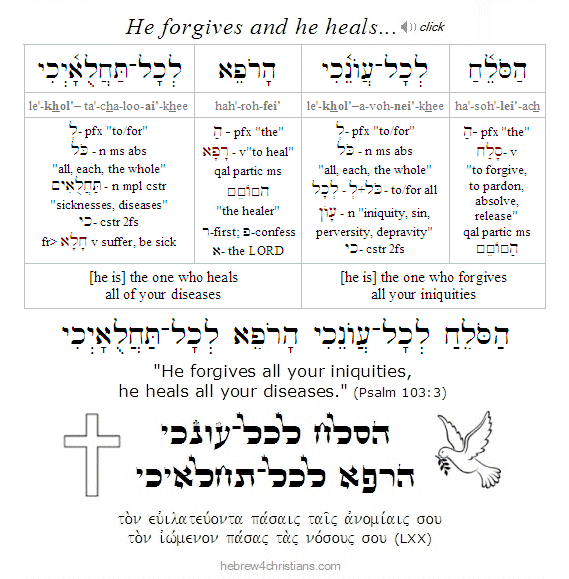 |
 |
Signs of the Time...

04.24.20 (Nisan 30, 5780) We feel like we are living in an eerie "Twilight Zone" episode of some kind, with empty stores, empty churches, and people walking about aimlessly, many with masked faces hiding their uncertainty and fear... At home, the kids are out of school; our regular social activities have all been canceled indefinitely. It surely is a time of difficulty, friends, as we await the fallout of closing down the world economies and hear various "experts" calling for ongoing social distancing, stay-at-home lock-downs, and the eventual implementation of biometric surveillance technologies. (Regarding the social upheaval, I am actually greatly understating the case, for the implosion of the dollar and the stock markets likely will foment the development of a worldwide digital currency system, the suspension of the US Constitution (and the Bill of Rights), and the introduction of global forms of governance: Rev. 13:17, etc.) Unemployment numbers are at unprecedented levels and the predictions are that they will only get worse. Meanwhile many parts of the world are suffering from global famines. Christian persecution is at an all-time high. We need to pray and ask God for wisdom and direction for this hour: "If my people who are called by my name humble themselves, and pray and seek my face and turn from their wicked ways, then I will hear from heaven and will forgive their sin and heal their land." Above all, however, we must trust that God is completely in control of all things and will use all of this for our ultimate good, as it is written: "No trial has overtaken you that is not common to man, but God is faithful, and he will not let you be tried beyond what you are able to bear, but with the trial will also provide a way out so that you may be able to endure it" (1 Cor. 10:13).
"I do not know why people should not like to study the Bible, and find out all about this precious doctrine of our Lord's return. Some have gone beyond prophecy, and tried to tell the very day He would come. Perhaps that is one reason why people do not believe this doctrine. He is coming - we know that - but just when he is coming we do not know. Matthew settles that: "But of the day and hour knoweth no man, no, not the angels of heaven, but my Father only." The angels don't know. It is something the Father keeps to himself (see also Acts 1:6-7).
If Christ had said,"I will not come back for 2,00 years," none of the disciples would have begun to watch for him until the time was near, but it is the proper attitude of the Christian to be always looking for his Lord's return. So God does not tell us when Christ is to come, but He tells us to watch. Just as Simeon and Anna watched and waited for his first coming, so should true believers watch and wait for his return. It is not enough to say you are a Christian , and that you are all right. You are not all right unless you obey his commandment to watch." (D.L. Moody: Second Coming, 1896).
 |
Israel and the Church:
What's the Connection?
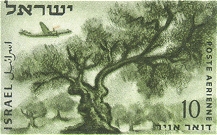
[ The following is related to Yom HaAtzmaut, or Israel's Independence Day... ]
04.23.20 (Nisan 29, 5780) When studying the "Jewish roots" of Christianity, certain questions often arise regarding the nature of the "Church," the nature of "Israel," and the relationship between them. Do Gentile Christians become "Jewish" on account of their relationship to Jesus? Does the "Church" somehow replace the Jewish people in God's plan as the "new Israel"? Exactly how should we understand the relationship between the Church and Israel today? In order to answer these questions we must carefully study the meaning of the word "Israel," the meaning of the word "Church," and the meaning of the word "Gentile," and then consider the logical relationships between these categories or groups... For more on this topic, see "Israel and the Church: What's the Relationship?"
Christendom...
and Philosophical Biases
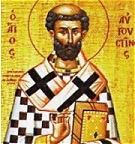
[ Yom HaAtzmaut, or Israel's Independence Day, is observed 29th this year... ]
04.23.20 (Nisan 29, 5780) Theologians all bring assumptions and biases when they read the Scriptures, but ideally the goal should be to discover the author's original intent as it was communicated to his audience. In other words, they should always try to read in context, taking into account the historical situation of the author (including the historical usage of the words and grammar) as well as the culture of those who would read his words. Violating this basic principle invites "reading into the text" things that just aren't there. That means, among other things, that if you are a Gentile theologian steeped in Western Greek traditions, you should be mindful that you are reading Jewish literature.
The study of interpretation theory is sometimes called "hermeneutics." In Talmudic Judaism, for instance, various compilations of rules and methods for determining the meaning of Scripture were devised. In addition to studying the diction and grammar of a given text, Jewish tradition added the techniques of logical deduction and rules of inference, the critical study of the Masorah (i.e., the scribal transmission process as well as the stylization of the text), the use of "gematria" (Bible codes), but most importantly, the use of precedence in interpretation (i.e., the communal dialog of the Oral Law). This general approach, it should be noted, was vastly different than the Hellenistic theology of Philo and the Jews of Alexandria in the second century B.C. who attempted to synthesize Greek philosophy (i.e., Plato) with traditional Judaism by means of allegorical interpretation methods -- a method that unfortunately many of the early church fathers adopted...
Christianity initially was embedded within the cultural matrix of Second Temple Judaism, of course, but it quickly became enmeshed in Hellenistic (Greek) culture and pagan tradition. The first "apostolic fathers" often quoted Scripture in order to refute various heresies (i.e., Gnosticism, Docetism, Montanism, etc.) and to demonstrate that Jesus was indeed the Messiah. Most of these early church leaders were Hellenistic Gentiles (e.g., Justin Martyr, Irenaeus, Clement of Rome, Tertullian, Origen, etc.) who sought to synthesize their Greek thinking with the Jewish Scriptures. Like Philo before them, these early "Alexandrian" apologists adopted the allegorical method of interpreting the Scriptures. For example, according to these "apologists," God destroyed the Temple and Jerusalem as a sign that He had abandoned the Jewish people. Now Gentile Christians were the chosen people who would "reconstitute" the Temple apart from Jerusalem's influence. This is the core idea of what would later be called "Replacement Theology." Sadly, many of today's church leaders seem to hold views about ethnic Israel that express institutionalized prejudice and reveal an "anti-Jewish" bias. The story of how the church got so far removed from the Jewish roots of the faith is a study of faultly exegetical assumptions, and serves as warning to those theological traditions that regard the church as "reconsituted" or "completed" Israel.
For more on this topic see, "Is Christianity anti-Jewish?"
 |
Do you have a Jewish Heart?
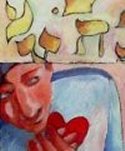
04.23.20 (Nisan 29, 5780) Do you have a Jewish heart? If you say that you love "the LORD God of Israel" (יהוה אלוהי ישראל) -- and it's clear that the LORD God of Israel loves the Jewish people -- it follows that you should likewise love the Jewish people (see Deut. 7:6-8; 14:2; 2 Sam. 7:23-24; 1 Kings 8:53; 10:9; 1 Chron 17:20-21; Isa 43:1-3; Jer. 31:31-37; Ezek. 36:24-28; Rom. 11:1-2;11:28; Hos. 11:1-11, etc.). After all, the LORD Yeshua is called מלך היהודים / melech ha-Yehudim: "the King of the Jews" (Matt. 2:2, 27:11, etc.), and the very term "Mashiach" [i.e., "Christ"] is a regal term denoting the anointed King of Israel. Christians who pray to "Jesus Christ" are really praying to Yeshua as the anointed King of the Jews... And one day (very soon) Yeshua will indeed return to Jerusalem, the "City of the Great King" (Matt 5:35), to assume the throne of David and complete the redemption originally promised to the Jewish people (Zech. 12:1-13:1; 14:1-9, Ezek. 37:12-14, etc.). God will prove faithful to ethnic Israel. To deny this is to radically question God's faithfulness to the "Church." Indeed, let me say this as plainly as I can: Churches or teachers who claim that God has abandoned ethnic Israel are directly impugning the credibility of the Gospel message itself. Yes, it's that serious of an issue...
The physical descendants of Abraham are called בּבת עינו (bavat eino), "the apple of God's eye" (Zech. 2:8) -- a term of endearment God uses for no other nation on earth. Indeed, the LORD has never abandoned His original covenant people but will yet choose them for His Name's sake (see Isa. 14:1). The church has not replaced Israel in God's redemptive plan but is merely "grafted in" to the original "root" of Israel. "Remember," Rabbi Paul warns, "it is not you who support the root, but the root supports you" (Rom. 11:18).
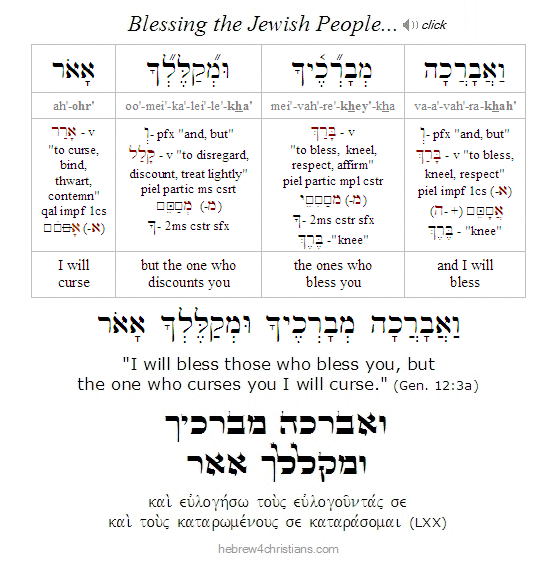 |
Note: The Scriptures state that LORD (יהוה) will forever be known as the "God of Abraham, the God of Isaac, and the God of Jacob" (אלהי אברהם אלהי יצחק ואלהי יעקב) which is his eternal name, "a memorial from generation to generation" (see Exod. 3:15). If you were not born Jewish, however, there is no need to feel like a "second-class" citizen, since those who are genuine followers of Yeshua are reborn by the Spirit of God, made children of God, adopted into his "household," and are the inheritors of all spiritual blessings in Messiah (Eph. 1:3-12). The sages say that a Gentile who turns to the LORD God of Israel holds a place higher than a Kohen Gadol (high priest), since his conversion is likened to Abraham who left his pagan past behind and crossed over to be in relationship with the one true God over all. A true convert is one who has been "chosen" and "called out from among the nations" to know God, and therefore partakes of the blessings of Israel (Eph. 2:11-18; 3:6). Moreover, a true Jew is not one outwardly, but rather one "inwardly," and circumcision is a matter of the heart, by means of the power of the Spirit of God (Rom. 2:28-29). The first shall be last and the last shall be first. If you want to be great in the kingdom, be a servant of all.
For more on this topic see, "The Importance of Blessing the Jewish People."
 |
Watching your Tongue - שְׁמִירַת הַלָּשׁוֹן
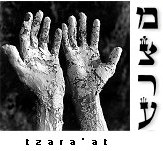
[ The following is related to our Torah reading this week, parashat Tazria-Metzora.... ]
04.22.20 (Nisan 28, 5780) According to the sages, tzara'at ("leprosy") was a punishment for evil speech, or "lashon hara" (לָשׁוֹן הָרָה). In midrashic literature, lashon hara is regarded as equal to idol worship, sexual immorality, and murder, and the one who indulges in it defiles his mouth so that even words of Torah and prayer are corrupted. "From the same mouth come blessing and cursing; brothers, these things ought not to be so" (James 3:10). The sages even go further: "Lashon Hara is worse than murder. One who murders, murders but one; however, one who speaks lashon hara kills three: the one who speaks it, the one who hears it, and the one of whom it is spoken." Lashon hara is likened to "emotional homicide" caused by publicly shaming another. According to the Talmud, the shamed person's face is drained of blood and turns white, and therefore humiliation is called "whitening the face" (i.e., halbanat panim: הלבנת הפנים). Therefore the sages identify the metzora (i.e., leper) with hamotzi ra, "one who brings forth evil," and they stress shemirat ha-lashon, the "guarding of the tongue," as a cardinal virtue of the righteous.
"Suffering is a sign that you're out of touch with the truth. Suffering is given to you that you might open your eyes to the truth, that you might understand that there's falsehood somewhere, just as physical pain is given to you so you will understand that there is disease or illness somewhere. Suffering points out that there is falsehood somewhere. Suffering occurs when you clash with reality. When your illusions clash with reality when your falsehoods clash with the truth, then you have suffering. Otherwise there is no suffering." - De Mello
Those who think it easy to control the tongue have likely never really tried to do so. "The tongue is a small member, yet it boasts of great things. How great a forest is set ablaze by such a small fire! And the tongue is a fire, a world of unrighteousness. The tongue is set among our members, staining the whole body, setting on fire the entire course of life, and set on fire by hell" (James 3:5-6). Ultimately, controlling your tongue (i.e., shemirat ha'lashon: שְׁמִירַת הַלָּשׁוֹן) is a matter of controlling your inner thoughts, your heart, and your attitude (shemirat ha-lev). Therefore we are admonished to be "quick to hear, slow to speak, slow to anger," since the anger of man never works the righteousness of God (James 1:19). May the LORD our God help us always to speak with grace, "seasoned with salt" (Col. 4:6); and may we all "speak the truth in love to grow up in every way" (Eph. 4:15).
Note: For more on this important topic, click here.
Theology After Auschwitz...
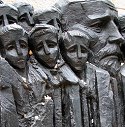
04.21.20 (Nisan 27, 5780) What does the Holocaust mean to you? How do you do "theology after Auschwitz?" Does the Shoah rouse you to be vigilant against the rise of political evil in the world? Does its warn you how about how easy it is for you to "tune out" - to close your eyes, ears, and nose to the presence of evil and the practice of social injustice and crimes against humanity? As Elie Wiesel said, "Indifference to evil is evil." Hitler not only murdered millions of Jews (including over a million Jewish children), but he also murdered millions of non-Jews whom he regarded as a threat to his political ideology and to "homeland security." We must never forget the horrors of Holocaust because it could happen again - and to believe otherwise is to forget the radical evil lurking within human nature...
קוּמִי רנִּי בַלַּיְלָה לְראשׁ אַשְׁמֻרוֹת
שִׁפְכִי כַמַּיִם לִבֵּךְ נכַח פְּנֵי אֲדנָי
שְׂאִי אֵלָיו כַּפַּיִךְ עַל־נֶפֶשׁ עוֹלָלַיִךְ
koo·mee · roh·nee · va·lai'·lah · le·rosh · a·she·moo·roht
sheef·khee · kha·ma'·yeem · lee·bekh · no·khach · pe·nei · a·do·nai
se·ee · e·lav · ka·pa'·yeekh · al · ne'·fesh · o·la·lai'·yeekh

"Arise, cry out in the night, at the beginning of the night watches!
Pour out your heart like water before the face of the LORD!
Lift your hands to him for the lives of your children."
(Lam. 2:19)

"I believe. I believe in the sun even when it is not shining; I believe in love even when feeling it not; and I believe in God, even when God is silent" (from an anonymous poem found on the wall of a cellar in Cologne, Germany, where some Jews hid from the Nazis).
Dangerous Double Mindedness...

04.21.20 (Nisan 27, 5780) "Seek ye first the kingdom of God and his righteousness" (Matt. 6:33). This is the right approach to life: Open your heart to heaven and seek God's presence before you do anything else (Prov. 3:5-6). This is particularly important at this time, friends. Do you want your mind to be confused, excited, depressed or angry? Do you want others to decide what is important and "real" for you? Then turn your attention to this world and its rumors and news. The mass media thrives on trouble - whether real or imagined - and serves to manipulates people by making them afraid. The newsmakers of this world understand that fearful people make their most loyal consumers...
Consider the godless assumptions that underlie the "obvious" news of the this world, however. Purported experts are lined up; the dialog is scripted; sound bites are repeated on a relentless schedule, images and videos are crafted, yet you will hear nary a word to call upon God for healing and deliverance. God is simply "not there"; he is not part of the narrative of the present crisis or trouble. Yet nothing could be further than the truth!
The LORD God must be the first principle of our thinking or else we will become deceived, regardless of the formal validity of our reasoning. There is a difference between soundness and validity, and if we do not begin with truth, our thinking will be impaired, even if we accidentally make inferences that turn out to be empirically true. Therefore we must be vigilant and vigorously challenge ideas that attempt to seduce us away from the truth and divide our affections. We must learn to identify the false assumptions that deny the knowledge of God and take "every thought captive" to Messiah. We must be on guard for subtle and calculated appeals to compromise our faith (2 Cor. 10:5). If we find ourselves in a state of recurring temptation, we must examine the underlying assumptions that are at work in our thinking. If we dig deeper, we are likely to discover that we are doubting that God cares for us, or we are fearful that God will not meet our needs. We must therefore counter such faithless assumptions with God's revealed truth, and that means regularly studying and reviewing the Scriptures to remind ourselves about what is real rather than what is illusory. We then can learn to look at life as it really is - a spiritual world, a "valley of decision," a corridor that irresistibly leads to the world to come. Each soul is on a journey to meet with God for judgment... God does not leave us comfortless. He has promised to never leave nor forsake those trusting in Him. He is your Good Shepherd who walks with you during your sojourn through this temporal world (Psalm 23).
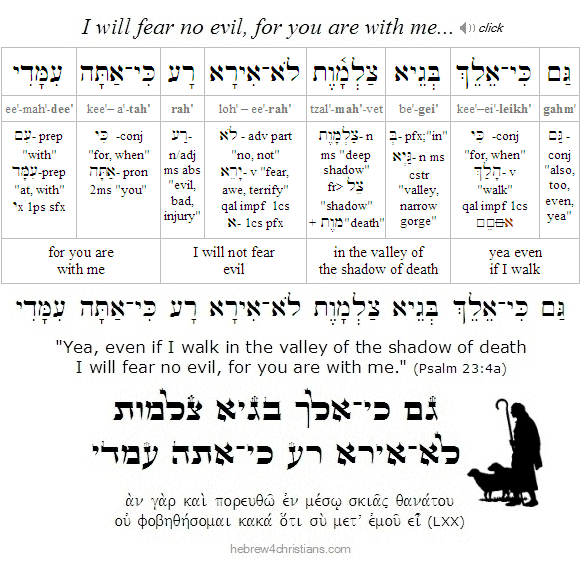 |
A voice says, "Cry!" And I said, "What shall I cry?" All flesh is grass, and all its beauty is like the flower of the field" (Isa. 40:6). "All flesh is grass" (כָּל־הַבָּשָׂר חָצִיר) - we are here today but gone tomorrow. We have only so many chances to turn to the LORD and make up our minds that we will serve Him. Our Torah portion this week intimates, "man is a tree of the field," i.e., הָאָדָם עֵץ הַשָּׂדֶה, Deut. 20:19). The righteous man is described as a "tree planted by the rivers of water that brings forth fruit in his season" (Psalm 1:3). If you stand in front of a tree to watch it grow, however, you will see nothing. But if you care for the tree, nurture it over time, and provide for its needs, eventually you will see its fruit appear. God gives us each a season to repent, but if that proves fruitless in our spiritual lives, eventually we will be "cut down" (Luke 13:6-9).
The Scriptures warn that a "double-minded man is unstable in all his ways" (James 1:8). The word translated "double-minded" is dipsuchos (δίψυχος), a word formed from δίς, "twice" and ψυχή, "soul." The word describes the spiritual condition of having "two souls" that both want different things at once. It is therefore a state of inner contradiction, of having two separate minds holding contradictory thoughts. "How long will you go limping between two opinions?" Notice that the word translated "limping" is posechim (פּסְחִים), from the same root as Passover (i.e., pasach: פָּסַח): How long will you pass from one thing to another? How long will you play "hot potato" with your commitments?
Being doubleminded makes us "unstable in all our ways." Such a cross-eyed approach leads to disorientation and confusion. The Greek word used to describe being "unstable" (ἀκατάστατος) is the same word used to translate being "storm-tossed and not comforted" in last week's Haftarah portion (LXX: Isa. 54:11). The image of a ship being tossed in the sea pictures a state of distress and peril. Interestingly, the description of being "not comforted" is lo nuchamah (לא נֻחָמָה), which comes from the very word translated as "repent" or "regret" (nacham). When we are double-minded, we are "storm tossed" and unable to experience the comfort that comes from genuine repentance. We are like "a wave of the sea that is driven and tossed by the wind" (James 1:6).
On the other hand, singleness of vision concentrates the will and produces wholeheartedness, conviction, stability, inner peace (shalom) and genuine character. As Kierkegaard said, "purity of the heart is to will one thing." "I have set the LORD always before me; because He is at my right hand, I shall not be moved" (Psalm 16:8).
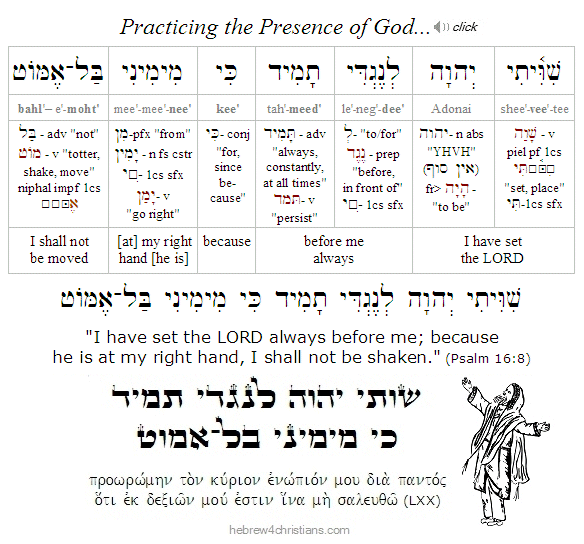 |
The Apostle Paul taught that we are not to be "conformed" (συσχηματίζω) to the pattern of this fallen world but rather be "transformed" (μεταμορφόω) by renewing our minds, so that by testing we may discern what is the will of God (Rom. 12:2). Note that the word translated "conformed" in this verse means to accept the world's scheme (σχῆμα) of understanding things, that is, to passively go along with the world's matrix of lies, wishful thinking, propaganda, etc. The word translated as "transformed," on the other hand, means to be metamorphosed or radically changed into a different kind of nature with a different source of being itself. Such transformation comes from having our minds "renewed" -- the word used in this verse (i.e., ἀνακαινόω) means being "made new on the inside," and therefore renewal is the gift of teshuvah (turning to God). Understand, then, that the foundation of all transformation of inner character and outward conduct comes from the miracle of having a renewed mind. I use the word "miracle" quite intentionally, since by itself "right thinking" is powerless to help the sinner truly change his ways, and therefore something more - new life and healing power from heaven, is needed. Indeed "the beginning of transformation of character is the renovation in the very centre of the being, and the communication of a new impulse and power to the inward self" (Alexander Maclaren). Amen, may the LORD God work out our salvation and give us the grace to walk our days in the light of his countenance.
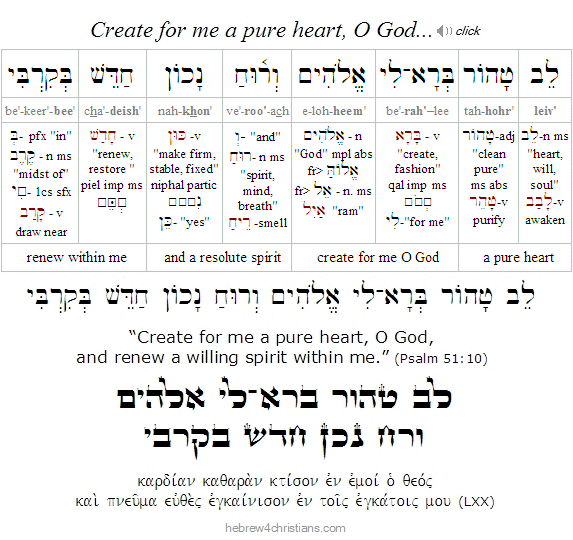 |
 |
Yom HaShoah Audio Podcast...
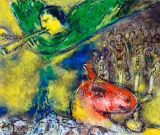
04.21.20 (Nisan 27, 5780) Shalom chaverim. I made a new audio podcast for Yom HaShoah, or Holocaust Remembrance Day (see the link below) wherein I discuss some of the philosophical influences that led to the atrocities of the attempted genocide of the Jewish people, including the rise of the idealism of G.W. Hegel and the pragmatic concept of the "dialectic" that was used to negate the value of the individual in preference to the collective.... Hegel directly influenced Karl Marx and his godless materialism and social revolutionary theories, and in general it may be said that German idealism led both to the nihilism of Friedrich Nietzsche and to barbarity of Adolf Hitler's national socialism. Though the subject matter is a bit philosophical, I nevertheless hope you will find it helpful.
The Devil's Logic...

[ The Holocaust did not happen in a vacuum but was theoretically justified by appeals to pragmatism and the denial of transcendental moral reality... ]
04.20.20 (Nisan 26, 5780) It's been said that modern politics operates on the basis of the so-called "Hegelian Dialectic," a method of social engineering based on a rather dismal theory about how precious little people can actually know (or be allowed to know). This theory can be easily traced to the "critical philosophy" of Immanuel Kant (1724-1804), who taught that the human mind cannot transcend itself in order to apprehend ultimate reality. There are limits or boundaries to the mind's ability to discover "things in themselves," and at best we are left with methods (or paradigms) by which we "manage appearances." Even hard sciences, such as physics, can only deal with the phenomenal realm of life. The inner working of reality — the "noumenal" — is sealed off as essentially unknowable. We are left only with postulates, hypothetical constructs, models, etc., but knowledge is essentially constrained by fundamental structures of consciousness (e.g., the categories of space and time) from which we interpret any possible experience.
Instead of accepting the limits of the human mind that Kant outlined (the "antinomies of reason"), G.W. Hegel (1770-1831) went on to claim that the mind itself is its own endpoint, and therefore the interplay of ideas is itself ultimate reality. In other words, Hegel was an "idealist," by which is meant that he considered ideas to be the substrata of reality. The phenomenal realm is the product of the mind, after all, and therefore it is the very thing Kant said could not be known — i.e., the noumenal.
The Hegelian Dialectic is what I call "the devil's logic," based as it is on compromise, calling evil good and good evil, hissing out a seductive appeal to a supposed "higher synethesis" of esoteric knowledge, claiming superiority to the commonsense truth claims of experience, justifying human atrocities, barbarity, callous pragmatism, and even cold-blooded murder for the sake of power and control. From Hegel spang Karl Marx (1818-1883) and Friedrich Nietzsche (1844-1900), and from Nietzche sprang Hitler and modern fascism. Propagandists and disinformation specialists are masters at the "Problem → Reaction → Solution" technique for coercing social change. It's the prevailing dogma of the princes of this world, and it is regularly at work in the halls of power today.
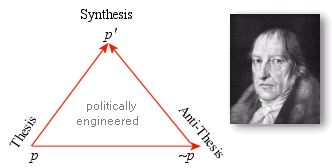 |
Note: For more please see: The Devil's Logic: Pragmatism and the Hegelian Dialectic.
Meaning in Suffering...

[ Yom HaShoah, or Holocaust Remembrance Day, is observed Tuesday, April 21st this year... ]
04.20.20 (Nisan 26, 5780) It has been noted that the survivors of the concentration camps were not necessarily the physically strongest, but they were people able to find meaning in their suffering and who never lost sight of hope. As survivor Viktor Frankl once said, "In some ways suffering ceases to be suffering at the moment it finds a meaning, such as the meaning of a sacrifice" (Frankl: Man's Search for Meaning). In light of this, let's resolve now to live each day full of concentrated hope - full of conviction - that even should this be the last day of our earthly existence, we will stand for God, we will hold on to the truth of God's salvation, and we will die in the everlasting hope of God's victorious love.
We who lived in concentration camps can remember the men who walked through the huts comforting others, giving away their last piece of bread. They may have been few in number, but they offer sufficient proof that everything can be taken from a man but one thing: the last of the human freedoms -- to choose one's attitude in any given set of circumstances, to choose one's own way...
Ultimately, man should not ask what the meaning of his life is, but rather he must recognize that it is he who is asked. In a word, each man is questioned by life; and he can only answer to life by answering for his own life; to life he can only respond by being responsible. - Viktor E. Frankl
Treasures New and Old...
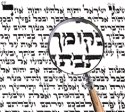
04.20.20 (Nisan 26, 5780) The Scriptures declare: "Blessed is the man who ... delights in the Torah of the LORD (בְּתוֹרַת יְהוָה); all that he does shall prosper" (Psalm 1:1-3). And while it is true that we are no longer 'under' the constraints of the former covenant given at Sinai (Rom. 3:20-28), we are repeatedly instructed to delight in the Torah and to meditate on its precepts day and night (Josh 1:8, Psalm 1:2; 19:8; 119:15, 47, 97; Neh. 8:12, etc.). As it is written in Proverbs: "If you seek it [i.e., the wisdom revealed in the Torah] like silver and search for it as for hidden treasures, then you will understand the fear of the LORD and find the knowledge of God" (Prov. 2:4-5). Indeed, the New Testament says that the "the Torah is holy, and the commandment is holy and righteous and good" (Rom. 7:2), and where it is written, "all Scripture is breathed out by God and is profitable for teaching, for reproof, for correction, and for training in righteousness" (2 Tim 3:16-17), it is evident that the Jewish Scriptures (i.e., the Torah, the Prophets, and the Writings) are meant, since they provide the foundation, context, and the overarching matrix for the later New Covenant revelation... And of course these were the Scriptures Yeshua used to explain his ministry to his followers: "And beginning with Moses and all the Prophets, he interpreted to them in all the Scriptures the things concerning himself" (Luke 24:27; John 1:45). In other words, the Torah has both a logical, a linguistic, and a theological priority for understanding the New Testament Scriptures, and the failure to read in context invariably leads to faulty interpretations and doctrinal errors of various kinds. God "breathed out" (θεόπνευστος) his revelation in order, and the message itself must be understood in light of that order (Gal. 4:4-5).
"Therefore every scribe who has been trained for the kingdom of heaven is like a master of a house, who brings out of his treasure what is new and what is old" (Matt. 13:52).
 |
 |
Parashat Tazria and Parashat Metzora...

04.19.20 (Nisan 25, 5780) Shavuah tov, chaverim. This week we have a "double portion" of Torah to study, namely parashat Tazria (תזריע) and parashat Metzora (מצרע), both of which focus on the concept of being "clean" (i.e., tahor: טָהוֹר) and obtaining purification from a state of "uncleanness" (i.e, tamei: טָמֵא). The first portion, Tazria, continues the discussion of the laws of "purity" and "impurity" that began with parashat Tzav. Of particular interest are certain afflictions, collectively called tzara'at (צארעת), that caused the affected person (or thing) to be both ritually impure (tamei) and in a state of uncleanness (i.e., tumah: טומאה). Tzara'at was an a spiritual affliction (i.e., yisur: יסור) that could only be diagnosed by a kohen (priest) and not by a doctor... A person diagnosed with tzara'at was called a "metzora" (מצרע) and was forced into quarantine where they were instructed to do teshuvah (repentance) and seek spiritual healing.
After the metzora had apparently been healed, he or she would call for the priest to be reexamined. If the priest saw no sign of uncleanness, a second examination was scheduled seven days later, and if the person was still free from any sign of the disease, a process of purification (i.e., tahara: טָהֳרָה) would begin. The purification ceremony was somewhat like a "personal Yom Kippur" service. After the second examination, the priest required that the metzora bring the following items for his cleansing:
- An earthenware bowl filled with spring water (mayim chayim)
- Two birds of the same type (whether turtledoves or pigeons)
- A stick of cedar wood
- A hyssop branch
- A scarlet thread
The priest then commanded that one of the birds should be slaughtered over the earthen vessel filled with fresh water, with its blood mixing with the water. The living bird, the piece of cedar, and the hyssop branch were then tied together using the scarlet thread, and the entire bundle was dipped into the earthen vessel. The blood and water mixture was then sprinkled seven times on the healed metzora, and the living bird was then set free.
Once completed, the healed person washed their clothes, shaved off all their hair (including the eyebrows), and was immersed in a mikveh (ritual pool for cleansing). On the eighth day the person would bathe again and offer sacrifices, the blood of which was mixed with oil and applied to the earlobe, thumb and foot -- similar to the blood applied to the priests during their ordination. Only after all this was the person pronounced tahor (clean) by the priest. The time of uncleanness would be over, and he would be like a person brought back from the dead to new life. In a very literal sense, then, we see how the metzora was "reborn" by water and by the blood (John 3:5; 19:34; Heb. 9:19).
Notice how the purification ritual corresponded with other rituals revealed in the Torah. The sprinkling of the hyssop by the priest recalled both the blood of the Passover lamb and the sprinkling of the ashes of the Red Heifer that cleanse from contact with death; the offering made of the two birds - one which was sacrificed and the other set free - recalled the scapegoat of the Yom Kippur ritual. The washing of garments, the shaving of all hair, and the immersion in a mikveh recalled the birth of the Jewish people at the Sea of Reeds. The blood of the guilt offering applied to the earlobe, thumb and foot, recalled the dedication of Aaron and his sons as the priests of Israel (Lev. 14:14). In other words, the individual purification process mirrored the purification of the community of Israel, and healing ultimately meant being reidentified as a redeemed child of God.
Beauty for Ashes...

[ Yom HaShoah, or Holocaust Remembrance Day, is observed Tuesday, April 21st this year... ]
04.19.20 (Nisan 25, 5780) While there is no official "haggadah" for the Yom HaShoah memorial, it is traditional to light a yellow yahrzeit candle for those who died, to attend a Yom HaShoah memorial service, and to recite kaddish. Some people prepare a lavish meal using recipes written from memory by the starving women of Theresienstadt (salvaged after the war). Many of these recipes are for rich desserts and cakes, recalling days of joy before the women and their families were rounded up and brought to the concentration camps. During the memorial meal, stories of Jews who died are told, as well of those of survivors. Many survivors tell stories about the "hidden children" who were saved by righteous Gentiles (חֲסִידֵי אוּמוֹת הָעוֹלָם). These young survivors were either hidden in secret places (like Anne Frank) or were "adopted" by Christian families who pretended they were their own children.
Though we can't control what happens in this dangerous world, we can trust that God is working all things together for good, even during times of severe testing, and even in things that are blatantly evil (Rom. 8:28; Gen. 50:20). And while we instinctively recoil at the prospect of physical death, there are decidedly things worse than death itself, namely, losing hope in life, walking in the darkness of despair, living a joyless existence because of fear. As much as we abhor evil - and we must resist it with all our hearts - even more must we love the good - and cling to God (וּלְדָבְקָה־בוֹ) with all that is within us.
Ultimately, the most important thing to remember regarding death is the truth about God's salvation (יְשׁוּעָה). After all, God assuredly hates death and provides each of us with its eternal remedy: By clothing himself in human flesh, Yeshua embraced mortality itself and willingly bore the penalty for your sins, exchanging his life for yours, thereby destroying the one who had the power of death, namely the devil, and by so doing, set you free from slavery to the dread of death (Heb. 2:14-15). To those who belong to belong to Messiah, death represents a passage to eternal life and the loving presence of God Himself.
Only the miracle of faith can see hope in the face of radical evil... and yet that is the very message of the cross of the Messiah... Our Lord demonstrated that He is the the Killer of death itself; the Slayer of the Serpent; and the ultimate Triumph of God's Light over the realm of despair and everlasting darkness... He is the First and the Last, the Living One who died, and behold is alive forevermore, the true Keyholder of Death and Hell (Rev. 1:18).
For more on this topic see: "Beauty for Ashes: Further thoughts on the Shoah."
 |
Walk in His Light...
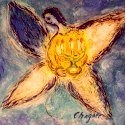
04.17.20 (Nisan 23, 5780) Fear profoundly affects the way the brain processes images and messages, influencing the way we see and hear things. And since the mind and body are intricately interconnected, fear is a root cause of many physiological problems such as heart disease, high blood pressure, clinical depression, and many other ailments. Left unchecked, fear can be deadly.... Most of our negative emotions come from fear, including anger, frustration, and rage. On a spiritual level, fear and worry can cause people to question God's love, to doubt His promises, and to succumb to despair. The devil knows that frightening people causes them to be unsettled, off-balance, and vulnerable to all sorts of manipulation and deception. Living in fear is a form of slavery (see Heb. 2:15).
Politicians, advertisers, social activists, and other manipulators understand that when people are afraid, their thinking is compromised, and therefore the propaganda of the world inevitably seeks to incite anxiety, dread, terror, division, and confusion by means of disinformation served up through pop culture. The way of healing is therefore to refuse to be bullied by the carefully crafted messages of deception regularly broadcast by the various "princes of this world..." We are not to be ignorant of Satan and his strategies to foment resentment, mistrust, and hatred. We must overcome the power of the lie by consciously focusing on the truth of God and the abiding Reality of the Divine Presence. As King David resolved within his heart: shiviti Adonai - "I have set the LORD (שׁויתי יהוה) always before me - because He is at my right hand, I shall not be shaken" (Psalm 16:8).
שִׁוִּיתִי יְהוָה לְנֶגְדִּי תָמִיד
כִּי מִימִינִי בַּל־אֶמּוֹט
shee·vee'·tee · Adonai · le·neg·dee · ta·meed
kee · mee·mee·nee · bal - e·moht

"I have set the LORD always before me;
because he is at my right hand, I shall not be shaken."
(Psalm 16:8)
Hebrew Study Card


The Hebrew word shiviti (שׁויתי) comes from the verb shavah (שָׁוָה) which means "to set" or place, referring to focus of the heart required to truly apprehend the Divine Presence. In this connection, we note the "korban tamid" (תָּמִידקָרְבַּן) was the sacrifice of a lamb every evening and morning upon the copper altar in the outer court -- the central sacrifice of the Tabernacle. Along with it, matzah and wine offering were required, thereby revealing the true Passover Lamb of God and his sacrifice for us (Exod. 29:38-42). That the lamb was offered twice daily hints at its two applications - the first concerning the great deliverance from Egypt by the blood of the Lamb, and the second concerning the even greater deliverance given through Yeshua, the true Lamb of God (John 1:29). Note also that the constant sacrifice of the lamb required that the fire at the altar would never be extinguished, and by extension, the duty to "care for the inner fire" of the soul. Thank God that the fire that daily needs tending comes from the Spirit of God within us!
Therefore "fear no evil," for God is with you (Psalm 23:4). There is no fear in God's love, but perfect love (אַהֲבָה שְׁלֵמָה) throws out fear (1 John 4:18). The LORD repeatedly tells us not to be afraid – not of man, nor of war, nor of tribulation, nor even death itself (Rom. 8:35-39). Indeed, the most frequent commandment in Scripture is simply al-tirah, "Be not afraid."
But how do we overcome our fears apart from trusting that God is "with us..." He is the Good Shepherd (הָרעֶה הַטּוֹב) who leads us on our way and meets our daily needs. The LORD promises to never leave nor forsake us, especially when we are faced with difficult circumstances. The antidote to our fear is comfort found in God's love (1 John 4:18): God saves us from our fears (Psalm 34:4, 2 Tim. 1:7). When we trust that God personally cares for us, we find courage to face trouble without shrinking back....
The entire world system (κόσμος) is predicated upon fear -- the fear of man and the underlying threat of violence.... We disarm the power of the world over our souls by walking in the Light and refusing to succumb to the lie. We call upon the Name of the LORD and ask Him to empower us to live as His witnesses during these difficult and evil days.
 |
 |
Beware of Christian Anti-Semitism...

[ The following is related to Yom HaShoah, or "Holocaust Remembrance Day"... ]
04.17.20 (Nisan 23, 5780) We must always be vigilant whenever we hear expressions of "anti-Semitism," especially from those who claim they are followers of Yeshua the Messiah... Recently I listened to a sermon on the resurrection delivered by a well-known evangelical minister who repeatedly made various anti-Semitic statements during his sermon. For example, this preacher said, "The Jews had tried to get rid of Jesus since he first arrived; they tried, when he was just a young child, to get rid of him by pulling off a mass murder of all the male children in the Bethlehem area. They pronounced curses on him; they ascribed him to demonic power in efforts to discredit him... they used injustice to sentence him, false witnesses to tell lies about him, blackmail against Pilate to get him executed... and bribery to silence the truth of the resurrection." The preacher went on to decry the lies of "the Jews," collectively blaming them for their unbelief and treachery, lamenting their deceptive tactics, and so on. It was grievous for me to hear this...
Friends, we must learn to think clearly and to get our terms properly defined before we make such inflammatory statements. Certainly not all of the Jewish people rejected Jesus and his message, and indeed the Jews were his first followers -- and many even died for their faith in him. Nevertheless I became alarmed as I listened to this popular preacher emphatically saying that "the Jews" sought to murder Yeshua when he was just a young child -- referring of course to Herod's murder of the children as described in Matthew's gospel -- without understanding that this heinous decree did not originate from the Jewish people but rather from a psychopathic despot who was not even ethnically Jewish (Herod "the Great" was an "Idumean," that is, a descendant of Esau, and a puppet of pagan Rome). To say or even insinuate, then, that "the Jews" tried to murder Jesus in this case is therefore both inaccurate, inflammatory, and based on ignorance. It is like saying "all Germans were Nazis," or "all African Americans are democrats," or "all who study the Torah are legalists," or some other racist or obtuse generalization.
I do not want to belabor this point, but it is essential that we learn to think clearly when we draw our conclusions from the Scriptures. The general term "the Jews" as used in the New Testament (οἱ ᾽Ιουδαῖοι) needs to be qualified to understand what is meant by that word in a given context. Meaning is always determined by context. After all, Jesus himself was a Jew, born the "King of the Jews," his family was Jewish, his first followers were all Jews, and many of the "lost sheep of the house of Israel" believed in him. Moreover Jesus plainly said, "Salvation is of the Jews" (John 4:22). Remember that the early "church" was a Jewish movement and it was considered scandalous that a Gentile could find salvation at all! Keep in mind that genuinely Christian theology is firmly rooted in the Jewish Scriptures and that the message of the gospel is impaired and even lost if the church forgets that it is "grafted in" to the covenants, promises, and blessings given to the Jewish people (Eph. 2:11-12).
So pastors and teachers -- be careful with your words. Learn to identify your theological assumptions and how they affect our thinking. This admonition should be obvious enough, though it is all too common for people to make misjudgments because they devalue the effort required to carefully (and honestly) think through an issue. As William James once said, "A great many people think they are thinking when they are merely rearranging their prejudices." When it comes to questions about the gospel, however, God regards such carelessness to be blameworthy (Acts 17:30-31). Brothers and sisters, we have an "epistemic duty" to think clearly and to use right reason (2 Tim. 2:15). Again, the LORD holds us personally accountable for what we think, believe, and say -- especially when it comes to the reality and mission of His Son (Matt. 7:21-23; 12:36-37).
False teachers inevitably "twist the Scriptures" by offering unsound interpretations contrary to the ruach, or spirit of the Hebrew prophets, and by evading the commandment to "rightly divide" the word of Truth according to basic logic and clear thinking (2 Tim. 2:15; 2 Pet. 1:20-21; 3:16). In Christian circles, they often come in the name of the law (legalism) or in the name of grace (licentiousness), but rarely do they take the trouble to carefully (and equitably) work through the paradoxical tensions. False teachers are uncomfortable humbly confessing they don't know something, and therefore they are quick to style themselves as an infallible prophet or source of authoritative wisdom...
There is no substitute for taking the time and energy to humbly study Torah, friends, and we should be suspicious of those who claim special insight when it is evident that they have not really labored working through the Scriptures... All disciples of Yeshua are called "students," or talmidim (תלמידים), a word that comes from lamad (לָמַד) meaning "to learn" (the study of Scripture is called talmud Torah (תַלְמוּד תּוֹרָה) from the same root). Among other things, then, following Yeshua means becoming a student of the Jewish Scriptures that he both loved and perfectly fulfilled (Matt. 5:17-18; Luke 24:44-45). Only after learning the truth of the Scriptures will you be equipped to "go to all the nations and teach" others (Matt. 28:19). This is accomplished not merely by explaining (propositional) doctrine but by kiddush HaShem -- sanctifying the LORD in our lives (1 Pet. 1:15-16). "You shall know them by their fruits..."
Let me add that the problem of generalization is not restricted to statements made about "the Jews" in the Gospels, but is really a challenge we face throughout Scripture. For instance, the word "law" (i.e., νόμος, "nomos") has a range of semantic meanings in Koine Greek and therefore should not automatically be regarded as an equivalent for the term "Torah" (תורה). As I've explained over the years, the word "Torah" is derived from the verb yarah (ירה) meaning to "shoot" (as an arrow), or to indicate direction. It is therefore a general term that refers to instruction or guidance, and should be carefully distinguished from other Hebrew words such as "commandment" (i.e., mitzvah: מצוה), "statutes" (i.e., chukkim: חקים), "judgments" (i.e., mishpatim: משׁפתים), and so on. To traditional Jewish thinking, the legal aspect of Torah is generally called halakhah (from halakh: הָלַךְ, "to walk") and includes the ideas of case law (i.e., takkanah: תַּקָּנָה), custom (ie.., minhag: מִנְהָג), and the use of tradition (i.e., masorah: מָסרֶת) as expressed within the Oral Law. The legal aspects of Torah have roots in the system of judges (i.e., shoftim: שּׁפְטִים) that Moses commissioned (Exod. 18:13-24; Deut. 16:18, 19:17-18, etc.) and in the Bet Din (בֵּית דִן), or religious system of justice that culminated in the supreme court (or great assembly) of Israel called the Sanhedrin (סַנְהֶדְרִין). So you see, then, that saying "the law" is this or that must be carefully qualified lest you generalize and speak untruth...
In light of this, it is "awkward" that the ancient Jewish translators of the Scriptures (i.e., the Septuagint) chose to use the word "law" (i.e., nomos) for the word Torah, since this can easily lead to misunderstanding about the meaning of the Torah. From a new covenant point of view it is crucial to distinguish between the language of commandment and the language of covenant. We are not "under the law" in terms of the Sinai covenant, but that does not mean we are without Torah or are "lawless" people (Matt. 5:17-19). Again, we must be careful to make the proper distinctions in Scripture lest we fall into serious error. God tests our hearts, friends, as we read and study the Scriptures. Humbly ask Him for wisdom and remember to be honest that sometimes we just don't have all the information to form an dogmatic conclusion about a particular issue. Shalom.
Some Related Topics:
The Time is Now...

04.17.20 (Nisan 23, 5780) The sages advise: "Repent one day before you die." But who knows the day of one's death in advance? Therefore live each day as if it were to be your last, and may God help you make the wholehearted decision to "seek the LORD while He may be found; call out to Him while He is near." Amen. But many people live in a state of hesitation and uncertainty... The Spirit asks: "How long will you go limping between two different opinions?" (1 Kings 18:21). This question is meant for us to hear today. We are being called to make up our minds and turn (shuv) to the LORD. After all, what is more important to you than your relationship with God? Is there anything more important than this? As C.S. Lewis once said, "Christianity, if false, is of no importance and, if true, is of infinite importance. The one thing it cannot be is moderately important" (God in the Dock). "For he is our God, and we are the people of his pasture and the sheep of his hand today -- if you hear his voice" (Psalm 95:7). Today, if you hear his voice, do not harden your heart (Heb. 3:15). "Take care, brothers, lest there be in any of you an evil, unbelieving heart, leading you to fall away from the living God, but encourage one another every day, as long as it is called "today," so that none of you may be hardened by the deceitfulness of sin" (Heb. 3:12-13). Wake up! The time is now...
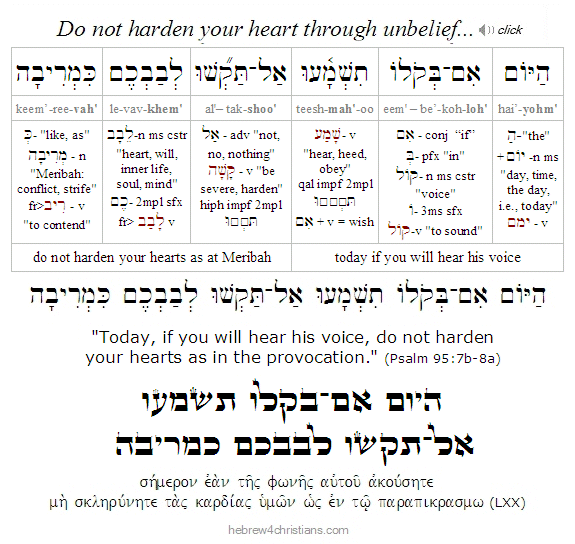 |
 |
Let Go, Let God...

04.17.20 (Nisan 23, 5780) "Cast your burden upon the Lord, and he will sustain you" (Psalm 55:22). It is important to fully appreciate what this means. When you truly "cast your burden upon the Lord," you are insisting on peace of mind, the decision to refuse all worry, and the resolution to let go of your anxieties... When you are tempted to consider trouble, when you hear the whisper of fear within, remember to cast your burden upon the Lord and he will sustain you, for "he will never permit the righteous to be moved..."
But what of unutterable pain or sorrow? What of intractable sickness or irrecoverable loss? What if you cannot express the burden you carry? Then get alone with God and lay your soul bare: the heart has its own voice regardless of the words we are able to articulate. As it is written: בטחוּ בוֹ בכל־עת - "Trust in him at all times… pour out your heart before him; God is a refuge for us" (Psalm 62:8). Let not your heart be troubled; be anxious for nothing; believe that God cares for you (Psalm 42:5; 1 Pet. 5:7). "Cast your burden upon the LORD and He will sustain you; he will never permit the righteous to be moved."
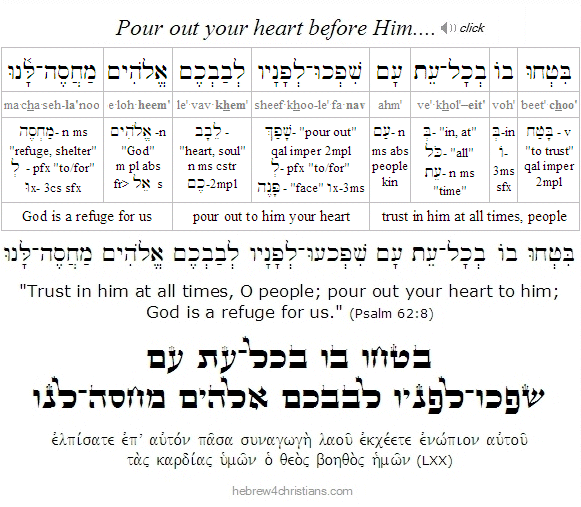 |
 |
Holocaust Memorial Day...
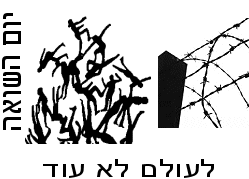
[ Yom HaShoah begins Monday, April 20th (at sundown) and runs through the following day. ]
04.17.20 (Nisan 23, 5780) Shoah (שואה) is the Hebrew word for "ruin" or "destruction" and is another name used to refer to the European Holocaust, when six million Jews - including one and a half million children - were systematically murdered by the Nazis during World War II. After much impassioned debate, in 1953 the Israeli Knesset designated Nisan 27 as Yom HaShoah (יום השואה), or Holocaust Remembrance Day.
During this day, in Israel, a morning siren sounds, all activity stops, and people stand in honor of those who died during the atrocities of those years. Jews around the world hold memorials and vigils, often lighting six candles in honor of the six million Holocaust victims. Many hold name-reading ceremonies to memorialize those who were murdered during the atrocities. !לעולם לא עוד - le'olam lo od: "Never Again!" This year, Yom HaShoah begins Monday, April 20th at sundown and runs through the following day.
"You may know that the last few nights have been bad... Those who had been bombed out came to me the next morning for a bit of comfort. But I am afraid I am bad at comforting; I can listen all right, but I can hardly find anything to say. But it seems to me more important to share someone's distress than to offer smooth words about it... I've no sympathy with some wrong-headed attempts to explain away distress, because instead of being comfort, they are the exact opposite. So I don't try to explain it, and I think that is the right way to begin, though it's only a beginning, and I very seldom get beyond it. I sometimes think that real comfort must break in just as unexpectedly as the distress." - Dietrich Bonhoeffer (martyred April 9, 1945, at the Flossenbürg concentration camp)
About the Armenian Genocide...
I realize that Yom HaShoah (i.e., Holocaust Remembrance Day) is observed this week, but I would be remiss not to mention an earlier genocide of Christians -- mostly Armenians but also Assyrians and Greeks -- that took place under the Islamic Ottoman Empire, throughout World War I, where the Turks systematically massacred approximately 1.5 million Armenians, 300,000 Assyrians, and 750,000 Greeks. Today April 24th is recognized (by some) as "Armenian Genocide Remembrance Day." In Yerevan, the capital of Armenia, hundreds of thousands of people walk to the Tsitsernakaberd Genocide Memorial to lay flowers at the eternal flame. For more see the links listed below.
Note: The problem of fascism is not restricted to the terrors of Nazi Germany nor even worldwide anti-Semitism; no, the problem has a much farther reach and is actually a part of the surveillance state apparatus of today, that is, the ongoing attempts by spurious governments of the world to exploit and enslave their peoples, etc. We must remain vigilant. There is a coming holocaust of the Great Tribulation period wherein a worldwide police state will control the world population and exterminate all opposition; that day draws ever nearer.
Kaddish and Providence...

[ The following is related to Yom HaShoah, or Holocaust Memorial Day... ]
04.16.20 (Nisan 22, 5780) Since we are required to affirm and to trust that "all things work together for good" (Rom. 8:28), we must bless God for perceived evil as well as for perceived good, since all circumstances of life come from the hand of the LORD our God. Despite appearances that sometimes seem to the contrary, we believe in an all-powerful, supreme LORD who has not abandoned the world, but who actively sustains and upholds it with benevolent intent. "We walk by faith and not by sight" (2 Cor. 5:7). When bad things happen to the righteous, we trust in God's personal care for their ultimate good, despite their present troubles. As the prophet Job said: "Though he slay me, I will trust in Him" (Job 13:15). This is the heart behind the Kaddish, the mourner's prayer, that expresses acceptance of God's world, despite the pain, sorrow, loss, and so on.
The term hashgachah pratit (השׁגחה פרטית) refers to God's personal supervision of our lives (hashgachah means "supervision," and pratit means "individual" or "particular"). Since He is the Master of the Universe, God's supervision reaches to the smallest of details of creation - from subatomic particles to the great motions of the cosmos. God not only calls each star by its own name (Psalm 147:4), but knows each particular lily and sparrow (Matt. 6:28-30, 10:29). Each person created in the likeness of God is therefore under the direct, personal supervision of God Himself -- whether that soul is conscious of that fact or not. As Yeshua said, even the hairs on your head are all numbered (Matt. 10:30). Indeed, the God of Israel is called אלהי הרוּחת לכל־בּשׂר / Elohei ha-ruchot lekhol-basar: "The God of the spirits of all flesh" (Num. 16:22), and that means He is LORD even over those who vainly attempt to suppress His Presence and reality. "Can a man hide himself in secret places so that I cannot see him? declares the LORD. Do I not fill heaven and earth?" (Jer. 23:24).
The Talmud says that when Moses asked God, "Please show me your glory" (Exod. 33:18), he was asking for God's vindication in the light of the gnawing question: "Why do the righteous suffer while the wicked prosper?" Moses was not given an explicit answer, and some of the sages said he wrote the enigmatic Book of Job to demonstrate that the question can only be reduced to God's inscrutable will: "Where were you when I laid the earth's foundation?" (Job 38:4). In other words, the question can only be answered by the One who knows the beginning from the end, the Infinite One who sees the implications and concatenation of all things. As finite beings, we see only a fraction of the big picture, and therefore we must yield our trust to the Wisdom and Power of Almighty God (Deut. 32:4).
It is written, "Your eyes saw me when I was inside the womb; in your scroll were written, every one of them, the days ordained for me before they came into existence" (Psalm 139:16). In light of God's providential ordering of our lives, Blaise Pascal asked, "What is left for us but to unite our will to that of God himself, to will in him, with him, and for him the thing that he has eternally willed in us and for us." The Mishnah says it this way: "Do His will as if it was your will that He may do your will as if it was His will" (Avot 2:4). In other words, what else can we do but learn to trust, accept, and to say "yes" to life -- even if at times we may feel like orphans, lost in a fatherless world... All our days are recorded in God's scroll.
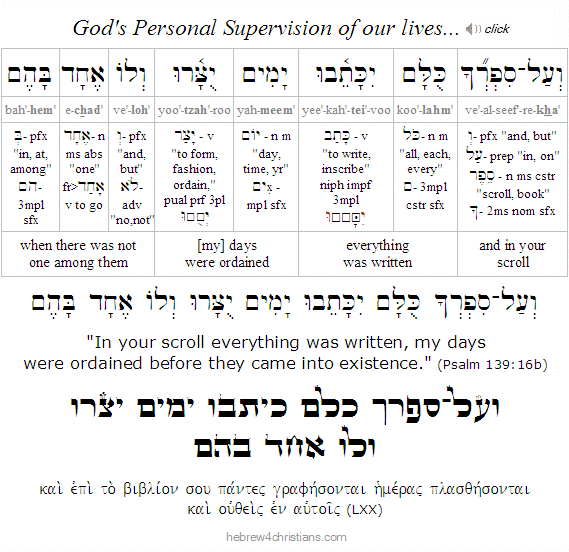 |
Therefore may God "teach us to number our days to get a heart of wisdom" (Psalm 90:12). The sages say on the day of death, one considers one's life as if it had been a single day... Life goes by so quickly, and we never know when our personal Rosh Hashanah will come. "No one knows the day or hour..." That's why it is so vital to be healed and to turn to God while there is still time. So turn to him today and bacharta ba'chayim (בָּחַרְתָּ בַּחַיִּים) - "choose life!" "For this commandment (of turning to God in teshuvah) is not hidden from you, and it is not far away. It is not in heaven... nor across the sea.... Rather, the matter is very near you - in your mouth and your heart - to do it" (Deut. 30:11-14; Rom. 10:8-13).
For more on this, see the meditation entitled "Paradox and Presence."
Keeping Hope Alive...

04.16.20 (Nisan 22, 5780) Many people want healing apart from the cure. How many of us settle for half-measures? While you might find respite for your suffering in temporary measures, you cannot have lasting healing apart from the divine remedy... Nonetheless, the Lord our God gives us special graces, especially in light of the passing of days, with thwarted hope, aching bones, and inner keening for lasting deliverance. This "gift of despondency" helps us to awaken and to reach out to find the Real, the True, the Eternal. Learn to wait; ask God for the wisdom of patience. Between acceptance and anxiety, always choose acceptance. Find hope while waiting...
An old Jewish prayer, uttered somewhat wistfully, begins, "O Lord, I know that Thou wilt help us; but wilt Thou help us before Thou wilt help us?" It's not always easy to wait for God, especially when we are in pain or anxiety, but we must never, ever, give up; we must never ever, abandon our heart's longing for ultimate healing. Faith exercises hope in the Reality, Substance, and Being (ὑπόστασις) of the Invisible and is made captive to undying hope (Heb. 11:1). Therefore the Spirit cries out: "Wait for the LORD: be steadfast and he will strengthen your heart; and again, wait for the LORD" (Psalm 27:14).
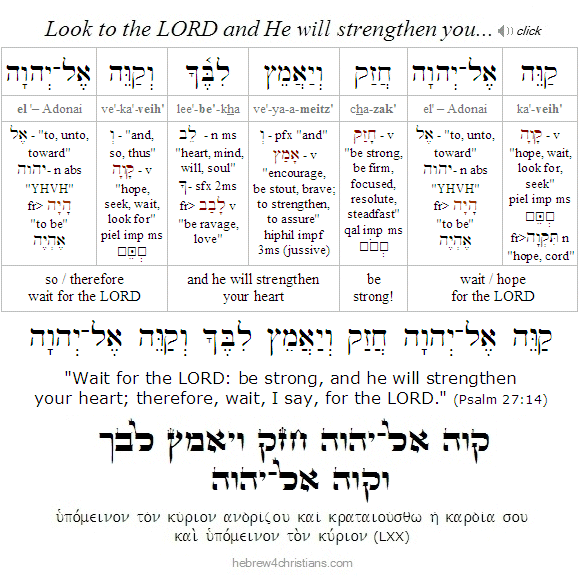 |
"Grant, Almighty God, that since thou art pleased kindly to invite us to thyself, and hast consecrated thy word for our salvation, O grant that we may willingly, and from the heart, obey thee, and become so teachable, that what thou hast designed for our salvation may not turn to our perdition; but may that incorruptible seed by which thou dost regenerate us into a hope of the celestial life so drive its roots into our hearts, and bring forth fruit, that thy name may be glorified; and may we be so planted in the courts of thine house, that we may grow and flourish, and that fruit may appear through the whole course of our life, until we shall at length enjoy that blessed life which is laid up for us in heaven, through Christ our Lord. Amen." (John Calvin: Commentary on Jeremiah and Lamentations)
The Sanctity of Love...
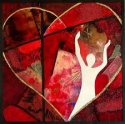
[ The following is related to our Torah reading this week, parashat Shemini... ]
04.16.20 (Nisan 22, 5780) Our Torah portion for this week provides a summary statement about the intent of God's heart for those whom he has called: "For I am the LORD who brought you up out of the land of Egypt to be your God. וִהְיִיתֶם קְדשִׁים כִּי קָדוֹשׁ אָנִי - You shall therefore be holy, for I am holy" (Lev. 11:45, cp. 1 Pet. 2:16). This is repeated throughout Torah: "You shall be holy to me, for I the LORD am holy and have separated you from the peoples, that you should be mine" (Lev. 20:26); "For you are a people holy to the LORD your God, and the LORD has chosen you to be a people for his treasured possession, out of all the peoples who are on the face of the earth" (Deut. 7:6). We are chosen to be a "kingdom of priests," a set-apart people, and a light to the nations (Exod. 19:6; Isa. 42:6; 1 Pet. 2:9). Indeed this is the starting point for all true holiness: to understand that you are beloved of God, cherished and set apart to live in the fellowship of his love...
 |
The Spirit of God speaks to the heart of faith: "I have loved you with an everlasting love; therefore with lovingkindness I have drawn you" (Jer. 31:3). Note that the word translated "I have drawn you" comes from the Hebrew word mashakh (משׁך), meaning to "seize" or "drag away." As Yeshua said, we are pursued by God's love, and he will haunt us until we surrender to his will (John 6:44). As we look to Yeshua, as we lean on him, God will reveal more of himself to us. He gives us the grace and strength we need; he is always enough...
Seeing the Sacred...

04.16.20 (Nisan 22, 5780) From our Torah reading for this week (i.e, parashat Shemini) we read: "This is the thing that the LORD commanded you to do, so that the glory of the LORD may appear to you" (Lev. 9:6). The sages here comment that if you wish to know if your action is something God wills, then see if leads to the revelation of the glory of God... In other words, "the thing" (זֶה הַדָּבָר) that God wants for us is to behold the Sacred Presence that pervades and upholds all things. Indeed the Hebrew word for seeing, ra'ah (רָאָה) is connected with the word "awe," yarah (יִרְאָה). When we really see life as it is, we will be filled with wonder over the glory of it all. Every bush will be aflame with the Presence of God and the ground we walk upon shall suddenly be perceived as holy (Exod. 3:2-5). Nothing will seem small, trivial, or insignificant. May it please you, O LORD, to so open our eyes... Amen.
A Consuming Fire...

[ The following is related to our Torah reading this week, parashat Shemini... ]
04.15.20 (Nisan 21, 5780) "Nadab and Abihu, the sons of Aaron ... brought strange fire before the LORD" (Lev. 10:1). The sages interpret "strange fire" (i.e., esh zarah: אשׁ זרה) as alien passion or illicit zeal stimulated by artificial means (in this case, drinking wine before their service). The experience of intoxication may seem to elevate the soul, but in reality it muddles the ability to discern spiritual realities: "Drink no wine or strong drink ... when you go into the tent of meeting, lest you die. You are to distinguish between the holy and the common, and between the unclean and the clean" (Lev. 10:9-10). Nadab and Abihu were highly honored in Israel, the first priests of God, and if they drank wine before entering the sanctuary it was surely not for crass purposes, but rather to "sanctify" their experience, or so they thought... They were severely judged, however, because they presumptuously sought to sanctify themselves by means of an artificial influence, and this made them "strange" before God. Likewise many people today seek "spiritual highs" and "signs" without undergoing the discipline of Torah study, prayer, meditation, and so on. God wants our hearts in service, but our hearts must be honest and reverent before Him.
"Nadab and Abihu, the sons of Aaron ... brought strange fire ... and they died before the LORD" (Lev. 10:1-2). It is a fearful thing to fall into the hands of the Living God who is "a Consuming Fire, a jealous God (Deut. 4:24). Indeed, though atonement was provided under the law for every kind of sin and transgression, there was one exception: "But the soul that sins presumptuously (ביד רמה) shall be out off from the midst of my people" (Num. 15:30). We must be careful not to casually regard God's truth with undue familiarity, lest we find ourselves under the influence of strange passions that lead to presumption....
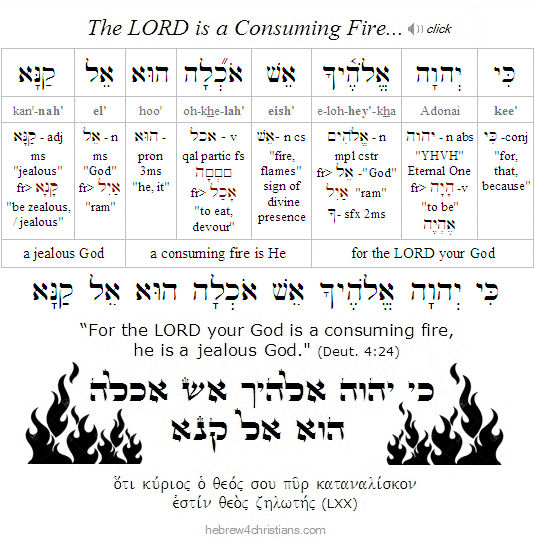 |
Note: "Now these things happened to them as an example, but they were written down for our instruction, on whom the end of the ages has come" (1 Cor. 10:11). It is astounding that during the very time that the Tabernacle was inaugurated, tragedy struck and Aaron's two sons were killed. This should warn those teachers who speak casually of God from the pulpit, since they act profanely and encroach upon the Divine Presence. Let us be admonished, friends and honor the Living God: Da lifne mi attah omed: "Know before Whom you stand!"
The Gospel of Surrender...
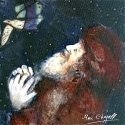
04.15.20 (Nisan 21, 5780) Yeshua solemnly warned those who professed faith: "Not everyone who says to me, 'Lord, Lord,' will enter the kingdom of heaven, but the one who does the will of my Father who is in heaven. On that day many will say to me, 'Lord, Lord, did we not prophesy in your name, and cast out demons in your name, and do many mighty works in your name?' And then will I declare to them, 'I never knew you; depart from me, you workers of lawlessness'" (Matt. 7:21-23). Despite the practice and profession of their faith, these people were essentially strangers to God... They had a false sense of assurance, believing that they were "serving God" while they really were not... In light of this dreadful possibility, the crucial question here is whether Yeshua truly knows you. You may know a lot about God, religion, spirituality, and yet you may remain unknown by him... So where do you find life? What are you loving? Where are you going?
The call to follow Yeshua implies surrendering your entire being in service to him; it is a radical decision that will affect every aspect of your life, leading you to "die to yourself" and to undergo the crucifixion of your world. Following Yeshua marks the end of your life on your own terms, submitting yourself to him as "my Lord and my God" (John 20:28). As Bonhoeffer once wrote, "When Christ calls a man, he bids him come and die" (Cost of Discipleship).
From a "natural" point of view following Yeshua is quite impossible, since the "flesh" (i.e., the principle of autonomous self-life) is hostile to the authority of God and intractably refuses to yield to God's will (Rom. 8:7). Indeed the "carnal" or "natural" self is inherently selfish and unable to free itself from its enslaving and self-serving impulses. As it is written, "The heart is deceitful above all things, and incurably sick; who can understand it?" (Jer. 17:9).
The miracle of grace (נס החסד), on the other hand, occurs when what is impossible for man is made possible by God's intervention, that is, when a spiritually dead heart is somehow enabled to genuinely first apprehend and then to respond to spiritual reality. This "divine encounter" is more than merely acknowledging the truth intellectually but involves surrendering to God from the heart - turning your will and your life over to the care and direction of God in trust. Again this is a matter of the heart - surrendering to God's authority, presence, and love... This is how we find Reality – by turning to the truth (teshuvah) and accepting its terms. As we receive God's love, as we embrace it as our own, the truth of Messiah becomes inwardly visible. This comes from a place of surrender and acceptance. As Paul Tillich said, "Sometimes in a moment of weakness light breaks into darkness, and it is as though a voice says, 'You are accepted; you are accepted... Do not seek for anything; do not perform anything; do not intend anything. Simply accept the fact that you are accepted.' If that happens to you, then you experience grace, and everything will be transformed."
Such a miracle may happen suddenly (as an epiphany or radical transformation) but more often it occurs as a "slow-motion" realization, an increasing awareness that turns to settled conviction that God is real and is knowable within your heart. In either case, however, the "flesh dies hard," and therefore it is an ongoing struggle to surrender to God's will (Gal. 5:17; Rom. 7:15-25). Often we learn by revisiting waste places of our lives, becoming "sick of our sickness," and finally letting go of the old ways of coping with our fear and pain....
For many people the idea of personal Savior who loves us, forgives us, and promises us healing is comforting, but they may struggle to submit to God's authority and yield to Him as the LORD in their daily lives. They may accept "the LORD" as an abstract concept, though the idea of Adonai (אדני), literally "my LORD," suddenly makes the issue intensely personal.
Dietrich Bonhoeffer once said that "only those who believe obey, and only those who obey believe," though it is important to understand that the obedience spoken of is not to the law of God - since no one can keep the law perfectly - but instead refers to the obedience of faith itself, that is to trust that God is "for you" and is your Healer (John 6:29). Indeed the very first word of the Ten Commandments is to believe that the LORD is your God -- to accept the message of hope and to believe in your personal deliverance from bondage (Exod. 20:2).
Following Yeshua is not a sort of "moral reformation" or self-improvement program to make us acceptable to God. Yeshua did not die on the cross so that we could become followers of the rabbis... No! He is LORD and Master and we find salvation in His acts of deliverance done on our behalf and for our benefit. The temptation is always to go back to the law of sin and death (i.e., the principle of self-justification), but as Luther once said, "The sin underneath all our sins is the lie of the serpent that we cannot trust the love and grace of Christ and that we must take matters into our own hands." In other words, whenever we emphasize the role of our obedience to the law we implicitly impugn the righteousness of God that justifies the ungodly and who alone can transform the human heart... The focus must be on Yeshua.
On the other hand, Yeshua did not suffer and die a bloody and incomprehensibly painful death upon the cross so that we would regard our sins lightly or to minimize their offence before heaven. Indeed regarding grace as something "cheap" is an affront to great price God paid for our healing remedy. We must find a balance here, as Bonhoeffer also said: "The truth is that so long as we hold both sides of the proposition together they contain nothing inconsistent with right belief, but as soon as one is divorced from the other, it is bound to prove a stumbling block. 'Only those who believe obey' is what we say to that part of a believer's soul which obeys, and 'only those who obey believe' is what we say to that part of the soul of the obedient which believes. If the first half of the proposition stands alone, the believer is exposed to the danger of cheap grace, which is another word for damnation. If the second half stands alone, the believer is exposed to the danger of salvation through works, which is also another word for damnation" (Cost of Discipleship). Yes, balance is essential.
"If you confess with your mouth that Yeshua is LORD and believe in your heart that God raised him from the dead, you will be saved" (Rom. 10:9). Confessing that Yeshua is the LORD (ישוע הוא יהוה) means affirming that he is God the Savior (אלוהים המושיע), the LORD of Glory (מלך הכּבוד) before whom every knee shall bow and every tongue shall confess (see Isa. 45:22-23; Rom. 14:11; Phil. 2:10). As Thomas confessed before the resurrected Savior: אדני ואלהי - "You are my Lord and my God" (John 20:28). Indeed Yeshua is the Creator and Sustainer of Reality, the Source of Life, and the true Judge and Moral Authority (John 1:3-2; Heb. 1:3; Isa. 33:22; John 5:22). And because he is the LORD, your LORD - Adonai (אדני) - you are to surrender to his authority and serve him b'khol levavkah - "with all your heart," as it is written: "And now, Israel, what does the LORD your God require of you, but to fear the LORD your God, to walk in all his ways, to love him, to serve the LORD your God with all your heart and with all your soul, and to keep the commandments and statutes of the LORD, which I am commanding you today for your good?" (Deut. 10:12-13).
In the Greek New Testament, Yeshua is called ho kurios (ὁ κύριος), "the Lord," the word chosen to translate the original Hebrew word YHVH (יהוה), as well as ho despotes (ὁ δεσπότης), the word chosen to translate the Hebrew word Adonai (אדני). Yeshua is the Sole Sovereign (ריבונו של עולם), the "Most High" or Ascended God (אל עליון), the King of Kings (מלך המלכים), the LORD of Lords (אדני האדנים), the God of gods (אלהי האלהים), the Shepherd of Israel (רעה ישׂראל), the true Judge (השופט), the Governor of Reality (מושל היקום), the Holy One (קדושׁ ישׂראל), the Redeemer of Israel (גואל ישׂראל), the God who is with us (עמנו אל), the Light of the world (אוֹר העולם), the Prince of Peace (שׂר־שׁלום), the Mighty God (אל גבור), the Everlasting Father (אביעד), and so on.
Followers of the LORD are called avdei YHVH (עבדי יהוה), that is, "servants (or slaves) of the LORD." In the Greek New Testament they are called douloi kurios (δοῦλοι κύριος). Both terms imply being entirely subject to the LORD as a "purchased" (i.e., redeemed) slave is subject to a master. The analogue is the Exodus from Egypt: God redeems his people from slavery to dark powers so that they could serve Him in the light and blessing of His presence. The redemption from Egypt led directly to the revelation at Sinai where we are taught the meaning of freedom as our personal responsibility to live according to the truth. However, we were also taught something else, namely that the revelation of the moral law of God revealed our need for a deeper deliverance - not from external conditions of oppression (Pharaoh) but from the oppression and impulses of our own egos. The tragedy of the Golden Calf and the image of the broken tablets reveals the shattered state of our lives. The message of the gospel (implicit in the Mishkan and the sacrificial system) is that God heals those who cannot heal themselves, for it was blood given by God that was used for our atonement upon the altar. The curse of the law (i.e., tochechah: תוֹכֵחָה) reveals the severity of our need for a Deliverer - not just from captivity to external forces, but more radically from the inner hell of the heart. The law which is "holy and just and good" reflects the despair of ourselves.
Now some Christians have fallen into the error of promoting "grace" as a form of resignation that reasons that since we cannot heal ourselves, we must remain unhealed - and yet such passivity effectually denies the instrumentality of grace as it works within the heart to transform and sanctify our character... We must remember that the sanctifying power of the God will make a real difference in the way we live our lives. Redemption is therefore an ongoing passion. We were redeemed from bondage only to be shown our inability to live without God's blessing and strength, and therefore we need redemption from our inner corruption by means of God's grace. Therefore Yeshua said to his followers, "I no longer call you slaves (δούλοι) but friends (φίλοι), because I have made known to you the heart of the Father (John 15:15). We are set free from the bondage to our sin by Yeshua, and the evidence of this freedom is a new direction, a new way of being. The grace of God - that is, his love working within us - is the means by which we are truly changed. Torah is moved within the heart, which is to say that God's will becomes a matter of our heart connection with Him, trusting in his forgiveness, love, and blessing so that we can serve him in the truth. This is effected by the Holy Spirit who empowers us to do God's will (1 Cor. 2:15). The Greek word "metanoia" (μετάνοια) conveys a similar idea - going "beyond" (i.e., meta: μετά) our everyday thinking (i.e., nous: νοῦς) to apprehend the realm of the sacred, the superlative wonder of existence, and the blessing of life. Teshuvah therefore is an ongoing turning to God for the blessing of life -- a matter of practicing the presence of God by abiding in his love. "Walking in love" changes our focus and direction so that we live in accordance with God's will for our lives.
וְעַתָּה יְהוָה אָבִינוּ אָתָּה
אֲנַחְנוּ הַחֹמֶר וְאַתָּה יֹצְרֵנוּ
וּמַעֲשֵׂה יָדְךָ כֻּלָּנוּ
ve·a·tah · Adonai · a·vee'·noo · a'·tah
a·nach'·noo · ha·cho'·mer · ve·a·tah · yotz·rei'·noo
oo·ma·a·seh · ya·de·kha · koo·la'·noo

"But now, O LORD, you are our Father;
we are the clay, and you are our potter;
we are all the work of your hand."
(Isa. 64:8)

When Yeshua said you must be "born again," he was revealing our need for something beyond the realm of religious practices. This "something" is the righteousness of God that is "apart from the law" - a saving grace - that delivers us from ourselves.... We take hold of this righteousness when we confess our great need for God's salvation given in Yeshua. The first step is that of faith, looking to God for healing from our sickness unto death. "As Moses lifted up the serpent (נחשׁ נחשׁת) in the wilderness, so must the Son of Man be lifted up, that whoever believes in him may have eternal life" (John 3:14-15). Humanity as a whole has been "bitten by the snake" and needs to be delivered from its deadly venom. Just as the image made in the likeness of the destroying snake was lifted up for Israel's healing, so the One made in the likeness of sinful flesh was to be lifted up as the Healer of the world (Rom. 8:3). All we need to do is "look up and believe..."
The Spirit of God cries out, bacharta ba'chayim! - "Choose life - that you may live! For this commandment [i.e., choosing life] is not too hard for you; nor is it beyond your reach: it is very near to you - as close as your breath and as near as your heart (Deut. 30:11-14). You must "choose life," which which implies that is your personal responsibility to believe in the Reality of God, to trust in his providential care for your life, to affirm that "all is well and all manner of thing shall be well" for you, and to understand that your present struggle is designed by heaven to help you grow in grace and the knowledge of the truth (1 Pet. 3:16). All things work for our good (Rom. 8:28) and therefore "choose life" both in happier moments when all goes well, but also (and especially) in the midst of our afflictions, in the panting of our hearts for deliverance, in the loneliness of our heartaches, and in the laments of our soul over the pain of our sins. Faith courageously refuses the messages of fear, silences angry voices of this world, and resists the idols of the age that offer spurious respite from the struggle at hand... "If we live by the Spirit let us also walk in the Spirit" (Gal. 5:25). When you ask God to help you choose life, what are you doing if you are not asking God to grant you the ability to believe in the miracle of love? Choosing life involves the surrender of your heart and your will to the promise of God, choosing to receive the blessing of the Divine Presence – his word, his promise, and his healing – and resolutely deciding to live in light of that hope today. Dear friend, may you choose life this very hour...
 |
The Fear of the LORD...
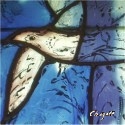
04.14.20 (Nisan 20, 5780) Some people are afraid that God will punish them for their sins, but the true fear of God, yirat shamayim (יִרְאָת שָׁמַיִם), is the tragedy of losing our closeness to Him... This is the fear of the Lord. The sages note that where it is written, "What does the LORD ask of you except to fear the LORD" (Deut. 10:12), we should read instead, "fear with the LORD" (לְיִרְאָה אֶת־יְהוָה), that is, we share his concern that we could forfeit the sanctity of a heart-relationship with Him due to carelessness and sin... We fear our sin because it blinds us from awareness of God's care and love. The fear of God can therefore be understood as God's fear that we will miss the blessing of intimately knowing him.
Similarly, where we read: "You shall be holy, for I, the LORD your God am holy" (Lev. 11:44; 19:2; 20:7; 20:26; 1 Pet. 1:15-16), understand that the Lord is grieved when we do not esteem ourselves and our lives as sacred, as "set apart" and of infinite importance... How else can we even begin to apprehend the sanctity of God and others if we do not simultaneously realize that we are set apart to be sacred? This is not ego-worship but the sober truth of the Spirit: we are to respect our lives and esteem them as sacred, since God has elevated us to be his children by means of the gift of Yeshua our Messiah...
Though most sages say that the greatest principle of Torah is to love your neighbor as yourself, Ben Azzai said that even greater is believing that God created human beings in His likeness (בִּדְמוּת), since then one cannot say, "Since I despise myself I can despise another as well; since I curse myself, let the other be accursed as well." Being made in God's likeness implies that how we regard ourselves and others is the same measure we regard God Himself (1 John 4:20). Therefore the first commandment is always, "I am the LORD thy God..." (Exod. 20:2), since apart from faith, there is no Torah of any kind....
The LORD has promised to never leave nor forsake us, though we can choose to turn away from his love and care for our lives... We are not permitted to fear other than that we have no fear of God, for that indeed is a fearful state of soul. May it please God to help each us never to leave nor forsake ourselves by choosing to become lost, by forgetting what is real, and by abandoning hope in the miracle for our lives... May the LORD help us not be grieved, not to hurt ourselves, and never to abandon our hearts to the despair of shame.
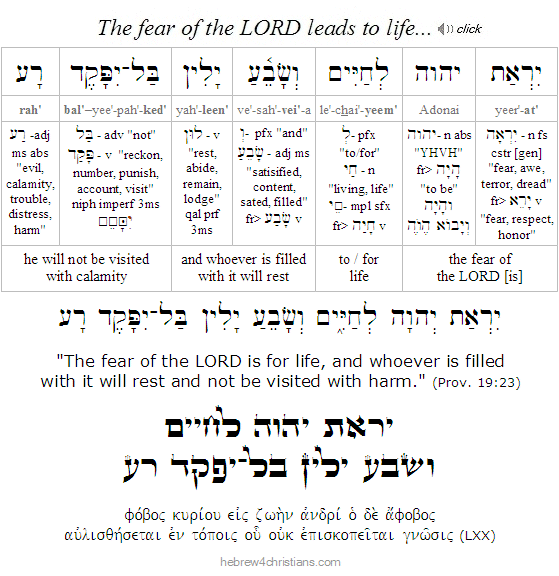 |
 |
Suffering and Deliverance...
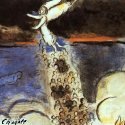
04.14.20 (Nisan 20, 5780) Sometimes suffering comes not from any lack of faith, but in the midst of faith, or even because of faith, since the LORD often uses affliction as the means of upbuilding the soul and developing spiritual resilience and maturity (Prov. 3:1-2). In light of God's sovereign power over all things, and God's great love for you, regard your suffering a blessing from your heavenly Father to help you grow (Job 5:17; Psalm 94:12; 119:71). Persevering in the midst of your struggle develops patience and humility, teaching you to know your own nothingness and to utterly rely upon the goodness and mercy of God. Over time, suffering strips away your illusions, so that nothing remains except the naked heart and the treasures of faith. Only then does the heart find its blessing in God alone.
People tend to believe whatever they want to believe until they are faced with reality, and therefore God orchestrates tests and challenges to awaken people from their illusions and to help them realize their need for deliverance. Such afflictions are sometimes called the "troubles of love" (יִסּוּרֵי אַהֲבָה). Thus we read in the Torah how the people groaned because of their slavery and then cried out to heaven for help: "And God heard their groaning; he remembered his covenant ... and God saw the people of Israel, and God knew" (Exod. 2:24-25). God knows our profound need for Him. Affliction teaches us that wishful thinking is unable to sustain the weight of reality, and only God Himself can truly save us...
I am amazed that pagans cling to the idea that their lives have real value despite their rejection of transcendent worth and beauty and goodness as revealed in the Jewish Scriptures. Their everyday assumptions are lifted from the Judeo-Christian tradition, yet their underlying logical and semantic foundation is quite simply an illusion…. I'd like to listen to them justify the reason for getting out of bed in the morning using just the language that is entailed by their metaphysical assumptions. If seriously questioned, especially in light of the traction of their own personal heartache and disappointments, it is doubtless that they, like Nietzsche, would find themselves going insane as they attempt to (re)define the most meaningful aspects of life....
Where it is written, "The troubles of my heart are enlarged; bring me out of my distresses" (Psalm 25:17), we understand that it is God who hems us in and limits us (the word "troubles" (צָרוֹת) derives from a root (צַר) that means to limit or constrict), for the purpose of "bringing us out" of our distresses, just as God brought our ancestors out of "Egypt" (i.e., from mitzrayim: -מ, "from," and צַר, "narrow places") so they could experience freedom and newness of life.. The first step of lasting deliverance (יְשׁוּעָה) is to believe the revelation: "I AM the Lord your God," which begins the healing (Exod. 20:2). We are then set free from our bonds to surface appearances as we trust in God's Presence, since we now understand everything in relationship with the sacred Ground and Source of all life (Acts 17:28).
Regarding the cry of the heart: "How long shall I take counsel in my soul, having sorrow in my heart daily" (Psalm 13:2), the sages remark that just as long as we take counsel in our own soul there will be despair, since only after we realize that no further counsel can help us do we give up and confess our need for God's salvation. Therefore deliverance comes as we trust in the LORD with all our heart, and do not rely on our own understanding (Prov. 3:5).
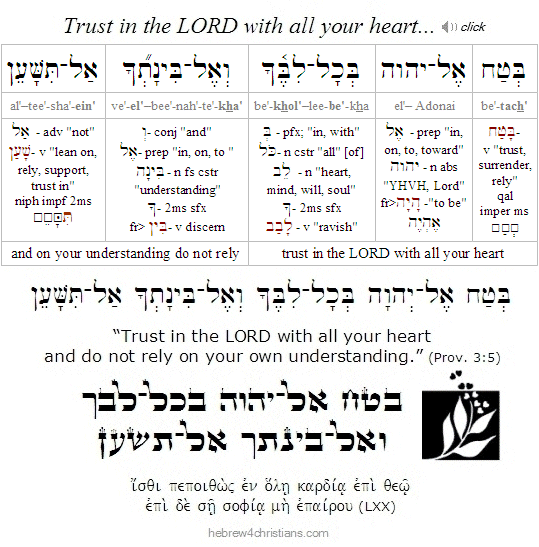 |
 |
Love's Fear and Trembling...
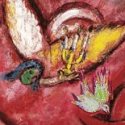
[ During Passover week it is customary to read the ancient "love song" of King Solomon called Shir Ha-Shirim (שִׁיר הַשִּׁירִים), or the "Song of Songs." ]
04.14.20 (Nisan 20, 5780) The gospel reveals God's passion for us, the call of his heart, his desire to elevate us to the role of the beloved, and we respond by accepting Him as the great Lover of our souls, the "ultimate concern" of our life. Sin threatens to seduce us away from God's love, to interfere with our relationship, which evokes God's "jealousy" to protect love from loss. It is written that "perfect love casts out fear" (1 John 4:18), but perfect love (τελεία ἀγάπη) must be "perfect," that is, reciprocal, complete, consummated, and alive with passion. In Hebrew, perfect love is "shalem" - that is, whole, healed, and unified (אַהֲבָה שְׁלֵמָה). Perfect love is both given and received... It is not "perfect love" to objectively accept that God loves you in Jesus. No, you must receive this as an inward passion, you must live within it, must embrace it, take possession of it, and let it fill your heart to abundance. This love, this "perfect love," then will cast away your fear of being unwanted, rejected, and abandoned. But to know this love, you have to open your heart and accept it as your own; you have to accept yourself as the beloved of God:
אֲנִי לְדוֹדִי וְעָלַי תְּשׁוּקָתוֹ
a·nee · le·do·dee · ve·a·lai · te·shoo·ka·to

"I am my beloved's, and his desire is for me"
(Song 7:10)

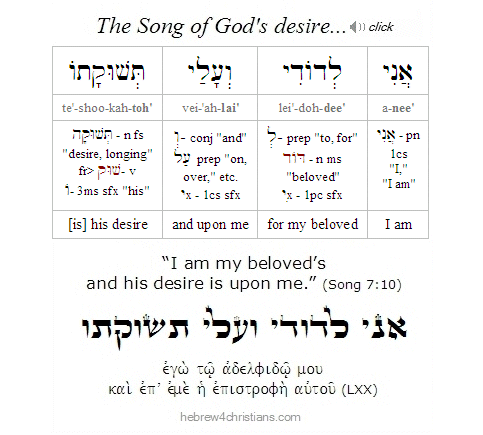
I realize the analogy of God as the great "Lover of our Souls" is ideal for most of us, and yet it is vital that we understand ourselves as the "beloved" of the Lord...
The Meaning of Holiness...

04.14.20 (Nisan 20, 5780) "For I am the LORD who brought you up out of the land of Egypt to be your God. You shall therefore be holy, for I am holy" (Lev. 11:45). Because we are God's people, his redeemed children, we should be holy, just as God is holy (1 Pet. 1:15-16). Holiness, however, is not a matter of what you do (such as wrapping yourself in religious rituals) but instead is a matter of what you "allow" to happen: You let go and allow yourself to be rescued and taken up from the "depths of Egypt" to be with God. Holiness is something you receive by faith; it is a gift of being "set apart" to be sacred and beloved by God. Genuine holiness (i.e., kedushah) is connected with love and grace...
In Hebrew, the word kedushah (קדושה) means sanctity or "set-apartness" (other Hebrew words that use this root include kadosh (holy), Kiddush (sanctifying the wine), Kaddish (sanctifying the Name), kiddushin (the ring ceremony at a marriage), and so on). Kadosh connotes the sphere of the sacred that is radically separate from all that is sinful and profane. As such, it is lofty and elevated (Isa. 57:15), beyond all comparison and utterly unique (Isa. 40:25), entirely righteous (Isa. 5:16), glorious and awesome (Psalm 99:3), full of light and power (Isa. 10:7), and is chosen and favored as God's own (Ezek. 22:26).
 |
After the LORD split the sea and led his people across, Israel sang a song of praise to Him. Shirat Hayam (שירת הים), or "the Song of the Sea," is a song of praise and thanks for the loving deliverance given by the LORD (Exod. 15:1-21). "The LORD is my strength and my song (עזי וזמרת יה), and he has become my salvation (ויהי־לי לישׁועה); this is my God, and I will praise him, my father's God, and I will exalt him..." "Who is like you, O LORD, among the gods (מי־כמכה בּאלם יהוה)? Who is like you, majestic in holiness, awesome in glorious deeds, doing wonders? You have led in your steadfast love the people whom you have redeemed; you have guided them by your strength to your holy abode... You will bring them in and plant them on your own mountain, the place, O LORD, which you have made for your abode, the sanctuary, O Lord, which your hands have established."
Note further that the opening statement, "Then they sang" is actually in the future tense: "Then they will sing," which refers to the coming of Messiah. Indeed, in Revelation 15:3 we read that the song will indeed be sung to the Heavenly Bridegroom in the coming New Jerusalem... Note also that in the closing phrase of the song, "the LORD will reign forever" (Exod. 15:18), the word "will reign" (ימלך) is spelled with a missing Vav, which suggests the Messiah Yeshua. The LORD will indeed reign when the rightful heir to the throne of David and the true King of Israel soon appears. Then shall we be with our Beloved forever and ever.
 |
Irrepressible Creation...

04.13.20 (Nisan 19, 5780) The cosmological dogma that the universe somehow was caused by an enormous (and yet inexplicable) explosion several billions of years ago (i.e., the "big bang") is routinely accepted by people today, though such a theory cannot explain what caused the big bang itself, nor can it explainwhy is there something rather than nothing at all... Moreover, whereas scientific cosmology "omnisciently" claims that the universe came into existence without a discernible reason, that is, groundlessly or without rational warrant, it is somehow considered "irrational" to believe that a personal and transcendental Power created the world for the sake of revealing the divine love and glory to mankind. In light of this, it is helpful to remember that genuine science involves observation and measurement, and whenever cosmologists extrapolate beyond empirical evidence to explain the origin of the universe, they are creating a myth or a model that is every bit as religious as those who believe God created the universe yesh me'ayin, "out of nothing."
הַשָּׁמַיִם מְסַפְּרִים כְּבוֹד־אֵל
וּמַעֲשֵׂה יָדָיו מַגִּיד הָרָקִיעַ
יוֹם לְיוֹם יַבִּיעַ אמֶר
וְלַיְלָה לְּלַיְלָה יְחַוֶּה־דָּעַת
ha-sha·ma'·yeem · me·sa·pe·reem · ke·vohd - el
oo·ma·a·seh · ya·dav · ma·geed · ha·ra·kee'·a
yohm · le·yohm · ya·bee'·a · o'·mer
ve·lai'·la · le·lai'·la · ye·cha·veh - da'·at

"The heavens recount the glory of God,
and the sky above proclaims the work of His hands.
Day after day it speaks out;
night after night it reveals His greatness."
(Psalm 19:1-2)
Download Study Card

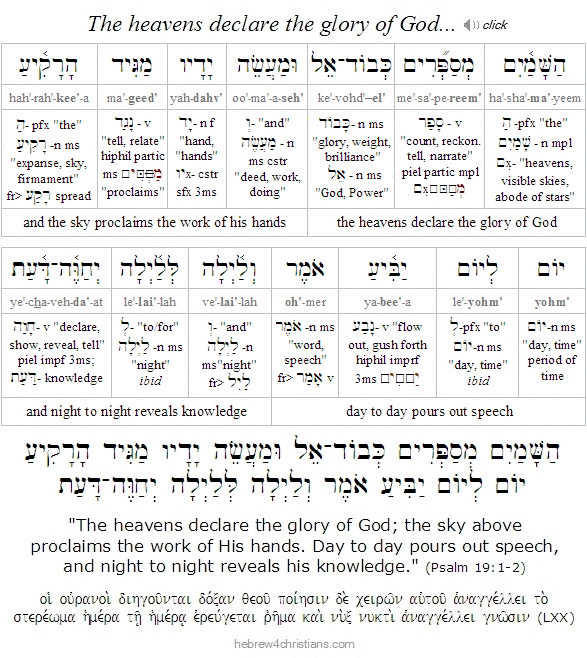
Simple logic reveals that the universe had a beginning, since it is impossible to traverse an infinite number of moments to arrive at a present moment... Since the universe is indeed present, therefore it necessarily had a beginning. The question of the origin of the universe therefore leads to "inference to the best explanation." On the assumption that the Torah is true, what would we expect to see in light of human history and its values, of good and evil, of love, beauty and truth, and so on? The objections raised to a personal Creator and King are moral more than they are intellectual. It is a matter of the will, not of the evidence itself. There is plenty of "junk science" in the world today that purports to substantiate godlessness. The LORD is revealed intuitively within each human soul, and the impression of the Divine nature is indelibly written on the human heart. As it is written, "God's eternal power and divine nature from the creation of the world are understood through what has been made, so people are without excuse" (Rom 1:20).
If the devil can't kill you, he will try to make you insane... He will lie to you about who you really are... He will harass you and vex your soul; he will whisper fearful things in your ear... He will make what is small seem big and what is big seem small. He will raise dark suspicion within your soul, causing you to draw back in worry. He will remind you of your sins to make you feel ashamed, dirty, and unwelcome. He will hiss that you are unlovable and unworthy. He will argue on behalf of your flesh that you deserve better than this... He will tempt you to seek relief in cisterns of emptiness and futility. Most of all, he will try to cast a spell to make you forget that you are truly a prince or princess of God Almighty... The devil seeks to drive you into the exile of loneliness and despair. Resist him in the Name of the LORD!
Faith affirms that meaning is real, comes from God, and that each of us has eternal significance in the eyes of heaven... Faith sees the hidden beauty and truth of the invisible (חַיֵּי עוֹלָם), the underlying substance (ὑπόστασις) of hope, and the conviction of unseen and everlasting good (Heb. 11:1). Faith overcomes the power of the lie as light vanquishes darkness.
Note: For more on this, see the article, "Irrepressible Creation."
 |
Sufficient unto the day...
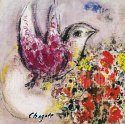
04.13.20 (Nisan 19, 5780) Who among us has not experienced loss? While we cannot escape suffering in this life, God can give us heart to face the struggle... "You shall love the LORD thy God will all thy heart – particularly while you are in the midst of bewilderment, testing, and affliction. As the prophet Job once exclaimed, "The LORD gave and the LORD has taken away; may the Name of the LORD be blessed."
יְהוָה נָתַן וַיהוָה לָקָח
יְהִי שֵׁם יְהוָה מְברָך
Adonai · na·tahn · vadonai · la·kach
ye·hee · shem · Adonai · mei·vo·rakh

"The LORD gave and the LORD has taken away;
may the Name of the LORD be blessed."
(Job 1:21)
Hebrew Study Card

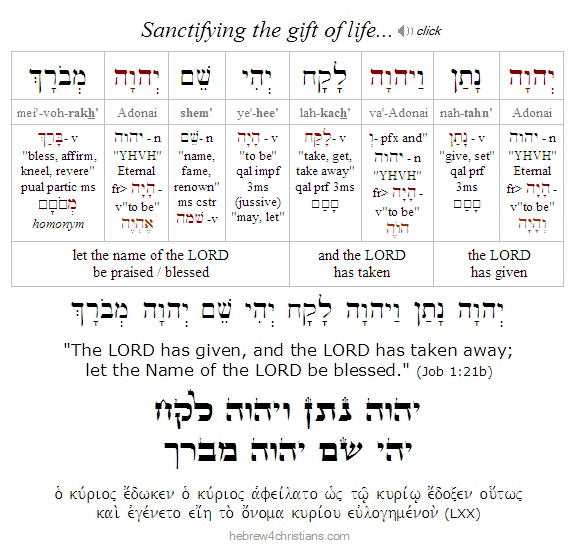
We had nothing when we were born into this world, and all that we now have was given to us by hashgachah pratit (השׁגחה פרטית) - the providential plan of God for our lives. As the LORD graciously gave, so He has the prerogative to take away. Pain, suffering, and even death itself surely do not come by accident but are rather part of the inscrutable will of God, who works all things together for the good of creation. Gam zu l'tova – this too is "for the good," even if the good is not revealed in the moment. Job refused to blame God for his troubles, but instead he understood that whatever God does (or allows) must itself good, and there is no reason to doubt this, even if in the present there is tribulation – indeed, even the throes of death. "Every good gift and every perfect gift is from above, coming down from the Father of the heavenly lights, with whom there is no variation or shadow due to change" (James 1:17). As it is written, lo yimna-tov laholekhim be'tamim (לא ימנע־טוב להֹלכים בתמים), "no good thing does he withhold from those who walk in completeness" (Psalm 84:11), and you are made complete (תמים) because of the finished work of Messiah on your behalf. Do not be afraid of His providence: no good thing will the LORD withhold from you.
When Paul wrote, "in everything give thanks" (1 Thess 5:18), surely he understood the prospect of real suffering. It is through "much tribulation" that we enter the kingdom of God (Acts 14:22). We do not ask God to insulate us from all troubles, but rather to be given the courage to carry on despite the troubles. Hence one of our standard prayers in the tradition is: בָּרוּךְ אַתָּה יהוה הַנּוֹתֵּן לַיָּעֵף כּחַ / barukh attah Adonai ha'noten lai'ya'ef koach: "Blessed are You, LORD, who gives strength to the weak."
We cannot escape suffering in this life, but God gives us heart to face the struggle. Each day contains the opportunity to serve God even in the midst of trouble (Matt. 6:34). We cannot control much of what happens to us in this life, so our task is to sanctify time and trust that God will see to our true needs. Taking refuge in God means personally trusting in His goodness for your soul, despite circumstances that might tempt you to lose heart.
Addendum on "Mother Nature"
"Mother Nature" is a metaphor often used by godless people who want to suppress the truth about spiritual and moral reality. You are not a physical being randomly living in a "natural" world that inexplicably came into being eons ago by an impersonal "big bang" (and that has no real purpose or goal but is based on impersonal and random physical processes); no, you are a spiritual being living in an intensely conscious universe that was created and is being sustained and upheld by means of Divine Power (Rom. 1:20; Psalm 19:1-3). Honest science is all about empirical measurement, and beyond that it is nothing but metaphysics on par with mythology or some primal cosmology such as Anaximenes' view that "everything is hot air." People have intuitive apprehension of the existence and reality of God and moral truth. It is impossible to deny moral truth and reality without stultifying your thinking and being an irrationalist. People who poetically say "Mother Nature" is behind the facade of the physical world are confessing that they cannot do without a sense of teleology and purpose despite their hopeless metaphysical faith.
Of course science itself is a faith system that believes (among other things) that the future will "resemble" the past (i.e., natural processes are "uniform"); that there is an external world that is knowable to the human mind; that measurement "makes traction" with this external world; that it is "good" to know rather than not to know; that the scientific method is a good way to create inductive inferences, etc. Note that each of these things is not based on science itself, but is brought to science as an assumption. In other words, science is a system of faith in the order of reality, etc.
The eschatology of the Scriptures strongly states that God is the LORD of "nature" and that all possible worlds and future events are under His sovereign control. One day the stars will "fall from the heavens" and the world as we know it will be "melted with fervent heat, forever dissolved: "The sun shall be turned to darkness, and the moon to blood, before the great and awesome day of the LORD comes" (בּוֹא יוֹם יְהוָה הַגָּדוֹל וְהַנּוֹרָא; Joel 2:31). "The day of the Lord (יוֹם יהוה) will come like a thief, and then the heavens will pass away with a roar, and the heavenly bodies will be burned up and dissolved, and the earth and the works that are done on it will be exposed" (1 Pet. 3:10). "The earth quakes before them; the heavens tremble. The sun and the moon are darkened, and the stars withdraw their shining. The LORD utters his voice before his army, for his camp is exceedingly great; he who executes his word is powerful. For the day of the LORD is great and very awesome (כּי־גָדוֹל יוֹם־יְהוָה וְנוֹרָא מְאֹד); who can endure it?" (Joel 2:10-11).
 |
A Real Savior for Real Sinners...

04.13.20 (Nisan 19, 5780) Why do we pretend that we aren't incorrigible sinners in need of a miracle? Why do we have trouble admitting the truth about our great need? The Scriptures admonish: "Confess your faults one to another, and pray one for another, that you may be healed. The prayer of a righteous person has great effectiveness" (James 5:16). Notice that the prayer of the righteous is effective because it is grounded in reality. "Confession" (i.e., ὁμολογία) means forsaking pretense by accepting the truth about yourself; it means "saying the same thing" (ὁμολογέω) that reality reveals... It has been said that we are only as sick as the secrets we keep. The LORD is called "the God of Truth" and the Spirit of Truth (רוח האמת) testifies to the honest of heart... God does not encounter fictional sinners, but only real and awful ones... He is not interested in the "outside of the cup" as much as what the cup contains, that is, with the inner recesses of the heart. If you haven't discovered how difficult obedience is, then you've but trifled with the idea of obedience. The Savior is not merely a "helper" who enables us to "keep it together," but rather is the One who delivers us from the real, grievous, and most damnable of iniquities by means of the intervention of his Divine Power. The seriousness of our condition is measured by the seriousness of its cure - the sacrifice of God the Son upon the cross for our sins.
לֵב טָהוֹר בְּרָא־לִי אֱלהִים
וְרוּחַ נָכוֹן חַדֵּשׁ בְּקִרְבִּי
lev · ta·hor · be·ra -lee · e·lo·heem
ve·roo'·ach · na·khon · cha·deish · be·keer·bee

"Create for me a pure heart, O God,
and renew a right spirit within me"
(Psalm 51:10)
Hebrew Study Card


When King David cried out to the Lord, "Create in me a clean heart, O God" (Psalm 51:10) he did not use the Hebrew verb yatzar (יצר), which means to "fashion" or "form" something from pre-existing material (Gen. 2:7), but he instead used the word bara (ברא), a verb exclusively used to refer to God's direct creation of the cosmos (Gen 1:1). In other words, David understood that no amount of reformation of his character would be enough, and therefore he appealed to that very power of God that alone could create yesh me'ayin (יש מאין) or "out of nothing." Such was the nature of the remedy required.
O Blessed Fault...
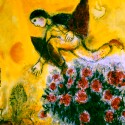
04.12.20 (Nisan 18, 5780) "O LORD, is it possible to really change? There is so much of me that is in need of help, I know not where to begin. Not just my past, O God, but my present hour is haunted by frailty and failure. Is there any likelihood that tomorrow will find me stronger, more righteous, or more reconciled with you? No, for you won't love me any more that you do right now, and you are always enough... Help me, then, to abide in your love, trusting that you will do within my heart what I am unable (or unwilling) to do for myself. And even if tomorrow I should repeat the same old sins, help me understand that you love me just the same, and that you will never give up on me; you will never repudiate me. Help me to know that your love is stronger than the sickness of my sin. Amen."
כִּי־פְשָׁעַי אֲנִי אֵדָע
וְחַטָּאתִי נֶגְדִּי תָמִיד
kee · fe·sha·ai · a·nee · ei·da'
ve·cha·ta·tee · neg·dee · ta·meed

"For I acknowlege my transgressions,
and my sin is ever before me."
(Psalm 51:3)

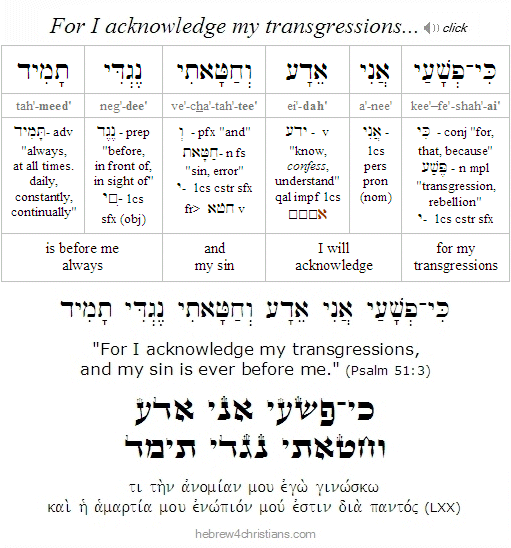
O blessed fault - the dread sin that breaks my heart before the LORD... Were it not for anguish of heart, how would I have sought the solace and healing of my Savior? Sorrow was God's messenger to my need. The fault of my sin occasioned God's mercy and grace, "for where sin abounded, grace did much more abound" (Rom. 5:20). The law was given by Moses, but love and faithfulness (חֶסֶד וֶאֱמֶת) come through Yeshua our Messiah (John 1:17).
In tears a man once confessed a sin to the Rabbi of Apt and told him how he atoned for it. The tzaddik laughed. The man went on to tell what more he intended doing to atone for his sin, and the rabbi kept on laughing. The man wanted to continue, but the laughter robbed him of the power to speak. He stared at the tzaddik in horror. And then his soul held its breath, and he heard a voice deep within. He realized how trivial all his fuss about atoning had been, and instead he turned to God...
Because Yeshua sacrificed Himself for our sins on the cross, the question no longer concerns what we must do to find atonement through religious rites or acts of penitence -- as if these might somehow assuage or propitiate God's disappointment over our sin. No, the remedy is far more profound and costly, and only God Himself could pay the price for our atonement. But because of Yeshua, we now may simply turn to God for the love and healing we so desperately need... This is the meaning of teshuvah. God has made the way for us to be received, loved, and accepted - despite the stain of our sins (Heb. 9:11-28). Yeshua paid the penalty for your sins, and the only real question remains: Will you believe it? Will you accept that you are accepted by the love of God?
The Name YHVH means "God is Present" and near, as close as your heart. The LORD is near, even when you feel lost and far away. Turn away from any evil you have done: do not keep it in mind, but instead see it in light of the greater good of God's love, patience, and forgiveness for you... See your sin only in relation to the cross. Resolve today by the power and truth of God's very love to turn away from darkness to His marvelous light.
 |
Parashat Shemini - פרשת שמיני

04.12.20 (Nisan 18, 5780) Happy holidays, chaverim! This week's Torah reading (following Passover) is called parashat Shemini ("eighth"), which continues the account of the seven-day ordination ceremony for the priests (as described earlier in Parashat Tzav). During each of these "seven days of consecration" Moses served as the first High Priest of Israel by offering sacrifices and training Aaron and his sons (i.e., the kohanim or priests) regarding their duties at the mishkan (i.e., "Tabernacle"). On the eighth day however, (i.e., Nisan 1), and just before the anniversary of the Passover, Aaron and his sons began their official responsibilities as Israel's priests. In the midst of the dedication, however, tragedy struck as Aaron's sons Nadav and Abihu took it upon themselves to make their own offering before the Holy of Holies of the tent. Since this was not the prescribed means of offering sacrifice, God considered the incense offered to be "strange fire" (i.e., esh zarah: אשׁ זרה) and both sons were tragically consumed by fire before the LORD (Heb. 10:29,31). Aaron was required to remaine silent as his sons' bodies were removed by his cousins, and Moses then warned Aaron's two remaining sons, Eleazar and Ithamar, not to mourn during this sacred occasion.
The portion includes a list of animals, birds, fish and insects permitted as food, which subsequently provided the framework for Jewish dietary law (i.e., kosher law). The Israelites were permitted to eat any mammal that has both a split hoof and chews its cud (Lev. 11:3). Likewise, only fish that have both scales and fins were to be regarded as kosher. A list of acceptable (i.e., non-predatory) birds was given, along with the commandment not to eat any insects unless they have a pair of jointed legs used for leaping. The dietary laws were intended to sanctify the Israelites by separating them for holiness: "For I am the LORD your God. Consecrate yourselves therefore, and be holy, for I am holy."
Providentially considered, it is no coincidence that the inauguration of the Sanctuary is directly connected to the Passover, since the daily sacrifice of the Lamb (i.e., korban tamid: קרבן תמיד) presented an ongoing memorial of the great Exodus from Egypt. Indeed, consider that the central sacrifice of the Mishkan (i.e., "Tabernacle") was that of a defect-free lamb offered every evening and morning upon the altar in the outer court, along with matzah and a wine offering, signifying the advent of the true Passover Lamb of God given sacrifice for us. This is called "God's Food" in the Torah (Exod. 29:38-42; Num. 28:4-10; John 1:29).
Life Triumphs over Death...
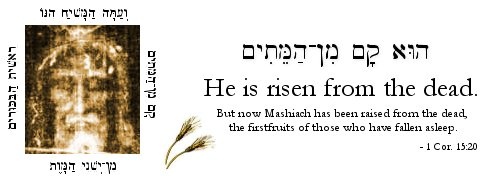
04.10.20 (Nisan 16, 5780) The Scriptures make clear that Yeshua is the true Passover Lamb of God (שֵׂה הָאֱלהִים) whose sacrificial death and shed blood causes the wrath of God to "pass over" (pasach) those who are trusting in Him (John 1:29, 3:36; Acts 8:32-36; 1 Cor. 5:7-8; 1 Pet. 1:18-20, etc.). Amen! Worthy is the Lamb who was slain! (Rev. 5:12). But while the sacrifice of Yeshua gives us forgiveness (סְלִיחָה) and atonement (כַּפָּרָה) with God (Eph. 1:7; Rom. 5:11; Heb. 9:12, etc.), the resurrection of the Messiah (i.e., techiyat ha-Mashiach: תְּחִיַּת הַמָּשִׁיחַ) justifies His work of salvation on behalf of the sinner and forever vindicates the righteousness of God (Rom. 4:20-5:1; Rom. 10:9; Heb. 13:20-21). As Yeshua said: "I am he that lives but was dead; but behold, I am alive for evermore (הִנֵּה אֲנִי חַי לְעוֹלָם וָעֶד), Amen; and have the keys of hell and of death" (Rev. 1:8). Rejoice friends, for our LORD lives! He has killed the power of death and forever reigns in indestructible life!
חַי־יְהוָה וּבָרוּךְ צוּרִי
וְיָרוּם אֱלוֹהֵי יִשְׁעִי
chai-Adonai · oo'va·rookh · tzoo·ree
ve·ya·room · E·lo·hei · yeesh·ee

"The LORD lives, and blessed be my rock,
and exalted is the God of my salvation!" (Psalm 18:46)
Hebrew Study Card

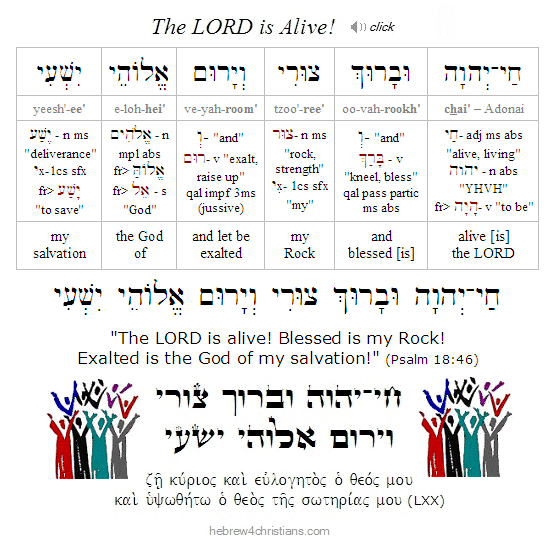
The resurrection of Yeshua is not an "academic" or speculative question to be considered in purely rational terms, but rather is a matter of eternal life or death. How we choose to respond to its message determines our destiny. Everything turns on whether we awaken to the risen reality and Presence of Yeshua in our lives. Without Him we are hopeless; with Him we are more than conquerors (1 Cor. 15:14; Rom. 8:37).
The resurrection of Yeshua IS the "good news" itself;
it is the essence and completion of his ministry as our Savior.
Everything turns on whether we awaken to
the risen Reality and Presence of Yeshua in our lives...
Yeshua completely atoned for our sins and His resurrection validated that God the Father accepted His sacrifice. It was God the Father (i.e., Reality) who raised Yeshua in victory (Gal. 1:1, Rom. 10:9), and those who put their trust trust in Him are declared righteous on account of their faith. Yeshua "was delivered for our offenses, and raised again for our justification" (Rom. 4:25). As Jesus Himself said, "Because I am alive, you also will live" (John 14:19).
Note: We observe the anniversary of the resurrection of Yeshua on Nisan 17, which this year begins Friday evening after sundown... Other Christian traditions rely on calendars different than the Torah's calendar and therefore they might observe the anniversary of the resurrection on a Sunday regardless of the Hebrew date for Passover (for more on this see the Omer Controversy article on the site). Regardless of the exact anniversary of the date in history, the Living Presence of Yeshua is the essential point... Have you encountered Him? For more on the tremendously important and vital subject of why the resurrection of Yeshua matters, please see this article.
 |
John breaks the middle matzah
Accepting True Freedom...

04.10.20 (Nisan 16, 5780) "If the Son shall set you free, you shall be free indeed" (John 8:36). The sages say, "Being free means that I am in the place I am supposed to be." In other words, freedom means surrendering, accepting, and yielding to God's path of blessing for you. This a place of great spiritual contentment where you are liberated from the slavery of fear and disappointment. Yeshua lived in this freedom, since He completely yielded Himself to His father's daily care (John 5:19; 8:29; 14:10).
Surrendering yourself to God's care is also the means of finding self-acceptance. God knows all your sins and has paid for them upon the cross, and therefore His love for you is the basis for which you can properly forgive and accept yourself... A Yiddish proverb reads, "If I try to be someone else, who then will be like me?" When you die, God won't ask why you weren't more like Moses, Elijah, etc., but rather, why you weren't more like the person He recreated you to be. No one else can do the things you are called to do, and therefore God created you as a distinct individual who reflects His glory in a unique way... "To the one who conquers I will give a white stone, with a new name written on the stone that no one knows except the one who receives it" (Rev. 2:17). Those who trust Yeshua as their Savior can intellectually understand and emotionally trust that God is working all things together for good in their lives (Rom. 8:28).
כְּרַחֵם אָב עַל־בָּנִים
רִחַם יְהוָה עַל־יְרֵאָיו
ke·ra·cheim · av · al - ba·neem
ree·cham · Adonai · al - ye·rei·av

"As a father shows compassion to his children,
so the LORD shows compassion to those who fear him."
(Psalm 103:13)
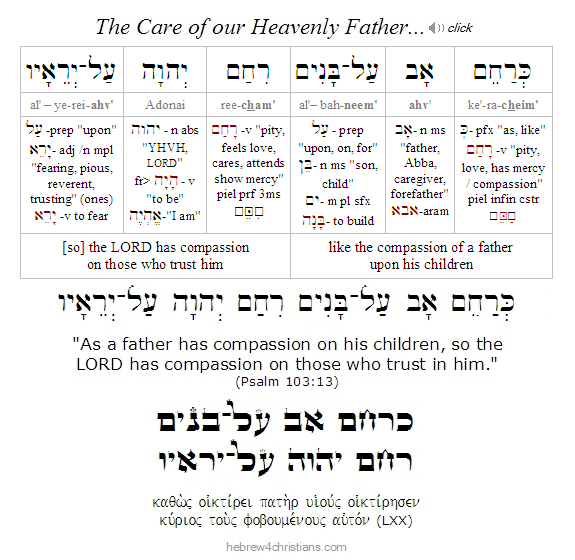
May God help us "let not our hearts be troubled" because He has promised never to leave nor forsake us (Heb. 13:5). "Be still, and know that I am God" (Psalm 46:10). As the old spiritual song goes, "He's got the whole world, in His hands... he's got you and me baby, in His hands..." May the LORD our Heavenly Father help us trust in Him. Amen.
Overcoming Mass Hysteria...
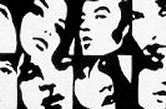
[ Come, my people (לֵך עמי בּא) enter thou into thy chambers, and shut thy doors about thee: hide thyself as it were for a little moment, until the indignation be overpast" (Isa. 26:20). ]
04.10.20 (Nisan 16, 5780) Though we can't control what happens in this dangerous world, we can trust that God is working all things together for good, even during times of severe testing, even in things that are blatantly evil, and even in the midst of mass hysteria (Rom. 8:28; Gen. 50:20, Jer. 29:11). And while we instinctively recoil at the prospect of physical death, there are decidedly things worse than death itself, namely, losing hope in life, walking in the darkness of despair, living a joyless existence because of fear, and ultimately facing God as a shameful coward who shrank back from the truth. As much as we abhor evil - and we must resist it with all our hearts - even more must we love the good - and cling to God (וּלְדָבְקָה־בוֹ) with all that is within us.
Ultimately, the most important thing to remember regarding death is the truth about God's salvation (יְשׁוּעָה). After all, God assuredly hates death and provides each of us with its eternal remedy: By clothing himself in human flesh, Yeshua embraced mortality itself and willingly bore the penalty for your sins, exchanging his life for yours, thereby destroying the one who had the power of death, namely the devil, and by so doing, set you free from slavery to the dread of death (Heb. 2:14-15). To those who belong to belong to Messiah, death represents a passage to eternal life and the loving presence of God Himself.
Only the miracle of faith can see hope in the face of radical evil... and yet that is the very message of the cross of the Messiah... Our Lord demonstrated that He is the the Killer of death itself; the Slayer of the Serpent; and the ultimate Triumph of God's Light over the realm of despair and everlasting darkness... He is the First and the Last, the Living One who died, and behold is alive forevermore, the true Keyholder of Death and Hell (Rev. 1:18).
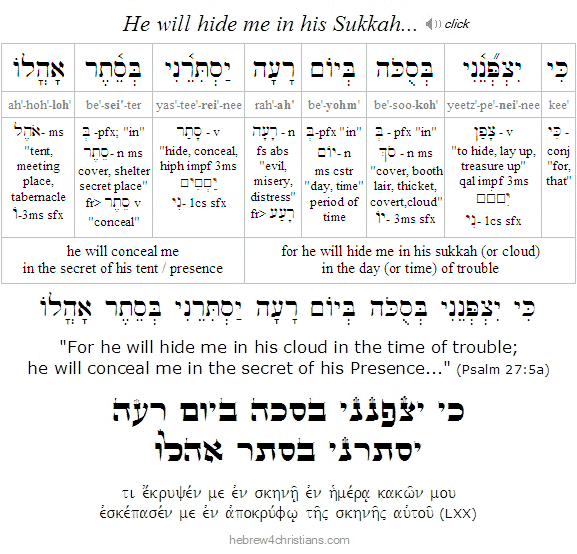 |
לֵךְ עַמִּי בּא בַחֲדָרֶיך
וּסְגר דְּלָתְךָ בַּעֲדֶךָ
חֲבִי כִמְעַט־רֶגַע
עַד־יַעֲבָר־זָעַם
lekh · am-mee · bo · va-cha·da-rey'-kha
oos-gohr · de-la-te-kha · ba-a-de'-kha
cha-vee · kheem-at – re-ga'
ad – ya-a-vahr – za-am

"Come, my people, enter thou into thy chambers,
and shut thy doors about thee:
hide thyself as it were for a little moment,
until the indignation be overpast."
(Isaiah 26:20)
Countdown to Shavuot...
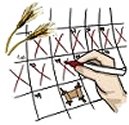
04.10.20 (Nisan 16, 5780) In the Torah we are instructed to count forty nine days – seven weeks of days – from the day following Passover until Shavuot (i.e., Weeks or "Pentecost"). This period of time is called Sefirat HaOmer (ספירות העומר), or the "counting the [barley] sheaves" (Lev. 23:15-16). In abstract terms, it's as if there is a dotted line pointing directly from Passover to Shavuot - a "Jubilee" of days - representing the climax of Passover itself. The early sages identified this climax as the revelation of the Torah at Sinai, but the New Testament identifies it as the outpouring of the Holy Spirit (רוח הקודש) that ratified the reality of the New Covenant of God. The redemption process that began at Passover was therefore completed at Shavuot, and that "completion" was the revelation of God's love and deliverance for the entire world. And though the Jewish sages did not fathom the use of the otherwise forbidden leaven in the offering (see Eph. 2:14). The countdown to Shavuot therefore goes beyond the giving of Torah at Sinai and points to the greater revelation of Zion. Shavuot is the fulfillment of the promise of the Holy Spirit's advent to those who are trusting in Messiah (Acts 2:1-4). "Counting the Omer," then, is about receiving the Holy Spirit to experience and know the resurrected LORD of Glory. You can "count" on that, chaverim!
From a Messianic point of view, it is important to understand that the climax of the 49 days was not the giving of the law at Sinai (i.e., matan Torah), but rather the revelation of the altar (i.e., the"Tabernacle") and its subsequent fulfillment in the sacrificial death of Yeshua as our Lamb of God. Moreover, it was during this time that Yeshua made His post-resurrection appearances to His disciples - and indeed ascended to heaven during this 49 day period... Of particular importance is the climactic holiday of Shavuot, day 7x7 of the count, when the Holy Spirit (רוח הקודש) was given to the disciples in fulfillment of the promise of Yeshua that we would not be left comfortless. Shavuot, then, marks the time of "Jubilee" of the Spirit, when are clothed with power from on high to serve the LORD without fear...
For more on this subject, see: "Sefirat HaOmer: Counting the Sheaves to Shavuot."
Passover's Love Song...

04.08.20 (Nisan 14, 5780) During Passover week it is customary to read the ancient "love song" of King Solomon called Shir Ha-Shirim (שיר השירים), or the "Song of Songs." In Jewish tradition, since Passover marks the time when our "romance" with God officially began, the sages chose this song to celebrate God's love for his people. And since Passover is also called Chag Ha-Aviv, the festival of spring, the Song is also associated with creativity and hope associated with springtime (Song 2:11-12). One way to read this poem is to see the king, who had disguised himself as a lowly shepherd to win the heart of the Shulamite woman, as a picture of Yeshua who took the form of a lowly servant to demonstrate his eternal love for those who are trusting in him... Indeed, the Song of Songs is linked to the "lilies" (i.e., shoshanim: שׁשׁנים) mentioned in Psalm 45, which presents a Messianic vision of the Divine Bridegroom and offers an "ode" for a forthcoming wedding.
אֲנִי לְדוֹדִי וְדוֹדִי לִי
הָרעֶה בַּשׁוֹשַׁנִּים
a·nee · le·do·dee · ve·do·dee · lee
ha·ro·eh · ba·sho·sha·neem

"I am my beloved's and my beloved is mine;
he grazes among the lilies."
(Song 6:3)
Download Study Card

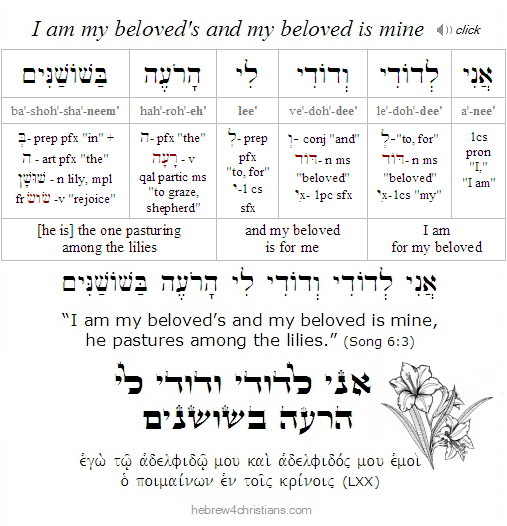
The essential meaning of Passover is of course rooted in the greatest love story ever told - about God, creation, the loss of Adam and Eve, the call of Israel, and the coming of the Messiah who would sanctify us as His own people, deliver us from the plague of death, and redeem us from the penalty of sin. Yeshua's mesirat nefesh ("giving over of soul" in sacrifice) and his triumph at the cross made the new covenant with God possible. As our Suffering Servant, He gave up His life for ours in exchange, redeeming us from the sickness unto death and making the way for our everlasting healing.
Whether or not you are able to attend a Passover Seder this year, please understand that there is always a place for you at His table. After all, Yeshua made a place for you within His heart when he died for you on the cross, and that is what Passover is really all about anyway. Pesach Sameach b'Yeshua, chaverim -- Happy Passover in Yeshua, friends!
And for more on the connection between Passover and the Song of Songs, see the article "Shir Hashirim: Passover and the Song of Solomon."
 |
Love Believes all things...

04.08.20 (Nisan 14, 5780) "I would have fainted unless I believed to see the goodness of the LORD..." (Psalm 27:13). Faith is therefore self-authenticating: as you trust in the good, the good will be revealed: believe to see! As Yeshua said, "According to your faith be it done unto you" (Matt. 9:29). And if it is faith that makes you whole, then its lack makes you sick... As you doubt, so you will lose sight of what is real, true, and abiding. Being cynical is cowardly: "There are two ways to be fooled. One is to believe what isn't true; the other is to refuse to believe what is true" (Kierkegaard). The cynic refuses the possibility of truth because he is afraid of being fooled, and for this fear he willingly closes his eyes to the good. "Believe that life is worth living, and your belief will help create the fact" (James). When we trust God's promises, we affirm an unseen good even if the present hour is shrouded in darkness. Faith sees beyond "the seen" to the unseen (2 Cor. 4:18). The "seen" is not ultimately real, and consequently faith is exiled from the vanity of the present hour (עולם השקר ). Therefore affirm your faith, dear friend; do not allow your heart to waver. Refuse the darkness of fear by choosing to believe in the reality of God's love for your soul, despite the mess you've made of your life. Affirm that God's love is more real, more substantive, and more valuable than anything disclosed in this world that fades away. Amen.
 |
The Passover Lamb (שֵׂה הַפֶּסַח)

[ We celebrate Passover while still in the darkness to better see the radiance of his salvation! ]
04.08.20 (Nisan 14, 5780) Some of the sages say that the Passover was meant to be a prelude to the revelation given at Sinai, though it really had to do with the deliverance (i.e., yeshuah: יְשׁוּעָה) of those who had faith in God's remedy given through the blood of the lamb. The Passover anticipates God's victory over the powers of darkness -- recall that the final plague was delivered at midnight -- and the people then left Egypt for the promised land the following day -- a vivid testimony of God's power of redemption (Exod. 12:29; Exod. 12:41). We observe the Passover seder in the evening before the Exodus event because we share in the experience of salvation - trusting in God's deliverance from death by the agency of the sacrificial lamb - before we celebrate our freedom. Likewise we first go to the cross of Messiah, the Great "Lamb of God" - receiving God's provision for our healing and deliverance - before we begin our journey into the promise of newness of life (1 Cor. 5:7).
Observing Passover is an act of faith. While still within the darkness of bondage in Egypt, the Israelites had to believe in the freedom God promised to them. By taking hold of the lamb on the 10th of Nisan, waiting four days and then slaughtering the lamb, placing its blood upon their doorway, and later eating its flesh, the people expressed faith in God's deliverance by means of his compassionate gift of vicarious atonement (Exod. 12:3-12). Again, celebrating Passover expresses faith that we are set free from the powers of darkness and oppression, even during the struggle against the darkness. The victory of Passover is a divinely given freedom, a rebirth produced by the Spirit of God (2 Cor. 5:17).
 |
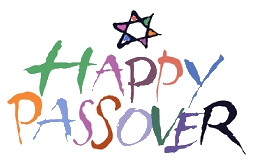 |
 |
The Shepherd's Call...
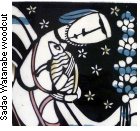
04.08.20 (Nisan 14, 5780) "What do you think? If a man has a hundred sheep, and one of them has gone astray, does he not leave the ninety-nine on the mountains and go in search of the one that went astray? And if he finds it, truly, I say to you, he rejoices over it more than over the ninety-nine that never went astray" (Matt. 18:12-13). Though it involves sorrow, and the pain of being lost, repentance is ultimately about finding joy, and when we return to God, we have reason to rejoice. The Good Shepherd says, "Rejoice with me, for I have found my sheep that was lost. Just so, I tell you, there will be more joy in heaven over one sinner who repents than over ninety-nine righteous persons who need no repentance" (Luke 15:6-7). The Son of Man came to seek and to save the lost: "For thus says the Lord GOD: Behold, I myself will search for my sheep and will seek them out... I myself will be the Shepherd of my sheep, and I myself will make them lie down, declares the Lord GOD. I will seek the lost, and I will bring back the banished, and I will bind up the injured, and I will strengthen the sick..." (Ezek. 34:11,15-16).
 |
Taking Passover Personally...

[ The eight-day holiday of Passover begins this evening at sundown... ]
04.08.20 (Nisan 14, 5780) The message of Passover applies to each of us: "In each and every generation an individual should look upon him or herself as if he or she (personally) had left Egypt." Indeed the very First Commandment is to accept the reality of your personal deliverance by the LORD: "I am the LORD your God, who brought you (singular) out of the land of Egypt, out of the house of slavery" (Exod. 20:2). Note that the Hebrew word "Egypt" is mitzraim (מצרים), a word that means "prison, enclosure, or straights," from the verb tzur (צוּר) meaning "to bind or confine" (the Yiddish word tsuris, "trouble," comes from the same root). On the other hand, the Hebrew word for salvation is yeshuah (ישועה), from a root that means to "make wide," to "release from constraint," to deliver or set free. It is noteworthy that God began the Ten Commandments by identifying Himself as our Redeemer and Deliverer rather than as our Creator, because the purpose of creation is to be set free by means of God's redemptive love given through Yeshua, the "Lamb slain from the foundation of the world" (Rev. 13:8; 1 Pet. 1:18-20; Eph. 1:4; 2 Tim. 1:9). Happy Passover, friends...
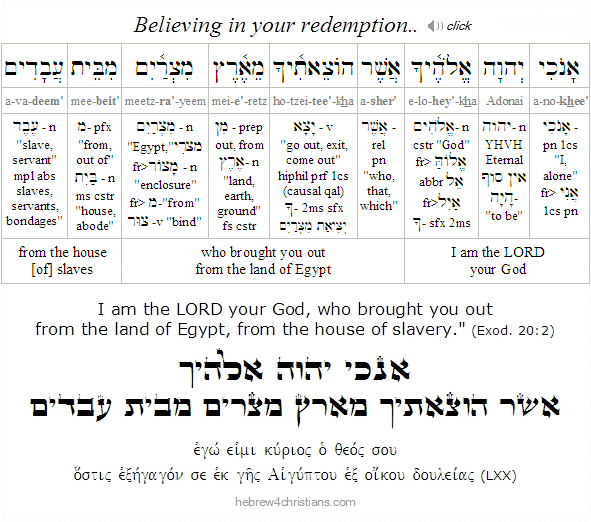 |
בְּכָל דּוֹר וָדוֹר חַיָּב אָדָם לִרְאוֹת אֶת־עַצְמוֹ
כְּאִלּוּ הוּא יָצָא מִמִּצְרָֽיִם
be-khol · dohr · va-dohr · khai-yahv · a-dam · leer-oht · et - atz-moh
ke-ee'-loo · hoo · ya-tzah · mee-meetz-ra'-yeem

"In each and every generation an individual should look upon himself (or herself)
as if he (or she) personally had left from Egypt."
The Reason for Passover...

[ The following is related to the holiday of Passover... ]
04.07.20 (Nisan 13, 5780) "This is the thing that the LORD commanded you to do, so that the glory of the LORD may appear to you: Draw near to the altar and offer your sin offering and your burnt offering and make atonement for yourself" (Lev. 9:6-7). Have you considered why you were born into this world? What is your purpose, destiny, and end? The Torah states that you were personally created by Almighty God, who breathed out the breath of life (נִשְׁמַת חַיִּים) into you, and then redeemed your life so you could know the glory of God and spiritual reality. As it is written: "Worthy are you, our Lord and God, to receive glory and honor and power, for you created all things, and by your desire they existed and were created" (Rev. 4:11). God creates all things for his glory and purposes, which indeed is the first blessing recited over the bride and groom in a traditional Jewish wedding: בָּרוּךְ אַתָּה יְהוָה אֱלהֵינוּ מֶלֶךְ הָעוֹלם שֶׁהַכּל בָּרָא לִכְבוֹדו / "Blessed are you Lord our God king of the universe, who has created all things for his glory." The purpose of life is to know and love God, to walk in His light and truth, and to glorify his compassion and grace forever...
At a traditional Jewish wedding the groom places the ring on his bride's finger and says: Harei, at mekudeshet li (הרי את מקודשׁת לי): "Behold, you are sacred to me." Love and holiness are interconnected, since the beloved is set apart as sacred and treasured. May God help us see the wonder of His love for our lives: "Do not be conformed to the passions of your former ignorance, but as he who called you is holy, you also be holy in all your conduct, since it is written, "You shall be holy, for I am holy" (1 Pet. 1:14-16).
 |
 |
Freedom to Serve God...

[ The eight day holiday of Passover begins Wednesday, April 8th at sundown this year... ]
04.07.20 (Nisan 13, 5780) Passover is sometimes called z'man cheruteinu (זְמָן חֵרוּתֵנוּ), the "Season of our Freedom." Some people think that "freedom" means "licentiousness," or the ability to do what they want to do whenever they want to do it. However, simply doing whatever you want to do is not the Torah's idea of freedom. Indeed, Yeshua told us "whoever commits sin is the slave (δουλος) of sin," and went on to say "if the Son sets you free, you will be free indeed" (John 8:34-36). True freedom (i.e., cherut: חֵרוּת) is therefore moral and spiritual rather than merely physical. Genuine freedom has to do with the power to choose what is right and good, not to simply get your own way or to practice your lusts... Where it is written, "The tablets were the work of God, and the writing was the writing of God, engraved on the tablets" (Exod. 32:16), the midrash says do not read "engraved (חָרוּת) on the tablets" but rather as "freedom (חֵרוּת) on tablets," since only those who obey God's will may rightly be called "free" people (Rom. 6:8).
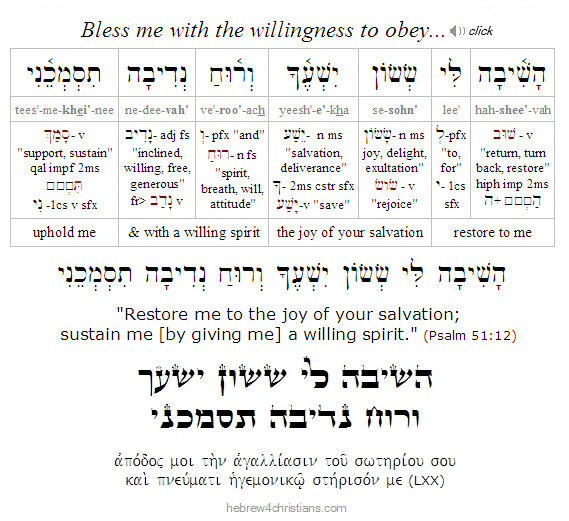 |
 |
A Night to be Guarded...
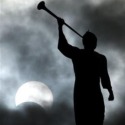
04.07.20 (Nisan 13, 5780) "At the end of 430 years, on that very day (i.e., Nisan 15), all the hosts of the LORD went out from the land of Egypt" (Exod. 12:41). Immediately after stating this, the Torah refers to Passover as leil shimurim (ליל שמורים), a "night to be guarded" (from the verb shamar, which means "to watch" or "to guard"). "It is a night that is guarded (leil shimurim) to the LORD for bringing them [Israel] out of Egypt; this night remains a night to be guarded (שִׁמֻּרִים) by the people of Israel throughout their generations" (Exod. 12:42). Since "this night" - ha-lailah hazeh (הלילה הזה) - was guarded by God from the beginning to be the time of redemption, Israel must therefore "guard this night" (i.e., keep a vigil) by means of the Passover Seder (Exod. 13:10; Deut. 16:1), recalling and celebrating God's faithfulness and redemptive love...
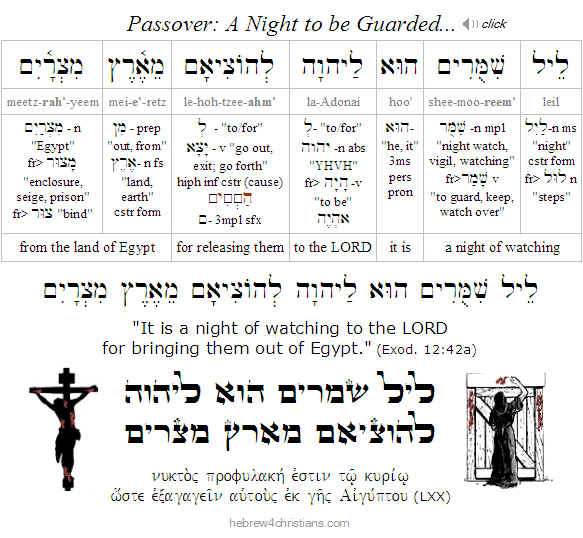 |
Note further that the phrase leil shimurim literally means "night of the watches" (shimurim is plural), and therefore it refers not only to the redemption of Israel in Egypt (i.e., the Passover), but also to the time of future redemption by the Messiah (Shemot Rabbah 18). This explains why this night is a regarded as a vigil for all generations (Matt. 24:42).
The Talmud (Rosh Hashanah 11a) states: "In Nisan our forefathers were redeemed from Egypt, and in Nisan we will be redeemed." In that sense, Nisan is called Chodesh ha-Yeshuah (חודש הישועה), the "month of the salvation," both in terms of the physical deliverance from Egypt, but more profoundly in terms of the salvation given through the Messiah Yeshua (ישוע המשיח), who was crucified as the "Lamb of God" precisely during this time...
Note: For more on this subject see, "Leil Shimurim - A Night to be Guarded."
Our Broken Matzah...
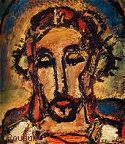
[ The central holiday of Passover begins Wednesday April 8th at sundown this year... ]
04.06.20 (Nisan 12, 5780) During our Passover Seder, we will place three matzahs on the table, said to represent Abraham, Isaac and Jacob, respectively. During the Yachatz step of the seder, the middle matzah (representing Isaac) will be broken to recall how Isaac was sacrificed in obedience to his father, foreshadowing the sacrifice of Yeshua by God the Father. Indeed, the Talmud states, "We break the middle matzah in tribute to Yitzchak (Isaac), who accepted the sins of the people upon himself" (Shabbos 89b). The smaller half of this broken matzah will be eaten later during the Motzi Matzah step, while the larger half will be eaten during the Afikomen step, near the end of the night...
In Hebrew, the middle of something is it's heart - the heart of the heavens, the heart of the earth, the heart of the sea, the heart of a person... Since the offering of Isaac by Abraham foretold of the greater offering of Yeshua by God Himself, when we break the middle matzah, then, we recall the broken heart of God over the pain Yeshua endured by taking our sins upon Him at the cross...."For our sake he made him to be sin who knew no sin, so that in him we might become the righteousness of God" (2 Cor. 5:21).
During his Passover seder with his disciples, Yeshua "took matzah, and after blessing it broke it and gave it to the disciples, and said, "Take, eat; this is my body" (Matt. 26:26). Since Yeshua did this while they were eating dinner, the matzah he broke would have been the Afikomen, thereby making the connection between the hidden bread (lechem ha-nistar) that would be broken given for our deliverance. The matzah we eat during Passover is called lechem oni (לֶחֶם ענִי) - "the bread of [His] suffering" - and eating the Bread of Life that was "broken for us" remembers the great suffering of our LORD...
 |
 |
Intimacy of Passover...

04.06.20 (Nisan 12, 5780) Unlike the rituals and practices of organized "religion," the Passover Seder takes place at home, not in a sanctuary, and may be conducted by anyone, not by professional clergy or a rabbi... The heart of the seder is shared meal celebrating our connection with family, our friends, the "called out" people of God who take refuge in his promises. Such intimacy is altogether fitting, since Passover was foreshadowed in the original paradise, was prophetically and poignantly re-enacted by Abraham's sacrifice of Isaac, and was later affirmed by Israel at the time of the Exodus. In each case the blood of the lamb is central: to cover the shame of Adam and Eve's transgression; to express the heart of God's compassion in the substitution of the lamb for Isaac, and for the redemption of the families of Israel during the Passover. Most of all, however, the Passover Seder foretells and recalls the sacrifice of Yeshua on our behalf as the great Lamb of God who delivers us from our slavery to sin. Therefore heed the Torah's general rule about the holidays: "You shall rejoice in your festival" (Deut. 16:14) by delighting in the salvation of God, by embracing our family and friends in the sure hope of eternal life.
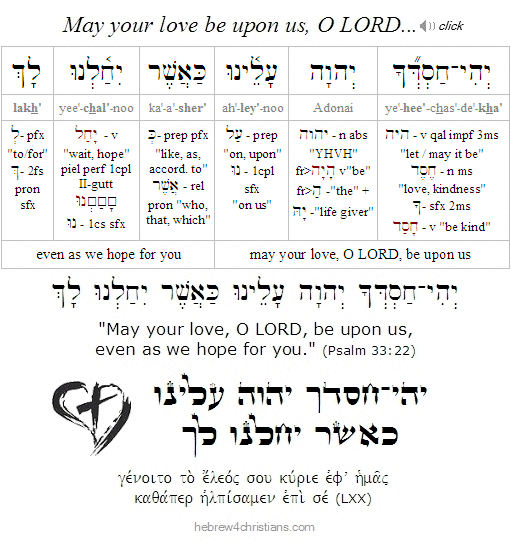 |
 |
"The" Question of Passover...

04.06.20 (Nisan 12, 5780) During the Passover Seder we begin our retelling the story of the Exodus when the question is sung: "Mah nishtanah ha-lailah ha-zeh mikol ha-leilot?" - What makes this night differ from all other nights? This is "the" central question of Passover, asked for thousands of years, and the answer is always the same: Avadim Hayinu: "We were slaves, but God redeemed us from bondage by the blood of the lamb (דַּם הַשֶּׂה)." Note again that there were not many lambs, but the LORD told Israel: "You shall keep it [i.e., the Passover lamb] until the fourteenth day of this month, when the whole assembly of the congregation of Israel shall slaughter him at twilight (Exod. 12:6). Each family put their trust in God's uniquely appointed sacrifice to be delivered from the plague of death (מכת המוות).
מַה נִּשְׁתַּנָּה הַלַּיְלָה הַזֶּה מִכָּל הַלֵּילוֹת
mah · neesh·ta·nah · ha·lai'·lah · ha·zeh · mee·kohl · ha·ley·loht?

"What makes this night differ from all other nights?"
The Exodus for Today...

[ "The LORD is a warrior; the LORD is His Name" / יהוה אישׁ מלחמה יהוה שׁמו (Exod. 15:3) ]
04.06.20 (Nisan 12, 5780) An old midrash says that at the time of the great Exodus, only a remnant of Israel were actually saved while all the others died in the makkah (plague) of darkness, having fallen so low that they could not believe in the redemption or even want to be redeemed (Rom. 9:27-28)... God forbid that we should give up hope now, chaverim, especially since the time of the Messiah's return draws near (Luke 21:28; Rom. 13:11). בכל דור ודור -- b'chol dor vador -- "in each and every generation" an individual should look upon him or herself as if he or she (personally) had been rescued from Egypt.
And yet divine history is somewhat "cyclical" in its expression. The closer we go back to the beginning, the more we see how the future was "seeded" and gets replayed in every generation. Both the Tree of Life (עץ החיים) and the Tree of the Knowledge of Good and Evil (עץ הדעת טוב ורע) were present in the original paradise (Gen. 2:9). When Eve listened to the lies of the nachash (serpent) and regarded the forbidden tree as "desirable to make one wise," she immediately began her descent into exile. At the very dawn of human history, then, we see that "truth" (אמת) apart from God (א) leads to death (מֵת). Adam and Eve's disobedience led to God's gracious promise regarding the coming "Seed" who would restore all things by being victorious in the war for truth (Gen. 3:15). Of course, this promised Seed was Yeshua, our Suffering Servant and "Second Adam," who, through His sacrifice upon the cross, "reversed the curse" and reconciled humanity with God. Note, however, that this "proto-gospel" message also implied perpetual warfare between the heirs of the Messiah (called the "children of light") and the heirs of Satan (called the "children of darkness"). The ongoing enmity between these "two seeds," then, was ultimately something God willed (1 Thess. 5:5; Col. 1:13; 1 John 3:10). The children of light are called to be am kadosh - a holy people - separate from the evil engendered by the fallen world and its forces, just as the very first creative expression of God was the separation of light from darkness (Gen. 1:3-4). The children of light "hate evil and love the good," and conversely, the children of darkness "hate the good and love evil" (Psalm 34:21, Prov. 8:13, Amos 5:15). The Exodus story, then, is not so much a matter of ancient history as it is a present revelation of God's righteous liberating power over the powers of darkness. The great Exodus led to Sinai, and with it the re-encountering of the Tree of the Knowledge of good and evil, just as the Cross of Yeshua is the Tree of Life in the midst of the Garden of God. Life is about spiritual warfare, and the power encounter between God and Pharaoh is a paradigm for the ages. Therefore Yeshua refered to his sacrificial death as the great Lamb of God as the final exodus (see Luke 9:31).
Throughout history we see the repeated attempt to resuscitate or revive ancient "Ra worship" (which derives from Satan in the garden). Every culture has its emissaries of evil -- its "pharaohs," its political dynasties, its caste systems, and its presumed sense of status quo. In the ancient world, most political figures were literally deified; in the Middle Ages, they were thought to rule through "divine right"; but in today's secular world, there is no justification given for their control other than through deception and the naked "will to power." In nearly every case, however, it can be stated that politicians and leaders of this world represent what is most sick about the human condition. Politicians and princlings are given "their hour" in this earth, and they are undoubtedly groomed by the "god of this world" who was a murderer and a liar "from the beginning" (John 8:44). The dust and ashes of countless past civilizations and regimes attest to this truth...
Today we are living in a world that is "globalist" by design. Politicians are often unwitting lackeys for the darker powers seeking to consolidate power to enslave the whole earth. Plans to force worldwide vaccinations and to create a worldwide surveillance state have been in the works for years. The planned destructions of the global economy and its system of usury is the mechanism that will give rise of yet another "Pharaoh" who likewise will be judged by the LORD God Almighty at the End of Days.
Many people live in a state of fear because they believe the lies and propaganda of "the lords of the darkness of this world" / τοὺς κοσμοκράτορας τοῦ σκότους τούτου (Eph. 6:12). Satan's power always has been through the use of deception. If he can get you to believe a lie, he will begin to control you through fear. This is how the devil has always gained the kingdoms of this world -- through deception and violence... As followers of Yeshua, we must always keep in mind that reality centers on the LORD God of Israel and never in the "rhetorical violence" and metaphysical fantasies of political or media figures.
The LORD God of Israel truly cares about people's liberation from deception and oppression. The story of the Exodus is His everlasting rebuke to all the world's dictators and should cause every politician to soberly assess their fate... The time is coming when His judgment will fall upon all the "kings of the earth who take counsel against the LORD and against His Anointed One" (Psalm 2:2).
Presently we are living with the tension of the "already-not-yet" aspect of the original prophecy that "he (the Messiah) will crush the head (of the serpent)." Satan still appears to have the upper hand, at least in the temporal realm. Final victory is not yet here, even if it is assured through the promises of God (Rom. 16:20). And while the time appointed by God for the Messianic redemption of Israel and the "End of Days" is a heavenly kept secret (Mark 13:32), there are signs called chevlei ha'mashiach (חבלי המשׁיח) - the "birth pangs" of the Messiah - that indicate that the time is imminent when this world (κόσμος) will be judged.
Most of these birth pangs indicate peril and danger, including "distress of nations in perplexity because of the roaring of the sea and the waves," and "men's hearts failing them for fear, and with foreboding of what is coming on the earth" (Luke 21:25-6). In addition, the moral depravity of mankind will be unmasked, showing us clearly that "men shall be lovers of their own selves, covetous, boasters, proud, blasphemers, disobedient to parents, unthankful, unholy, without natural affection, trucebreakers, false accusers, incontinent, fierce, despisers of those that are good, traitors, heady, highminded, lovers of pleasures more than lovers of God; having a form of godliness, but denying the power thereof" (2 Tim. 3:2-3). The increase in "globalism" and the unholy urge to unify the world into a new type of "Babylon" will give the Messiah of Evil his coming political platform in the days ahead. "Political correctness," that is, social coercion based on godless consensus, is the deadly ethos of our time.
Friends, we must remember that "all things work together for good to them that love God" (Rom. 8:28), and we must take hold of the command given to Joshua: chazak ve'ematz, "Be strong and of good courage!" Just as Joshua was promised that the LORD would be with him as he went in to possess the land, so we must remember that the LORD has promised never to leave us nor forsake us (Heb. 13:5; Matt. 28:20), even in the midst of tribulation, or distress, or persecution, or famine, or nakedness, or danger, or sword (Rom. 8:35).
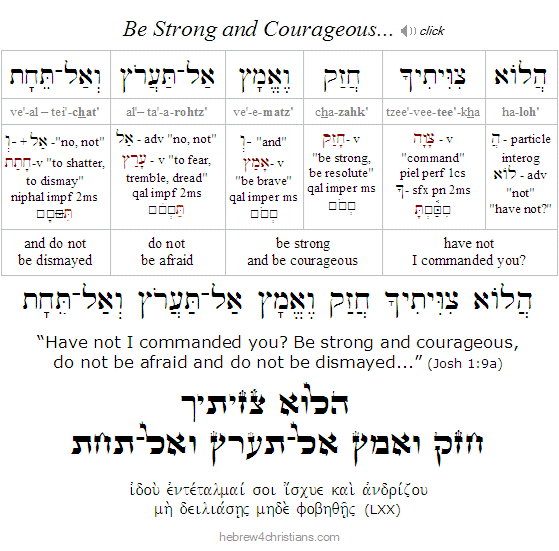 |
We do not need to live in fear, because melo khol ha'aretz kevodo: מלא כל־הארץ כבודו, "the whole earth is filled with His glory (Isa. 6:3). "In God have I put my trust: I will not be afraid what man can do unto me" (Psalm 56:1). Passover is all about the victory of God over the powers of darkness for the sake of our deliverance (i.e., yeshuah: ישועה). The echo of Moses' cry, shelach et-ammi (שׁלח את־עמי), "let my people go!" is still resounding in the heavenly realms. So be encouraged, chaverim, even in the face of evil. Do not be afraid and do not be dismayed, "for the LORD your God is with you wherever you go." Amen!
Teshuvah of Passover...
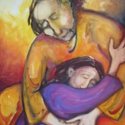
04.06.20 (Nisan 12, 5780) We must be careful not to worship an idol, that is, a false concept of God! It is possible to study the Bible, to attend a church or synagogue, and yet worship a pagan god. How so? By not knowing the heart of the Father; by not honoring the One who passionately seeks our healing. We know the Father by the Son, that is, in "the language of Son" (ἐν υἱῷ) and in the truth of his passion (Heb. 1:2; Luke 10:21-24). Our heavenly Father is eager to forgive and embrace all of his children (John 3:16-17). In Yeshua's famous parable of the "prodigal son," the father saw his wayward child a "long way off" and ran to embrace and kiss him - no questions asked, no explanations needed about his past. When the son nevertheless began reciting his carefully prepared speech of regret and repentance, the father barely listened, and in his overwhelming joy instructed his servants, 'Bring quickly the best robe, and put it on him, and put a ring on his hand, and shoes on his feet. And bring the fattened calf and kill it, and let us eat and celebrate. For this my son was dead, and is alive again; he was lost, and is found' (see Luke 15:20-25).
Know the heart of the Father... God sees you while you are still "a long way off" (Rom. 5:8). He runs to you with affection when you first begin to turn your heart toward Him. Indeed, God's compassion is so great that He willingly embraces the shame of your sins and then adorns you with "a fine robe, a ring, and sandals." Your Heavenly Father even slaughters the "fattened calf" (Yeshua) so that a meal that celebrates your life may be served.
It is never too late to turn to God... The prophet Jeremiah spoke in the Name of the LORD: "Return, faithless Israel, declares the LORD. I will not look on you in anger, for I am kind (כי־חסיד אני), declares the LORD" (Jer. 3:12). When the people drew back in shame, however, God encouraged them by saying "Come back, O lost children; I will heal your faithlessness. "Behold, we come to you, for you are the LORD our God" (Jer. 3:22).
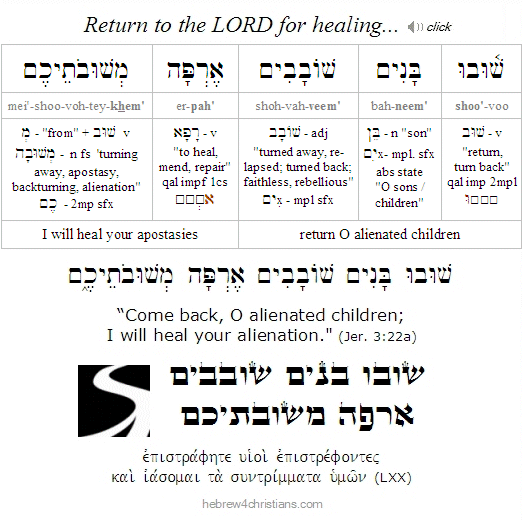 |
 |
Retelling the Story again (and again)...

[ "In every generation, each of us is obligated to see himself or herself [lirot et atzmo] as though he or she personally came forth from Egypt." - Traditional Hagadah ]
04.06.20 (Nisan 12, 5780) Concerning the observance of the Passover Seder the Torah states, "When your child asks you in time to come, 'What is the meaning of the testimonies and the statutes and the rules that the LORD our God has commanded you?' then you shall say, 'We were slaves (עבדים היינו) to Pharaoh in Egypt, but the LORD brought us out of Egypt with a mighty hand. And the LORD showed signs and wonders, great and grievous, against Egypt and against Pharaoh and all his household, before our eyes" (Deut. 6:20-23). We are instructed to "remember what the LORD your God did to Pharaoh and to all Egypt, the great trials that your eyes saw, the signs, the wonders, the mighty hand, and the outstretched arm, by which the LORD your God brought you out" (Deut. 7:19). As it is written in the Shema, "You shall teach them diligently to your children," we ask, what do we teach? And we answer: Kulo! Everything – the whole story of our deliverance (הסיפור המלא).
The early sages taught that Hebrew word "Pesach" (פסח) can be read as peh (פֶּה), "mouth," and sach (סַח), "speaks," indicating that Passover is a confession of the truth of God's redemption, testifying to the truth of the LORD's faithful love. On Pesach we thank God for the revelation and the wonder of the great Lamb of God that was slain... Indeed, in light of the truth of the Scriptures - both in the Torah, the writings, the prophets, and the New Covenant Scriptures - how is it possible to honor the LORD God of Israel and to celebrate his redemption apart from the Messiah who came to earth to die as the great Lamb of God? Yeshua is the heart and central meaning of the Passover, and there is simply NO valid Passover Seder apart from the blood of the Lamb (Heb. 2:3; Heb 10:28-29).
Related Topics:
The Very First Passover...

[ The following is related to the holiday of Passover, which begins Wednesday, April 8th at sundown... There is no Passover apart from the blood of the Lamb! ]
04.05.20 (Nisan 11, 5780) Passover is the archetypal picture of the redemption of God. Its theme goes all the way back to the beginning, to the primordial garden of Eden itself, when Adam and Eve disobeyed God and ate from the forbidden tree. Because of their transgression, our original ancestors incurred the plague of death and were exiled from the Divine Presence, though God graciously promised to heal them through the coming Seed of the woman – the Savior who would crush the head of the serpent and break the fangs of his venomous sting (Gen. 3:15). Soon after making this great promise, God clothed our primordial parents with the skin of a sacrificed lamb (Gen. 3:21), linking their coming deliverance with the "Lamb of God slain from the foundation of the world" (1 Pet. 1:18-20). The very first "Passover" was in the garden. The story extends to the world to come, too, where in the redeemed paradise of God we will celebrate the victory of the Lamb who suffered in the garden and was slain for our redemption (Rev. 5:12-13, Rev. 19:7).
The great story of our redemption is revealed on two levels in Scripture - one that concerns the paradise of Eden (the universal level), and the other that concerns the paradise of Israel (the particular level). Therefore Yeshua is both rightly called the "Lamb of God who takes away the sins of the world" (John 1:29) and "the Messiah our Passover Lamb who has been sacrificed for us" (1 Cor. 5:7). Likewise he is both called the "Seed of the woman," and "the Son of David"; the "Second Adam," and the "King of the Jews," and so on. The story of Israel's redemption in Egypt therefore serves as an allegory of both the universal salvation promised in Eden (i.e., the lamb slain from the foundation of the world) as well as the revelation of the sacrificial ministry of Yeshua as Israel's promised Messiah. Yeshua is both the Savior of the world as well as Israel's true King and Deliverer.
Note: For more on this subject, please see the articles, "The Very First Passover" and "The Gospel in the Garden."
The Torah of Passover...

[ The following concerns the holiday of Passover, which begins Friday April 19th at sundown. ]
04.05.20 (Nisan 11, 5780) All of the Biblical holidays (חגי תורה) begin with the primordial holiday of Passover (חג הפסח). On the first of Nisan, two weeks before the Exodus, God showed Moses the new moon and commenced the divine calendar. Two weeks later, the Israelites kept the Passover by daubing the blood of the lamb on their doorposts. At the stroke of midnight of Nisan 15 God sent the last of the ten plagues on the Egyptians, killing all their firstborn. On the 6th of Sivan, exactly seven weeks after the Exodus (49 days), Moses first ascended Sinai to receive the Torah (Shavuot). Forty days later, on the 17th of Tammuz, the tablets were broken. Moses then interceded for Israel for another forty days until he was called back up to Sinai on Elul 1 and received the revelation of the Name (YHVH). After this, he was given the second tablets and returned to the camp on Tishri 10, which later was called Yom Kippur, or the "Day of Atonement." Later the holiday of Sukkot ("Tabernacles") was instituted to commemorate God's care for the people as they trekked through the desert en route to the promised land.
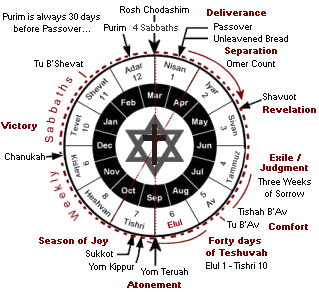 |
The story of the Exodus from Egypt (סיפור יציאת מצרים) is perhaps the most fundamental event of Jewish history. In addition to being commemorated every year during Passover (Exod. 12:24-27; Num. 9:2-3; Deut. 16:1), it is explicitly mentioned in the very first of the Ten Commandments (Exod. 20:2), and it is recalled every Sabbath day (Deut. 5:12-15). The festivals of Shavuot ("Pentecost") and Sukkot ("Tabernacles") likewise derive from it (the former recalling the giving of the Torah at Sinai and the latter recalling God's care as the Exodus generation journeyed from Egypt to the Promised Land). Indeed, nearly every commandment of the Torah (including the laws of the Mishkan (i.e., "Tabernacle") and the sacrificial system) may be traced back to the story of the Exodus. Most importantly, the Exodus prefigures and exemplifies the work of redemption given through the sacrificial life of Yeshua the Messiah, the true King of the Jews and the Lamb of God (שׂה האלהים).
The very first occurrence of the word "Torah" (תורה) in the Scriptures refers to the obedient faith of Abraham (Gen. 26:5), and the second occurrence refers to the law of Passover: "There shall be one law (תורה אחת) for the native and for the stranger who sojourns among you" (Exod. 12:49). There is a link between these two occurrences. Abraham lived before the time of the Exodus, of course, and therefore he obeyed the law of Passover by means of the Akedah (the sacrifice of his "only begotten" son Isaac). Despite offering his son up upon the altar at Moriah, Abraham believed in the LORD and it was credited to him as tzedakah (righteousness). Abraham's obedience revealed that the inner meaning of Torah is that the "righteous shall live by faith" (Hab. 2:4, Rom. 1:17). The Torah of Passover (תורת הפסח) likewise teaches that redemption from death is possible through the exchange of an innocent sacrificial victim. The blood of the Passover was "a sign" of imputed righteousness that was obtained entirely by faith. This is the "korban" principle of "life-for-life" that underlies the Torah of the sacrificial system of the Tabernacle as well. Ultimately all true Torah points to Yeshua, who is the divinely appointed Redeemer and the beginning and goal of all of creation... "When the fullness of time (τὸ πλήρωμα τοῦ χρόνου) had come, God sent forth his Son, born of woman, born under the Torah, to redeem those who were under the Torah, so that we might receive adoption as sons" (Gal. 4:4-5).
Related Topics for Passover:
Remaining Steadfast...
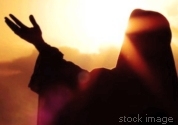
04.05.20 (Nisan 11, 5780) We must stay vigilant, friends. "For you yourselves are fully aware that the Day of the LORD (יוֹם־יְהוָה) will come like a thief in the night" (see Matt. 24:42; 2 Pet. 3:10; Rev. 3:3; 16:15). While people are saying, "There is peace and security," then sudden destruction will come upon them as labor pains come upon a pregnant woman (i.e., the birthpangs of Mashiach: חֶבְלֵי מָשִׁיח), and they will not escape. But you are not in darkness, brothers, for that day to surprise you like a thief" (1 Thess. 5:2-4). Note that a characteristic of this season will be a emphasis on peace and "security," that is, setting up a ubiquitous surveillance and security grid to monitor and control people... In light of this, "let us not sleep, as others do, but let us keep awake and be sober.. having put on the breastplate of faith and love, and for a helmet the hope of salvation (ἐλπίδα σωτηρίας). For God has not destined us for wrath, but to obtain deliverance through our Lord Yeshua the Messiah" (1 Thess. 5:6-9).
We are not to be troubled like the world that lives in terror of man, nor are we to crave vain "security" from the devices of political deceivers. No - we must look to God Almighty, the Master of the Universe. He alone is our Refuge and Defense, the One who gives us steadfast power and love in the midst of these storms.
 |
Finding your Greatest Good...
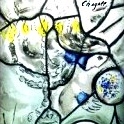
04.03.20 (Nisan 9, 5780) The heart (הלב) is the center of the will - the locus of desire, affection, and love... However, the heart itself must be restrained by wisdom (חוכמה), since unbridled desire is slavery to the lower nature (יצר הרע), as it says: "The righteousness of the upright will deliver them, but the faithless will be ensnared by their own desires" (Prov. 11:6). The problem for many of us is having "disordered loves," that is, serving various idols of the heart that demand our passion yet divert us from what we really need. The difficultly is not so much that we indulge in lesser loves as much as we do not know the love of God that heals us and sets us free. As C.S. Lewis once said, "God cannot give us a happiness and peace apart from Himself, because it is not there. There is no such thing" (Mere Christianity). The righteous have found the most precious secret: "I shall behold your face in righteousness; when I awake, I shall be satisfied with your likeness" (Psalm 17:15).
It has been said that "there is nothing so whole as a broken heart." We become whole when we discover that the idols of our hearts do not truly satisfy us. Usually this involves a "severe mercy" as we learn that what we thought we "needed" proved to be just another illusion... Then and only then can we begin to believe in and to accept God's love as our highest good. Such "perfect love" casts out the fear induced by the idols of the heart. When we seek first the kingdom of God and His righteousness, the passions of our heart are ordered correctly. As it is also written in our Scriptures: "Delight yourself in the LORD, and he will give you the desires of your heart. Commit your way to the LORD; trust also in him, and he will bring it to pass. And He shall bring forth your righteousness as the light, and your judgment as the noonday" (Psalm 37:4-6).
The Lord is near to the shavur lev (שבור לב), the one with a broken heart. The Hebrew word "lev" (לב) metaphorically refers to our inner life, that is, our affections, mind, and will. This is revealed in the letters of the Hebrew word itself: the Lamed (ל) depicts a "staff" used to direct something (i.e., the will), and the Bet (בּ) depicts the "house" of the physical body. Lev then represents our inner life of thought and feeling expressed in our actions. Those who are broken in heart – the nishberei lev – have discovered that they cannot control their own lives, that they are inwardly "shattered," and therefore need divine help. Contrary to conventional wisdom, God helps those who cannot help themselves; He prefers to use broken vessels in His service (Psalm 51:19). As A.W. Tozer also wrote, "Beware of any Christian leader who does not walk with a limp."
Yeshua taught, "Blessed are the pure in heart, for they shall see God" (Matt. 5:8). As I've mentioned before, the Greek word translated "pure" is katharos (καθαρός), sometimes used describe the cleansing of a wound (catharsis), or to describe the unalloyed quality of a substance revealed through refining fire. Metaphorically, then, purity of heart refers to separation from the profane - singleness of vision, wholeheartedness, passion, and focused desire for the sacred. Faith is a great trembling of love: "With this ring I do worship thee..." As we center our affections on Yeshua, we become pure in heart -- i.e., unified, made whole, and healed of our inner fragmentation. We see the Lord both in this world, through his effects, and then panim el panim (פָּנִים אֶל־פָּנִים), "face to face," in the world to come. Our hope purifies us for that coming great day of full disclosure (1 John 3:2-3; Heb. 12:14). That day is surely drawing near, friends.
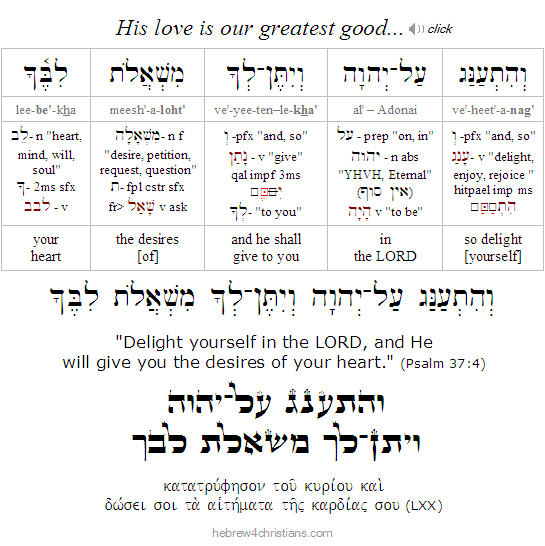 |
"EVERLASTING CREATOR-FATHER,
I have destroyed myself,
my nature is defiled,
the powers of my soul are degraded;
I am vile, miserable, strengthless,
but my hope is in thee.
If ever I am saved it will be by goodness
undeserved and astonishing,
not by mercy alone but by abundant mercy,
not by grace but by exceeding riches of grace;
And such thou hast revealed, promised, exemplified
in thoughts of peace, not of evil.
Thou hast devised means
to rescue me from sin's perdition,
to restore me to happiness, honour, safety.
I bless thee for the everlasting covenant,
for the appointment of a Mediator.
I rejoice that he failed not, nor was discouraged,
but accomplished the work thou gavest him to do;
and said on the cross, 'It is finished.'
I exult in the thought that
thy justice is satisfied,
thy truth established,
thy law magnified,
and a foundation is laid for my hope.
I look to a present and personal interest
in Christ and say,
Surely he has borne my griefs,
carried my sorrows,
won my peace,
healed my soul.
Justified by his blood I am saved by his life,
Glorying in his cross I bow to his sceptre,
Having his Spirit I possess his mind.
Lord, grant that my religion may not be
occasional and partial,
but universal, influential, effective,
and may I always continue in thy words
as well as thy works,
so that I may reach my end in peace."
- The Valley of the Vision (Banner of Truth Trust)
Quick Corona Virus Update...
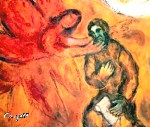
04.03.20 (Nisan 9, 5780) Shalom friends; we love and appreciate you guys; thank you for being here and caring for this ministry, too. Despite the threat of the corona virus, we have been okay, though it has been challenging to concentrate on my writing lately (I am still prayer-searching and struggling to sufficiently quiet my heart). Since we've been homebound for the last few weeks, with the schools canceled, stores and parks closed, etc., the kids have been getting a bit stir crazy, and we also are feeling the pressure. It's a battle just keeping focused at this time, and sometimes it feels like we are living in a (bad) dream... The world seems to have imploded overnight, yet those of discernment understand that things are not often as they seem. There is more than meets the eye here, friends. These are prophetic times, to be sure, and God is in the midst of this whirlwind. We are not to live in dread as those with no hope. Nevertheless we must pray with fervor and ask our Lord for wisdom and grace for such a time as this... Keep the Lord first in your heart and trust that he will protect and guide your ways, chaverim. Chazak - take courage! The time draws near; God will never leave nor forsake you: he loves you and will deliver you from evil... "Do not be anxious about anything, but in everything by prayer and supplication with thanksgiving let your requests be made known to God. And the peace of God that passes all understanding ( ἡ εἰρήνη τοῦ θεοῦ ἡ ὑπερέχουσα πάντα νοῦν) shall guard your hearts and minds in Yeshua the true King of Glory (Phil. 4:6-7). Amen.
 |
God's Overmastering Power...

04.03.20 (Nisan 9, 5780) Though it might sometimes seem that evil has the upper hand in this fallen world, we must remember that the LORD God Almighty is in complete control and works all things together for our good - even overturning the schemes of the wicked for our ultimate benefit. The devil thought he had won a great victory when Yeshua died upon the cross, but God utterly vanquished his evil intent by raising Messiah from the dead and exalting Him as the matchless Ruler over all principalities, powers, and kings of earth (Rev 1:5). Ein od milvado (אין עוד מלבדו) - there is no power apart from God. Everything is in His hands, and He alone is the keyholder of hell and death (Rev. 1:18). "Hallelujah! For the Lord our God, the Almighty One, reigns." Therefore the LORD asks your anxious heart: "Behold, I am the LORD, the God of all flesh. Is anything too difficult for me?"
הִנֵּה אֲנִי יְהוָה אֱלהֵי כָּל־בָּשָׂר
הֲמִמֶּנִּי יִפָּלֵא כָּל־דָּבָר
hee·nei · a·nee · Adonai · E·lo·hey · kol–ba·sar
ha·mee·me'·nee · yee·pa·lei · kol · da·var

"Behold, I am the LORD, the God of all flesh.
Is anything too difficult (or wonderful) for me?"
(Jer. 32:27)
Hebrew Study Card

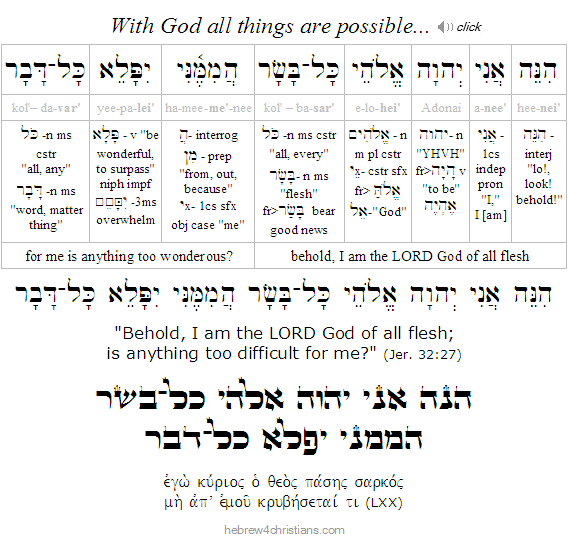
Remembering you in our Prayers...
Shalom dear friends. We are praying fervently that you are staying healthy and free of the corona virus outbreak. God is faithful and will help us overcome, though of course we are instructed to be prudent and to take certain precautions. That said, it is important to understand that God alone is our true healer and deliverer -- and certainly not the governments of the world... Therefore do not heed the voices of fear that resound from those who do not know God, but call upon the LORD for strength, wisdom and discernment for such a time as this. Remind yourself of God's promises and walk in the confidence that nothing can thwart His loving purposes for those who put their trust in Him. Amen.
Our Refuge in all Generations...
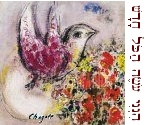
04.03.20 (Nisan 9, 5780) Don't let worry blind you to God's ongoing care; don't live as those without faith. You have a place in your Father's heart; you have a share in his house above. See the Lord as your Dwelling Place "in all generations"; behold his unchanging glory despite the fleeting shadows of this world.
We must first look to the Eternal to rightly see the finite; we must look upward before we look downward. As we contemplate God's Eternality and power, we realize the wonder and sanctity of our short time here. The Eternal is our refuge, our "dwelling place," in all generations, and that means in the present generation as well, on the other side of fleeting appearances of this world. When we pray to God as Avinu She-bashamayim, "Our Father in Heaven," we are calling to the One who (ש) is in the midst of the waters (מים) of Life.
The psalmist says (Psalm 118:17): "I shall not die but live." In order to live you must give yourself to death, but when you have done so, you discover that you are not to die, but live. "Giving yourself to death" means surrendering to God's will, accepting the yoke of heaven, and trusting in His governing "flow" over all of creation. This is the deeper meaning of "baptism" as we are immersed into God's care for us. Yeshua gives us abundant life.
The bloom of every flower is by eternal purpose, and not one common sparrow is forgotten by your Heavenly Father (Luke 12:6). God's irresistible providence comprehends and orders all things, from the realm of the subatomic to the cosmic motions of the heavenly bodies. The Lord is the Center of reality: "All things were created by Him, and for Him, and in Him all things hold together" (Col. 1:16-17). In light of this, Blaise Pascal asked, "What is left for us but to unite our will to that of God himself, to will in him, with him, and for him the thing that he has eternally willed in us and for us." In other words, what else can we do but learn to trust, accept, and to say "yes" to life – even if at times we may feel like strangers in exile... All our days are ordained; recorded in God's scroll. Therefore may God "teach us to number our days to get a heart of wisdom" (Psalm 90:12). So don't lose heart, friend; He who cares for you is a good shepherd, and you shall dwell in the house of the LORD forever.
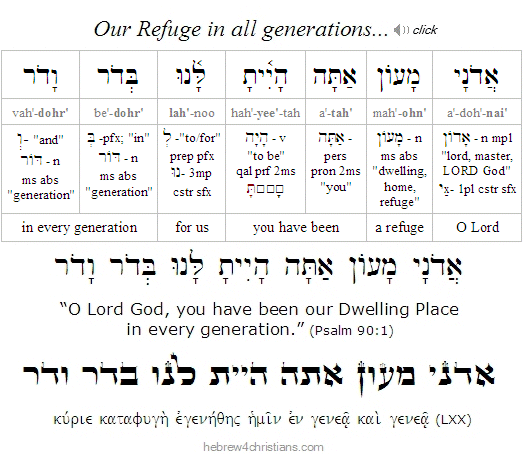 |
 |
"LORD, HIGH AND HOLY, MEEK AND LOWLY,
Thou hast brought me to the valley of vision,
where I live in the depths but see thee in the heights;
hemmed in by mountains of sin I behold thy glory.
Let me learn by paradox
that the way down is the way up,
that to be low is to be high,
that the broken heart is the healed heart,
that the contrite spirit is the rejoicing spirit,
that the repenting soul is the victorious soul,
that to have nothing is to possess all,
that to bear the cross is to wear the crown,
that to give is to receive,
that the valley is the place of vision.
Lord, in the daytime stars can be seen from deepest wells,
and the deeper the wells the brighter thy stars shine;
Let me find thy light in my darkness,
thy life in my death,
thy joy in my sorrow,
thy grace in my sin,
thy riches in my poverty
thy glory in my valley."
- Valley of Vision; collection of Puritan Prayers and Devotions (Banner of Truth)
The Life is in the Blood...

[ The following is related to the holiday of Passover, which begins Wed. April 8th this year... There is no Passover without the blood of the Lamb. ]
04.02.20 (Nisan 8, 5780) The very first time the word "blood" (דָּם) occurs in the Scriptures concerns the death of Abel, the son of Adam and Eve who was murdered by his brother Cain. After Abel's blood was shed, the LORD confronted Cain and said, "What have you done? The voice of your brother's blood (קוֹל דְּמֵי אָחִיךָ) is crying to me from the ground" (Gen. 4:10). Note the Hebrew word for blood here is written in the plural, signifying the loss of Abel's progeny as well. Since blood is the carrier of life, it bears the energy and vitality of life: it has its own spiritual "voice." Likewise, the blood of Yeshua (דְּמֵי יֵשׁוּעַ), the true Lamb of God who died upon the cross, speaks on our behalf, and reverses the power of death by creating a barrier that death can no longer cross, since the death of the sacrificial victim "exchanges" the merit and power of life.
Unlike the blood of Abel that "cries out" for justice, the blood of Yeshua cries out for life and mercy (Heb. 12:24). Putting our trust in the provision of God's sacrifice causes His wrath (or righteous judgment) to pass over while simultaneously extending eternal life and blessing to the sinner.... This is the essential message of the gospel itself, that we have atonement through the sacrificial death, burial, and bodily resurrection of Yeshua our Savior, the great Lamb of God. As Yeshua said, "I tell you the solemn truth, the one who hears my message and believes the One who sent me has eternal life (חַיֵּי עוֹלָם) and will not be condemned, but has passed over (i.e., μετά + βαίνω, lit., "crossed over" [עָבַר]) from death to life" (John 5:24). Just as God's judgment passes over from life to death on my behalf; so His love passes over from death to life on my behalf...
 |
For more on this subject, see "Parashat Bo: The Life is in the Blood."
Find God or Die...

04.01.20 (Nisan 7, 5780) Those who evade the truth about reality – those who willingly suppress the truth and choose to ignore the ultimate existential pathos of the human condition – must "steal" meaning and a sense of value from the heart of faith. "If a human being did not have an eternal consciousness, if underlying everything there was only a wild, fermenting power that writhing in dark passions produced everything, be it significant or insignificant, if a vast, never-appeased emptiness hid beneath everything, what would life be but despair?" (Kierkegaard: Fear and Trembling). The hidden source of anxiety is to be lost to real meaning – to sense the dread of the inevitable and the unknown and to be utterly confounded and devoid of direction in the face of it. The Torah of Yeshua is heeded by the "impoverished of spirit" who know they must "find God or die." It is first a word spoken to the shattered of heart and crushed of spirit. As Augustine said, "You have made us for yourself, O Lord, and our hearts are restless until they rest in you." We all desperately need God, and it is a profound tragedy to be unresponsive to real hope. If you sense the invitation of the Spirit, which moves unseen as the wind, then draw near while there is still time! As it is written: "Seek the LORD while he may be found; call upon him while he is near" (Isa. 55:6).
The Warning of Teshuvah...

04.01.20 (Nisan 7, 5780) Yeshua lamented over Israel: "You did not recognize the time of your visitation..." (Luke 19:44). But how was it possible for otherwise devoutly religious people to miss the advent of the Messiah were it not because they disregarded the signals meant to awaken them? "So also, when you see all these things, you know that he is near, at the very gates" (Matt. 24:33). That's part of the message of teshuvah as well: Repent and believe the message of life (see Heb. 3:7-4:11). Esau "repented" with tears, but his wasn't true repentance since he did not turn his heart to embrace God's love... True repentance leads to healing and life. When the woman from Magdala wept and washed Jesus' feet with her tears, he said to those present, "I tell you, her sins, which are many, are forgiven -- for she loved much" (Luke 7:44-48). In other words, she was lavish in her love because she deeply regretted that she had missed what was most important, what she desperately needed all along... She saw her sin as blindness to God's love... After all, why would she weep over her sins unless she loved him? And how could she love him unless he first revealed his love to her? (1 John 4:19). Friends, the Kingdom of God is at hand: wake up and be ready for the advent of the King! The sound of the shofar reminds us that the great Day of the LORD is drawing near and soon we will see our King Yeshua.
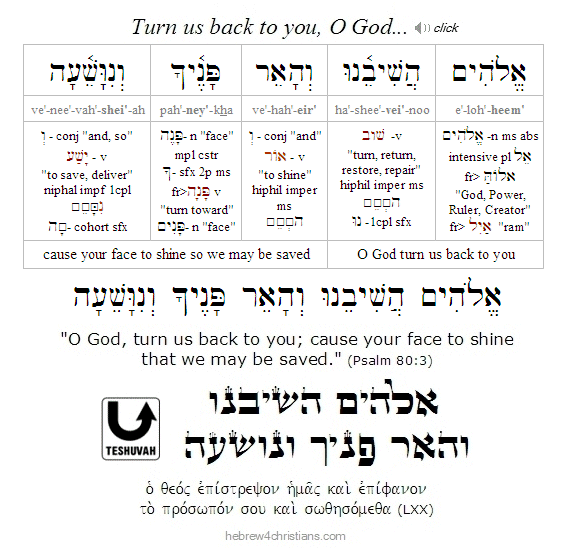 |
The Eternal Now...
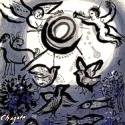
04.01.20 (Nisan 7, 5780) The Mishnah says, shuv yom echad lifnei mi'tatakh: "Repent one day before you die" (Avot 2:10), but who knows the day of one's death in advance? Perhaps your name will be called today, ending your lease on life in this world. Are you ready? Are you prepared to appear before God your Creator and Redeemer? Therefore live each day as if it were your last, making sure you seek the things that really matter... "Watch -- for you know neither the day nor the hour..." (Mark 13:33). As C.S. Lewis wrote: "The Future is, of all things, the thing least like eternity. It is the most temporal part of time -- for the Past is frozen and no longer flows, and the Present is all lit up with eternal rays, the point at which time touches eternity. Of the present moment, and of it only, humans have an experience analogous to the experience which [God] has of reality as a whole; in it alone freedom and actuality are offered them. God would therefore have us continually concerned either with eternity (which means being concerned with Him) or with the Present — either meditating on their eternal union with, or separation from, Himself" (The Screwtape Letters).
Idolatry and Rage...

04.01.20 (Nisan 7, 5780) We are warned not to destroy ourselves by allowing bitterness, anger, or fear to consume our hearts. In the Torah we read: "And you shall not bring an abominable thing (תּוֹעֵבָה) into your house and become devoted to destruction like it" (Deut. 7:26). The sages of the Mishnah said that yielding to rage is equivalent to idol worship and should never be brought into the home. Indeed, rage is linked with avodah zarah - idolatry - because it exalts the ego and claims that the Lord can't (or won't) help you in your moment of testing or need. The Scriptures are clear, however, that "there is no test given to you that you cannot handle with God's help" (1 Cor. 10:13), and we are invited to come boldly before the Divine Presence to find just such help in our time of need (Heb. 4:16). Believing that you can't overcome your fear or anger problem is therefore a form of idolatry. As is written: Lo yiheyeh vekha el zar (לא־יהיה בך אל זר) -- "there shall be no foreign god within you" (Psalm 81:9), which means that we must expressly deny the ego's demand to have its will be done. Being full of a sense of self-importance is to be enslaved to vanity and to have a foreign god "within you." God and human arrogance cannot coexist - since the inner world of the arrogant person denies God's rightful place as King. As it is written in our Scriptures: "The wrath of man (כעס אדם) does not work the righteousness of God" (James 1:20). God will indeed help us if we ask according to his will (1 John 5:14-15). Thank you, God. "Blessed is the LORD who delivers us from self-destruction" (ברוך יהוה מספק אותנו מהרס עצמי).
"Beware that, when fighting monsters, you yourself do not become a monster... for when you gaze long into the abyss, the abyss gazes also into you." - Friedrich Nietzsche
.
|







































































